Double Masters 2022 Release Notes
Compiled by Jess Dunks
Document last modified April 4, 2022
PDF Download Links:
English | 中国话,汉语;中文 | Français | Deutsch | 日本語
The Release Notes include information concerning the release of a new Magic: The Gathering set, as well as a collection of clarifications and rulings involving that set's cards. As future sets are released, updates to the Magic rules may cause some of this information to become outdated. Go to Magic.Wizards.com/Rules to find the most up-to-date rules.
The "General Notes" section includes information about card legality and explains some of the mechanics and concepts in the set.
The "Card-Specific Notes" sections contain answers to the most important, most common, and most confusing questions players might ask about cards in the set. Items in the "Card-Specific Notes" sections include full card text for your reference. Not all cards in the set are listed.
Release Information
The Double Masters 2022 set becomes legal for sanctioned Limited play on its official release date: Friday, July 8, 2022. Reprinted cards in the set are legal for Constructed play in any format that already allows those cards. That is, appearing in these packs doesn't change a card's legality in any format. Notably, many of these cards are not legal in the Standard, Pioneer, or Modern formats. One card, Cryptic Spires, is new to Magic and becomes legal for play in Vintage, Legacy, and Commander on the set's release date.
Go to Magic.Wizards.com/Formats for a complete list of formats and their permitted card sets and banned lists.
Go to Locator.Wizards.com to find an event or store near you.
New Card: Cryptic Spires
The drafting experience in Double Masters 2022 focuses on multicolor decks. In order to help with that, each Draft Booster includes one card named Cryptic Spires that players can draft as they would any other game card in the pack. Cryptic Spires is a land that allows you to pick the two colors of mana it will produce. The best part is that because you choose the colors while creating your deck (after you've finished drafting), you'll know exactly what your deck needs!
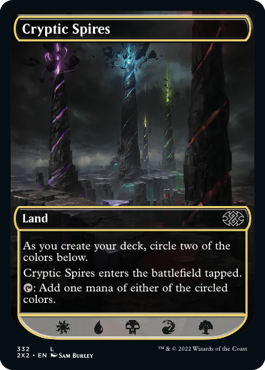
Cryptic Spires
Land
As you create your deck, circle two of the colors below.
Cryptic Spires enters the battlefield tapped.
{T}: Add one mana of either of the circled colors.
[A row of mana symbols: {W}{U}{B}{R}{G}]
- Many Double Masters 2022 limited decks will include multiple copies of Cryptic Spires. You can choose the same two colors for each of them, or you can make different choices for different cards.
- You circle two colors as you put Cryptic Spires into your deck before any games begin. Which colors are circled must be clear and understandable to all players.
- Once a Cryptic Spires has two colors circled, those colors are considered to be printed on the card.
- The circled colors only affect what colors of mana the last ability produces as it resolves. They do not make Cryptic Spires those colors. It is still colorless.
- The circled colors are part of the copiable characteristics of the card. If another permanent becomes a copy of Cryptic Spires, its mana ability will produce the same colors as the permanent that was copied.
- The mana ability is linked to the colors circled on the card. If a permanent somehow gains that mana ability without becoming a copy of Cryptic Spires, the ability it gained won't produce any mana as it resolves.
Returning Mechanics
Over twenty keyword abilities, keyword actions, ability words, and unnamed mechanics return in the Double Masters 2022 set. Some cards with these mechanics have individual notes in the "Card-Specific Notes" section as appropriate. The rules for these mechanics are unchanged in this release.
In this section, you will find notes for some of the mechanics with the most appearances and greatest complexity.
Keyword Ability: Cascade
Spells with the cascade keyword are just overflowing with magical energy. Who knows what that energy will turn into? Whatever it is, you'll get two spells for the cost of one.
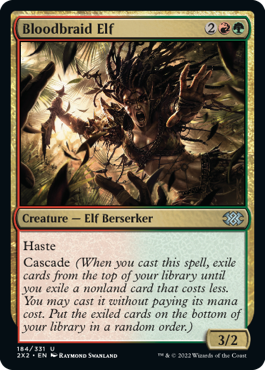
Bloodbraid Elf
{2}{R}{G}
Creature — Elf Berserker
3/2
Haste
Cascade (When you cast this spell, exile cards from the top of your library until you exile a nonland card that costs less. You may cast it without paying its mana cost. Put the exiled cards on the bottom of your library in a random order.)
- A spell's mana value is determined only by its mana cost. Ignore any alternative costs, additional costs, cost increases, or cost reductions.
- Cascade triggers when you cast the spell, meaning that it resolves before that spell. If you end up casting the exiled card, it will go on the stack on top of the spell with cascade. The new spell will resolve before the spell with cascade.
- When the cascade ability resolves, you must exile cards. The only optional part of the ability is whether or not you cast the last card exiled.
- If a spell with cascade is countered, the cascade ability will still resolve normally.
- You exile the cards face up. All players will be able to see them.
- If you cast a card "without paying its mana cost," you can't choose to cast it for any alternative costs. You can, however, pay additional costs. If the card has any mandatory additional costs, you must pay those to cast the card.
- If the card has {X} in its mana cost, you must choose 0 as the value of X when casting it without paying its mana cost.
- Due to a 2021 rules change to cascade, not only do you stop exiling cards if you exile a nonland card with lesser mana value than the spell with cascade, but the resulting spell you cast must also have lesser mana value. Previously, in cases where a card's mana value differed from the resulting spell, such as with some modal double-faced cards or cards with an Adventure, you could cast a spell with a higher mana value than the exiled card.
Keyword Ability: Exalted
Creatures with the exalted keyword empower a creature that is brave enough to attack alone.
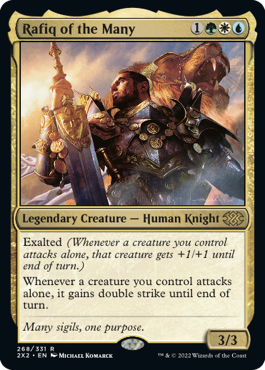
Rafiq of the Many
{1}{G}{W}{U}
Legendary Creature — Human Knight
3/3
Exalted (Whenever a creature you control attacks alone, that creature gets +1/+1 until end of turn.)
Whenever a creature you control attacks alone, it gains double strike until end of turn.
- If you declare exactly one creature as an attacker, each exalted ability on each permanent you control (including, perhaps, the attacking creature itself) will trigger. The bonuses are given to the attacking creature, not to the permanent with exalted. Ultimately, the attacking creature will wind up with +1/+1 for each of your exalted abilities.
- If you attack with multiple creatures, but then all but one are removed from combat, your exalted abilities won't trigger.
- You must attack with exactly one creature for exalted abilities to trigger. Exalted abilities won't trigger if you attack a player with one creature and a planeswalker with another, for example, or if you attack with two creatures but one is removed from combat.
- Some effects put creatures onto the battlefield attacking. Since those creatures were never declared as attackers, they're ignored by exalted abilities. They won't cause exalted abilities to trigger. If any exalted abilities have already triggered (because exactly one creature was declared as an attacker), those abilities will resolve as normal even though there may now be multiple attackers.
- In a Two-Headed Giant game, a creature "attacks alone" if it's the only creature declared as an attacker by your entire team. If you control that attacking creature, your exalted abilities will trigger but your teammate's exalted abilities won't.
Keyword Ability: Flashback
Flashback is a returning mechanic that gives instants and sorcery cards a second chance to have an impact.
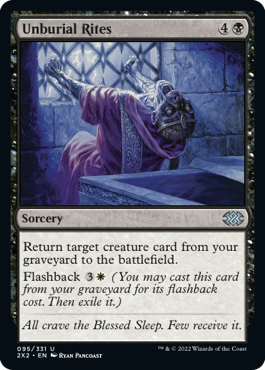
Unburial Rites
{4}{B}
Sorcery
Return target creature card from your graveyard to the battlefield.
Flashback {3}{W} (You may cast this card from your graveyard for its flashback cost. Then exile it.)
- "Flashback [cost]" means "You may cast this card from your graveyard by paying [cost] rather than paying its mana cost" and "If the flashback cost was paid, exile this card instead of putting it anywhere else any time it would leave the stack."
- You must still follow any timing restrictions and permissions, including those based on the card's type. For instance, you can cast a sorcery using flashback only when you could normally cast a sorcery.
- To determine the total cost of a spell, start with the mana cost or alternative cost (such as a flashback cost) you're paying, add any cost increases, then apply any cost reductions. The mana value of the spell is determined only by its mana cost, no matter what the total cost to cast the spell was.
- A spell cast using flashback will always be exiled afterward, whether it resolves, is countered, or leaves the stack in some other way.
- You can cast a spell using flashback even if it was somehow put into your graveyard without having been cast.
- If a card with flashback is put into your graveyard during your turn, you can cast it if it's legal to do so before any other player can take any actions.
Keyword Ability: Outlast
First featured in the Khans of Tarkir set, the outlast keyword lets some creatures take time preparing to be even better at combat later.
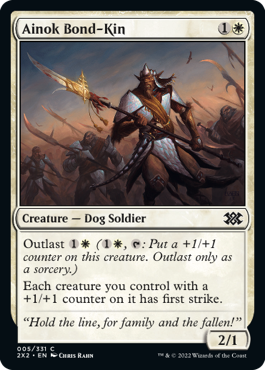
Ainok Bond-Kin
{1}{W}
Creature — Dog Soldier
2/1
Outlast {1}{W} ({1}{W}, {T}: Put a +1/+1 counter on this creature. Outlast only as a sorcery.)
Each creature you control with a +1/+1 counter on it has first strike.
- The cost to activate a creature's outlast ability includes the tap symbol ({T}). A creature's outlast ability can't be activated unless that creature has been under your control continuously since the beginning of your turn.
- Several creatures with outlast also grant an ability to creatures you control with +1/+1 counters on them, including themselves. These counters could come from an outlast ability, but any +1/+1 counter on the creature will count.
Keyword Ability: Prowess
Creatures with prowess get +1/+1 for the rest of the turn whenever you cast a noncreature spell.
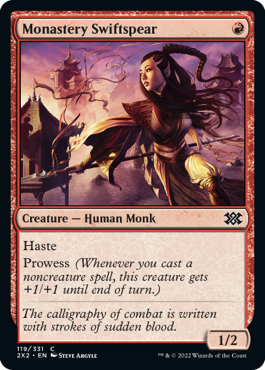
Monastery Swiftspear
{R}
Creature — Human Monk
1/2
Haste
Prowess (Whenever you cast a noncreature spell, this creature gets +1/+1 until end of turn.)
- Any spell you cast that doesn't have the type creature will cause prowess to trigger. If a spell has multiple types, and one of those types is creature (such as an artifact creature), casting it won't cause prowess to trigger. Playing a land also won't cause prowess to trigger.
- Prowess triggers only once for any spell, even if that spell has multiple types.
- Prowess goes on the stack on top of the spell that caused it to trigger. It will resolve before that spell.
- Once it triggers, prowess isn't connected to the spell that caused it to trigger. If that spell is countered, prowess will still resolve.
Ability Word: Heroic
Heroic is an ability word that appears in italics at the beginning of abilities that trigger whenever you cast a spell that targets the creature with the heroic ability. (Ability words have no rules meaning.)
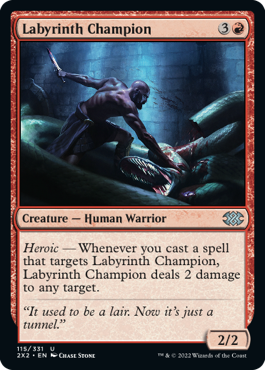
Labyrinth Champion
{3}{R}
Creature — Human Warrior
2/2
Heroic — Whenever you cast a spell that targets Labyrinth Champion, Labyrinth Champion deals 2 damage to any target.
- Heroic abilities will resolve before the spell that caused them to trigger.
- Heroic abilities will trigger only once per spell, even if that spell targets the creature with the heroic ability multiple times.
- Heroic abilities won't trigger when a copy of a spell is created on the stack or when a spell's targets are changed to include a creature with a heroic ability.
Keyword Ability: Unearth
Unearth is a mechanic that lets you bring your creatures back from the graveyard for a turn and attack with them. A permanent brought back this way is exiled at the end of the turn or if it would leave the battlefield in any other way.
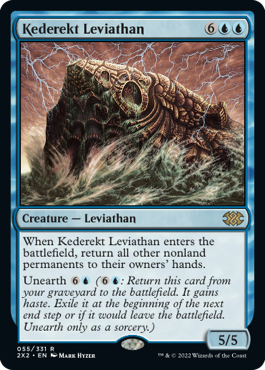
Kederekt Leviathan
{6}{U}{U}
Creature — Leviathan
5/5
When Kederekt Leviathan enters the battlefield, return all other nonland permanents to their owners' hands.
Unearth {6}{U} ({6}{U}: Return this card from your graveyard to the battlefield. It gains haste. Exile it at the beginning of the next end step or if it would leave the battlefield. Unearth only as a sorcery.)
- If you activate a card's unearth ability but that card is removed from your graveyard before the ability resolves, that unearth ability will resolve and do nothing.
- Activating a creature card's unearth ability isn't the same as casting the creature card. The unearth ability is put on the stack, but the creature card is not. Spells and abilities that interact with activated abilities (such as Stifle) will interact with unearth, but spells and abilities that interact with spells (such as Remove Soul) will not.
- At the beginning of the end step, a creature returned to the battlefield with unearth is exiled. This is a delayed triggered ability, and it can be countered by effects such as Stifle or Voidslime that counter triggered abilities. If the ability is countered, the creature will stay on the battlefield and the delayed trigger won't trigger again. However, the replacement effect will still exile the creature when it eventually leaves the battlefield.
- Unearth grants haste to the creature that's returned to the battlefield. However, neither of the "exile" abilities is granted to that creature. If that creature loses all its abilities, it will still be exiled at the beginning of the end step, and if it would leave the battlefield, it is still exiled instead.
- If a creature returned to the battlefield with unearth would leave the battlefield for any reason, it's exiled instead—unless the spell or ability that's causing the creature to leave the battlefield is actually trying to exile it! In that case, it succeeds at exiling it. If an effect later returns the creature card to the battlefield (as Oblivion Ring or Flickerwisp might, for example), the creature card will return to the battlefield as a new object with no relation to its previous existence. The unearth effect will no longer apply to it.
Land Cycle: Bounce Lands
Double Masters 2022 has a returning cycle of dual lands commonly referred to as "bounce lands." These lands make two mana rather than only one, but force you to return one of your lands to your hand when they enter the battlefield.
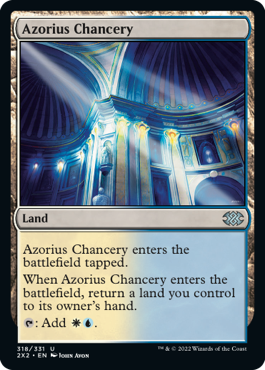
Azorius Chancery
Land
Azorius Chancery enters the battlefield tapped.
When Azorius Chancery enters the battlefield, return a land you control to its owner's hand.
{T}: Add {W}{U}.
- If this land enters the battlefield and you control no other lands, its ability will force you to return it to your hand.
- You don't choose which land you are going to return to your hand until the triggered ability resolves.
DOUBLE MASTERS 2022 CARD-SPECIFIC NOTES
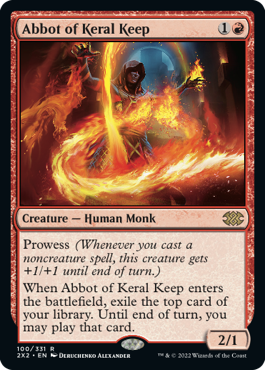
Abbot of Keral Keep
{1}{R}
Creature — Human Monk
2/1
Prowess (Whenever you cast a noncreature spell, this creature gets +1/+1 until end of turn.)
When Abbot of Keral Keep enters the battlefield, exile the top card of your library. Until end of turn, you may play that card.
- The card exiled by Abbot of Keral Keep's ability is exiled face up.
- You may play that card that turn even if Abbot of Keral Keep is no longer on the battlefield or under your control.
- Playing the card exiled with Abbot of Keral Keep's ability follows the normal rules for playing that card. You must pay its costs, and you must follow all applicable timing rules. For example, if the card is a creature card, you can cast that card by paying its mana cost only during your main phase while the stack is empty.
- Unless an effect allows you to play additional lands that turn, you can play a land card exiled with Abbot of Keral Keep's ability only if you haven't played a land yet that turn.
- If you don't play the card, it will remain exiled.
- See also "Returning Keyword Ability: Prowess" in the General Notes section.
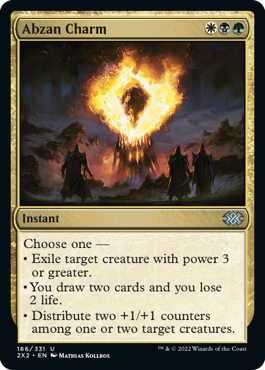
Abzan Charm
{W}{B}{G}
Instant
Choose one —
• Exile target creature with power 3 or greater.
• You draw two cards and you lose 2 life.
• Distribute two +1/+1 counters among one or two target creatures.
- If you choose the third mode, you choose how the counters will be distributed as you cast the spell. Notably, if you choose to put one +1/+1 counter on each of two target creatures, and one of those creatures becomes an illegal target in response, the +1/+1 counter that would have been put on that creature is lost. It can't be put on the remaining legal target.
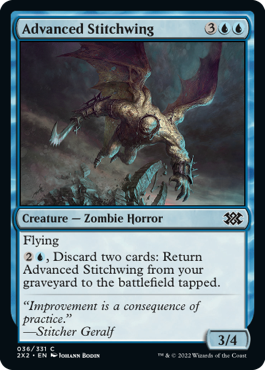
Advanced Stitchwing
{3}{U}{U}
Creature — Zombie Horror
3/4
Flying
{2}{U}, Discard two cards: Return Advanced Stitchwing from your graveyard to the battlefield tapped.
- Advanced Stitchwing's last ability can only be activated while it's in your graveyard.
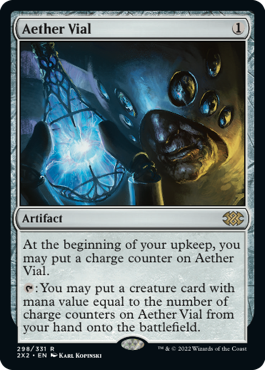
Aether Vial
{1}
Artifact
At the beginning of your upkeep, you may put a charge counter on Aether Vial.
{T}: You may put a creature card with mana value equal to the number of charge counters on Aether Vial from your hand onto the battlefield.
- If Aether Vial leaves the battlefield while its second ability is on the stack, use its last known number of charge counters to determine what you may put from your hand onto the battlefield.
- If a card in a player's hand has {X} in its mana cost, X is considered to be 0.
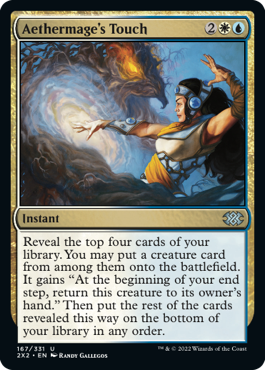
Aethermage's Touch
{2}{W}{U}
Instant
Reveal the top four cards of your library. You may put a creature card from among them onto the battlefield. It gains "At the beginning of your end step, return this creature to its owner's hand." Then put the rest of the cards revealed this way on the bottom of your library in any order.
- If you don't reveal any creature cards, or if you choose not to put a revealed creature card onto the battlefield, all the revealed cards go on the bottom of your library.
- If the creature that you put onto the battlefield leaves the battlefield before your next end step, it won't be returned to your hand at the beginning of your end step.
- If you put a creature onto the battlefield this way during your end step, it won't be returned to your hand until your next end step.
- The triggered ability that the creature gains won't be copied if an effect creates a token that's a copy of that creature or causes another object to become a copy of that creature.
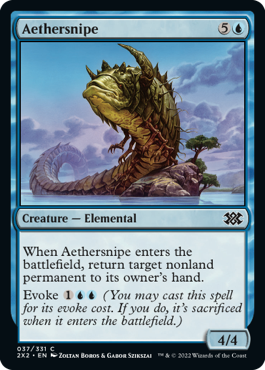
Aethersnipe
{5}{U}
Creature — Elemental
4/4
When Aethersnipe enters the battlefield, return target nonland permanent to its owner's hand.
Evoke {1}{U}{U} (You may cast this spell for its evoke cost. If you do, it's sacrificed when it enters the battlefield.)
- If you cast this card for its evoke cost, you may put the sacrifice trigger and the regular enters-the-battlefield trigger on the stack in either order. The one put on the stack last will resolve first.
- Aethersnipe can be the target of its own ability. If it's the only nonland permanent on the battlefield, it must be the target of its ability.
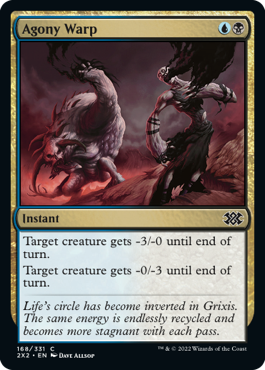
Agony Warp
{U}{B}
Instant
Target creature gets -3/-0 until end of turn.
Target creature gets -0/-3 until end of turn.
- The two targets may be the same creature or they may be different creatures.
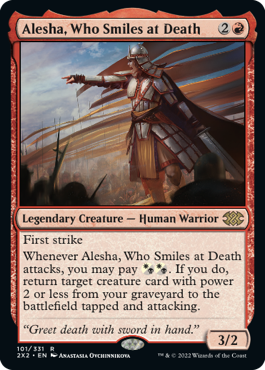
Alesha, Who Smiles at Death
{2}{R}
Legendary Creature — Human Warrior
3/2
First strike
Whenever Alesha, Who Smiles at Death attacks, you may pay {W/B}{W/B}. If you do, return target creature card with power 2 or less from your graveyard to the battlefield tapped and attacking.
- While resolving Alesha's triggered ability, you can't pay the cost multiple times to return more than one creature card.
- Alesha's triggered ability checks the card's power only in your graveyard. The creature will still be tapped and attacking if its power is greater than 2 after it's on the battlefield.
- You choose which player or planeswalker the returned creature is attacking. It doesn't have to be attacking the same player or planeswalker Alesha is attacking.
- Although the returned creature is an attacking creature, it was never declared as an attacking creature. This means that abilities that trigger whenever a creature attacks won't trigger when it enters the battlefield attacking.
- Any effects that say that the returned creature can't attack (such as that of Propaganda, or if the creature has defender) affect only the declaration of attackers. They won't stop the returned creature from entering the battlefield attacking.
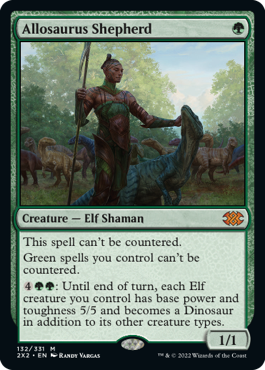
Allosaurus Shepherd
{G}
Creature — Elf Shaman
1/1
This spell can't be countered.
Green spells you control can't be countered.
{4}{G}{G}: Until end of turn, each Elf creature you control has base power and toughness 5/5 and becomes a Dinosaur in addition to its other creature types.
- A spell or ability that counters spells can still target spells that can't be countered. When that spell or ability resolves, the uncounterable spell won't be countered, but any additional effects of the countering spell or ability will still happen.
- Allosaurus Shepherd's last ability overwrites all previous effects that set the affected creatures' power and/or toughness to specific values. Other effects that set these characteristics to specific values that start to apply after the ability resolves will overwrite that part of the effect.
- Effects that modify an affected creature's power or toughness without setting it will apply no matter when they started to take effect. The same is true for counters that change the creature's power or toughness.
- The affected creatures don't lose any abilities when they become Dinosaurs.
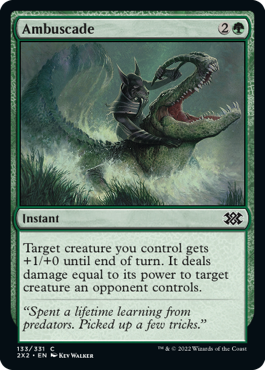
Ambuscade
{2}{G}
Instant
Target creature you control gets +1/+0 until end of turn. It deals damage equal to its power to target creature an opponent controls.
- If the creature you control leaves the battlefield before Ambuscade resolves, Ambuscade has no effect and no damage is dealt. If the creature an opponent controls leaves the battlefield instead, the creature you control gets +1/+0 even though it won't deal any damage.
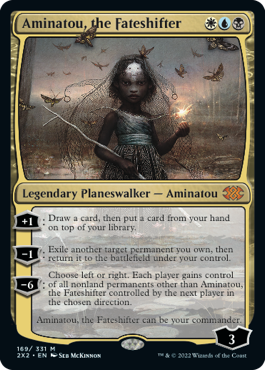
Aminatou, the Fateshifter
{W}{U}{B}
Legendary Planeswalker — Aminatou
3
+1: Draw a card, then put a card from your hand on top of your library.
−1: Exile another target permanent you own, then return it to the battlefield under your control.
−6: Choose left or right. Each player gains control of all nonland permanents other than Aminatou, the Fateshifter controlled by the next player in the chosen direction.
Aminatou, the Fateshifter can be your commander.
- You draw a card and put one back all while Aminatou's first ability is resolving. Nothing can happen between the two, and no player may choose to take actions.
- Aminatou's second ability can target any permanent you own, including one another player controls.
- Once the exiled permanent returns, it's considered a new object with no relation to the object that it was. Auras attached to the exiled permanent will be put into their owners' graveyards. Equipment attached to the exiled permanent will become unattached and remain on the battlefield. Any counters on the exiled permanent will cease to exist.
- If a token is exiled this way, it will cease to exist and won't return to the battlefield.
- As Aminatou's third ability resolves, you choose a direction, then each player takes control of their new permanents at the same time.
- The effect of Aminatou's third ability lasts indefinitely. It continues to apply after Aminatou (or her controller) leaves the game.
- In a two-player game, each player gains control of each nonland permanent the other controls (aside from Aminatou) no matter which direction you choose.
- In a multiplayer game, if a player leaves the game, all cards that player owns leave as well. The effect of Aminatou's third ability stops applying to all permanents that player controlled and control of them reverts to their previous controller.
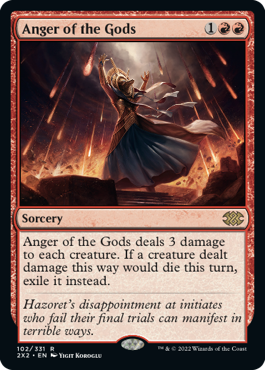
Anger of the Gods
{1}{R}{R}
Sorcery
Anger of the Gods deals 3 damage to each creature. If a creature dealt damage this way would die this turn, exile it instead.
- Creatures don't necessarily have to be dealt lethal damage by Anger of the Gods to be exiled. After being dealt damage, if they would die for any reason that turn, they'll be exiled instead.
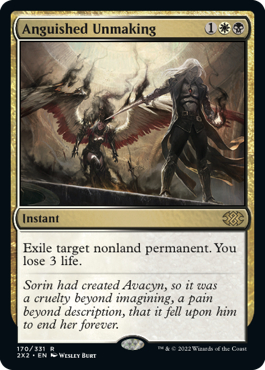
Anguished Unmaking
{1}{W}{B}
Instant
Exile target nonland permanent. You lose 3 life.
- If the nonland permanent becomes an illegal target, Anguished Unmaking doesn't resolve. You won't lose 3 life.
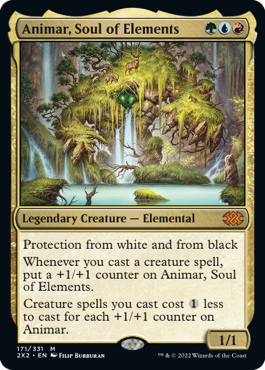
Animar, Soul of Elements
{G}{U}{R}
Legendary Creature — Elemental
1/1
Protection from white and from black
Whenever you cast a creature spell, put a +1/+1 counter on Animar, Soul of Elements.
Creature spells you cast cost {1} less to cast for each +1/+1 counter on Animar.
- Animar's triggered ability triggers only when a creature spell is cast, after costs are paid. The counter put on Animar for a creature spell won't affect the cost of that creature spell, only future ones.
- Animar's triggered ability resolves before the creature spell that causes it to trigger. The ability will resolve even if that spell is countered.
- To determine the total cost of a creature spell, start with the mana cost or alternative cost you're paying, add any cost increases, then apply any cost reductions. The mana value of the creature remains unchanged, no matter what the total cost to cast it was.
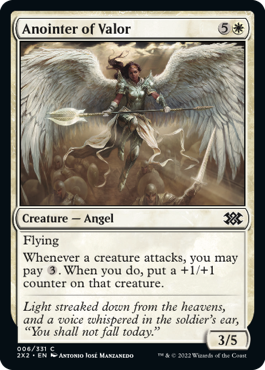
Anointer of Valor
{5}{W}
Creature — Angel
3/5
Flying
Whenever a creature attacks, you may pay {3}. When you do, put a +1/+1 counter on that creature.
- Anointer of Valor's triggered ability triggers when any creature attacks any player or planeswalker.
- If you choose to pay {3}, a second triggered ability triggers. Players may respond to that reflexive triggered ability before the +1/+1 counter is put on the creature.
- You can't pay {3} more than once to put more than one +1/+1 counter on the attacking creature.
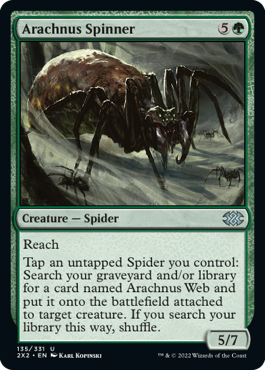
Arachnus Spinner
{5}{G}
Creature — Spider
5/7
Reach
Tap an untapped Spider you control: Search your graveyard and/or library for a card named Arachnus Web and put it onto the battlefield attached to target creature. If you search your library this way, shuffle.
- You can tap any untapped Spider you control, including one you haven't controlled continuously since the beginning of your most recent turn, to pay the cost of Arachnus Spinner's activated ability. You can even tap Arachnus Spinner itself to pay this cost.
- If you choose to search your library this way, you don't have to find a card named Arachnus Web, even if one is there. You'll still shuffle your library after searching it.
- You may search both your graveyard and your library, but you can find a maximum of one card named Arachnus Web.
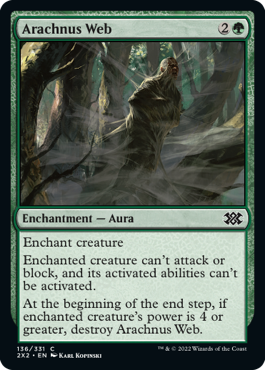
Arachnus Web
{2}{G}
Enchantment — Aura
Enchant creature
Enchanted creature can't attack or block, and its activated abilities can't be activated.
At the beginning of the end step, if enchanted creature's power is 4 or greater, destroy Arachnus Web.
- Arachnus Web's triggered ability checks at the beginning of each end step, not just yours.
- If the enchanted creature's power isn't 4 or greater when the end step begins, the last ability won't trigger at all.
- If Arachnus Web's last ability triggers, but the enchanted creature's power is reduced to 3 or less before the ability resolves, the ability will have no effect. Arachnus Web won't be destroyed.
- If Arachnus Web enters the battlefield attached to an attacking or blocking creature (due to Arachnus Spinner's ability, for example), that creature will continue to attack or block.
- Triggered abilities (starting with "when," "whenever," or "at") are unaffected.
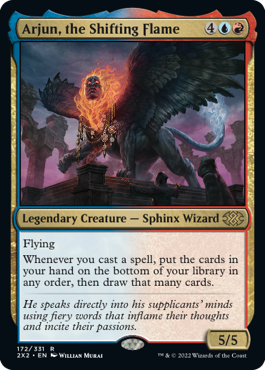
Arjun, the Shifting Flame
{4}{U}{R}
Legendary Creature — Sphinx Wizard
5/5
Flying
Whenever you cast a spell, put the cards in your hand on the bottom of your library in any order, then draw that many cards.
- Arjun's triggered ability will resolve before the spell that caused it to trigger.
- After Arjun's ability triggers, players may cast instants and activate activated abilities. Each time you cast an instant spell "in response," Arjun's ability triggers again.
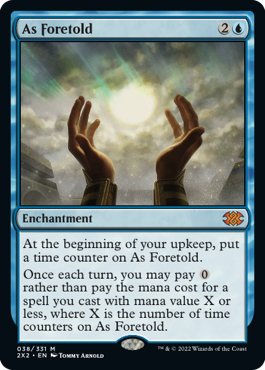
As Foretold
{2}{U}
Enchantment
At the beginning of your upkeep, put a time counter on As Foretold.
Once each turn, you may pay {0} rather than pay the mana cost for a spell you cast with mana value X or less, where X is the number of time counters on As Foretold.
- If you cast a card for an alternative cost of {0}, you can't pay any other alternative costs, such as evoke costs. You can, however, pay additional costs. If the card has any mandatory additional costs, such as that of Tormenting Voice, you must pay those to cast the card.
- A card's mana value is determined solely by the mana symbols printed in its upper right corner. The mana value is the total amount of mana in that cost, regardless of color. For example, a card with mana cost {1}{U}{U} has mana value 3. Ignore any alternative costs, additional costs, cost increases, or cost reductions that could apply to it. A card with no mana cost has a mana value of 0.
- If a spell has no mana cost, its mana value is 0. You can cast it with As Foretold's alternative cost.
- If the spell you cast this way has {X} in its mana cost, you must choose 0 as the value of X when casting it.
- If you control multiple As Foretolds, you may cast one spell for each of them paying {0}.
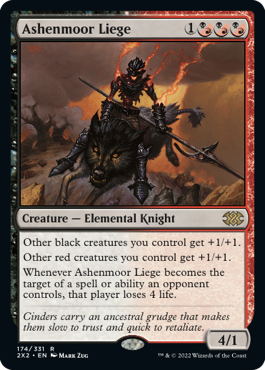
Ashenmoor Liege
{1}{B/R}{B/R}{B/R}
Creature — Elemental Knight
4/1
Other black creatures you control get +1/+1.
Other red creatures you control get +1/+1.
Whenever Ashenmoor Liege becomes the target of a spell or ability an opponent controls, that player loses 4 life.
- The first two abilities are separate and cumulative. If another creature you control is both of the listed colors, it will get a total of +2/+2.
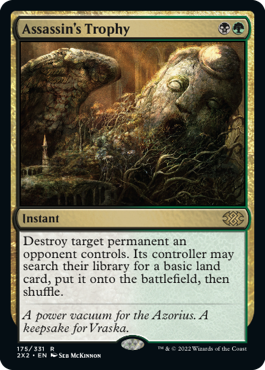
Assassin's Trophy
{B}{G}
Instant
Destroy target permanent an opponent controls. Its controller may search their library for a basic land card, put it onto the battlefield, then shuffle.
- If the target permanent is an illegal target by the time Assassin's Trophy tries to resolve, the spell doesn't resolve. No player searches their library.
- If the target permanent is a legal target but isn't destroyed, most likely because it has indestructible, its controller may search their library.
- If the permanent's controller doesn't search their library, they don't shuffle their library.
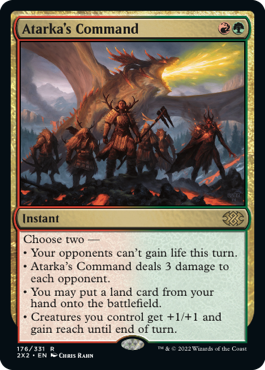
Atarka's Command
{R}{G}
Instant
Choose two —
• Your opponents can't gain life this turn.
• Atarka's Command deals 3 damage to each opponent.
• You may put a land card from your hand onto the battlefield.
• Creatures you control get +1/+1 and gain reach until end of turn.
- The first mode won't affect life that was gained earlier in the turn.
- If you choose the third mode and put a land card onto the battlefield, that doesn't count as playing a land. For example, you can both play a land and put a land onto the battlefield this way during your turn.
- You choose the two modes as you cast the spell. You must choose two different modes. Once modes are chosen, they can't be changed.
- If a Command is copied, the effect that creates the copy will usually allow you to choose new targets for the copy, but you can't choose new modes.
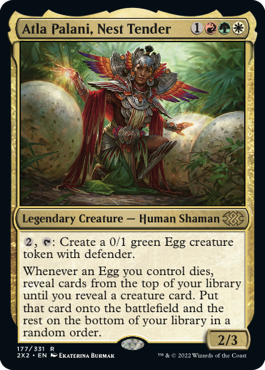
Atla Palani, Nest Tender
{1}{R}{G}{W}
Legendary Creature — Human Shaman
2/3
{2}, {T}: Create a 0/1 green Egg creature token with defender.
Whenever an Egg you control dies, reveal cards from the top of your library until you reveal a creature card. Put that card onto the battlefield and the rest on the bottom of your library in a random order.
- If Atla Palani dies at the same time as one or more Eggs you control, its last ability triggers for each of those Eggs.
- If there are no creature cards in your library as Atla Palani's last ability resolves, you reveal your library then put it back in a random order.
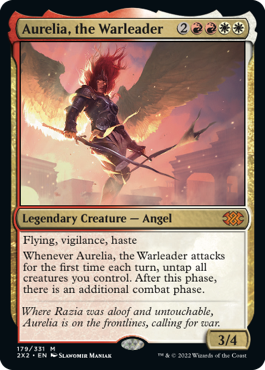
Aurelia, the Warleader
{2}{R}{R}{W}{W}
Legendary Creature — Angel
3/4
Flying, vigilance, haste
Whenever Aurelia, the Warleader attacks for the first time each turn, untap all creatures you control. After this phase, there is an additional combat phase.
- You untap all creatures you control, including ones that aren't attacking.
- You don't have to attack with any creatures during the additional combat phase.
- If Aurelia is put onto the battlefield attacking, the triggered ability won't trigger.
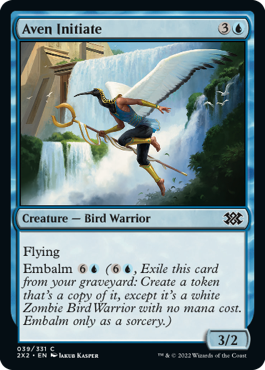
Aven Initiate
{3}{U}
Creature — Bird Warrior
3/2
Flying
Embalm {6}{U} ({6}{U}, Exile this card from your graveyard: Create a token that's a copy of it, except it's a white Zombie Bird Warrior with no mana cost. Embalm only as a sorcery.)
- The token copies exactly what was printed on the original card and nothing else. It doesn't copy any information about the object the card was before it was put into your graveyard.
- The token is a Zombie in addition to its other types and is white instead of its other colors. It has no mana cost, and thus its mana value is 0. These are copiable values of the token that other effects may copy.
- If a spell or ability puts a creature card with embalm into your graveyard during your main phase, you'll have priority immediately after that spell or ability resolves. You can activate the creature card's embalm ability before any player can exile it with an effect, if it's legal for you to do so.
- Once you've activated an embalm ability, the card is immediately exiled. Opponents can't try to stop the ability by exiling the card.
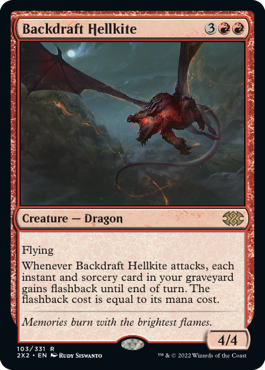
Backdraft Hellkite
{3}{R}{R}
Creature — Dragon
4/4
Flying
Whenever Backdraft Hellkite attacks, each instant and sorcery card in your graveyard gains flashback until end of turn. The flashback cost is equal to its mana cost.
- Only instant and sorcery cards in your graveyard when Backdraft Hellkite's triggered ability resolves will gain flashback. Instant and sorcery cards that are put into your graveyard later in the turn won't gain flashback.
- Once Backdraft Hellkite has attacked, its ability will resolve and grant the appropriate cards flashback even if Backdraft Hellkite leaves the battlefield before the ability resolves or after it resolves but before you cast the spells.
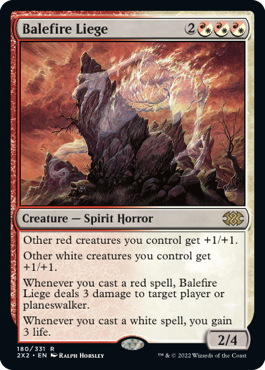
Balefire Liege
{2}{R/W}{R/W}{R/W}
Creature — Spirit Horror
2/4
Other red creatures you control get +1/+1.
Other white creatures you control get +1/+1.
Whenever you cast a red spell, Balefire Liege deals 3 damage to target player or planeswalker.
Whenever you cast a white spell, you gain 3 life.
- The first two abilities are separate and cumulative. If another creature you control is both of the listed colors, it will get a total of +2/+2.
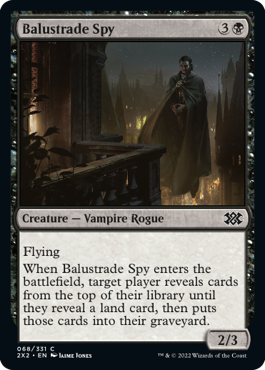
Balustrade Spy
{3}{B}
Creature — Vampire Rogue
2/3
Flying
When Balustrade Spy enters the battlefield, target player reveals cards from the top of their library until they reveal a land card, then puts those cards into their graveyard.
- If the target player has no land cards in their library, all cards from that library will be revealed and put into their graveyard.
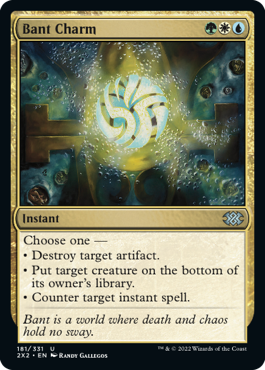
Bant Charm
{G}{W}{U}
Instant
Choose one —
• Destroy target artifact.
• Put target creature on the bottom of its owner's library.
• Counter target instant spell.
- You can choose a mode only if you can choose legal targets for that mode. If you can't choose legal targets for any of the modes, you can't cast the spell.
- While the spell is on the stack, treat it as though its only text is the chosen mode. The other two modes are treated as though they don't exist. You don't choose targets for those modes.
- If this spell is copied, the copy will have the same mode as the original.
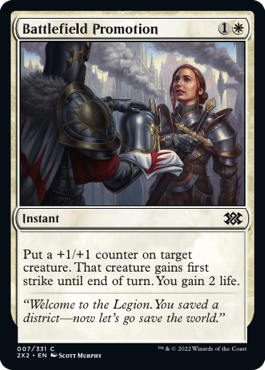
Battlefield Promotion
{1}{W}
Instant
Put a +1/+1 counter on target creature. That creature gains first strike until end of turn. You gain 2 life.
- If the target creature is an illegal target by the time Battlefield Promotion tries to resolve, the spell doesn't resolve. You don't gain 2 life.
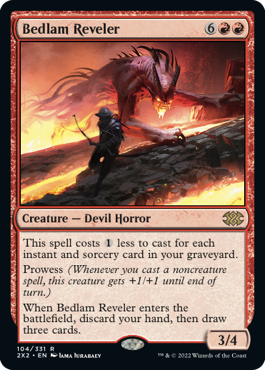
Bedlam Reveler
{6}{R}{R}
Creature — Devil Horror
3/4
This spell costs {1} less to cast for each instant and sorcery card in your graveyard.
Prowess (Whenever you cast a noncreature spell, this creature gets +1/+1 until end of turn.)
When Bedlam Reveler enters the battlefield, discard your hand, then draw three cards.
- To determine the total cost of a spell, start with the mana cost or alternative cost you're paying, add any cost increases, then apply any cost reductions (such as that of Bedlam Reveler). The mana value of the spell is determined by only its mana cost, no matter what the total cost to cast that spell was.
- Bedlam Reveler's first ability can't reduce the {R}{R} in its cost.
- If you have no cards in hand when Bedlam Reveler enters the battlefield, you just draw three cards.
- See also "Returning Keyword Ability: Prowess" in the General Notes section.
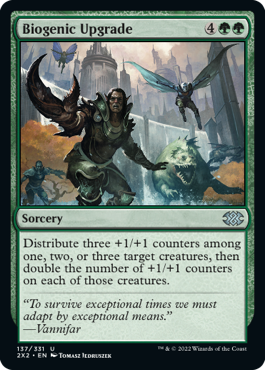
Biogenic Upgrade
{4}{G}{G}
Sorcery
Distribute three +1/+1 counters among one, two, or three target creatures, then double the number of +1/+1 counters on each of those creatures.
- You choose how many targets Biogenic Upgrade has and how the counters are distributed as you cast it. Each target must receive at least one counter.
- If some of the creatures are illegal targets as Biogenic Upgrade tries to resolve, the original distribution of counters still applies and the counters that would have been put on the illegal targets are lost. They won't be put instead on a legal target.
- To double the number of +1/+1 counters on a permanent, put a number of +1/+1 counters on it equal to the number it already has. Other cards that interact with putting counters on it will interact with this effect accordingly.
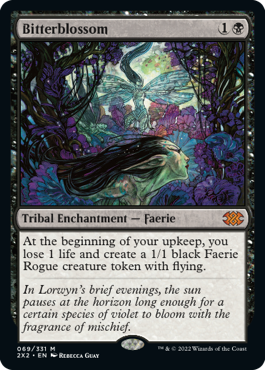
Bitterblossom
{1}{B}
Tribal Enchantment — Faerie
At the beginning of your upkeep, you lose 1 life and create a 1/1 black Faerie Rogue creature token with flying.
- The effect is mandatory. You'll lose 1 life even if you have only 1 life left.
- The life loss isn't a payment. You'll get a token even if you had 0 life (and another effect is stopping you from losing the game).
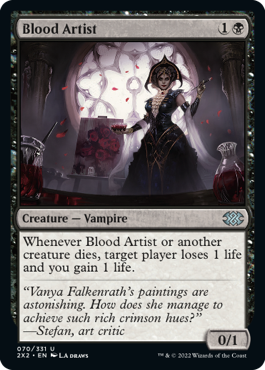
Blood Artist
{1}{B}
Creature — Vampire
0/1
Whenever Blood Artist or another creature dies, target player loses 1 life and you gain 1 life.
- If Blood Artist and one or more other creatures die at the same time, its ability will trigger for each of those creatures.
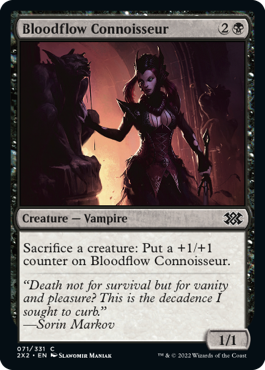
Bloodflow Connoisseur
{2}{B}
Creature — Vampire
1/1
Sacrifice a creature: Put a +1/+1 counter on Bloodflow Connoisseur.
- You can sacrifice Bloodflow Connoisseur to pay the cost for its own ability. In this case, nothing happens as the ability resolves.
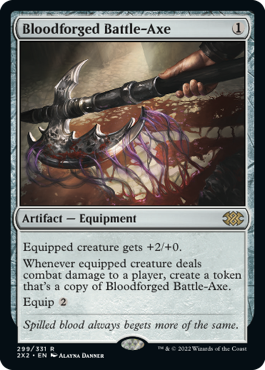
Bloodforged Battle-Axe
{1}
Artifact — Equipment
Equipped creature gets +2/+0.
Whenever equipped creature deals combat damage to a player, create a token that's a copy of Bloodforged Battle-Axe.
Equip {2}
- The token enters the battlefield unattached.
- The token has all three abilities, including the one that creates more tokens.
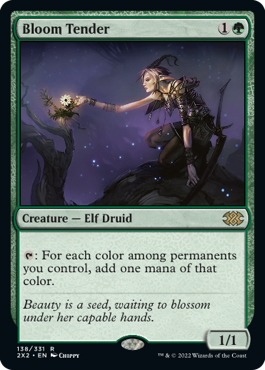
Bloom Tender
{1}{G}
Creature — Elf Druid
1/1
{T}: For each color among permanents you control, add one mana of that color.
- For each color (white, blue, black, red, and green), check to see if you control a permanent of that color. You can count the same permanent for multiple colors. For example, if you control a green enchantment and a white-black creature, Bloom Tender's ability produces {W}{B}{G}.
- Bloom Tender won't add more than one mana of any particular color to your mana pool. At most, it will produce {W}{U}{B}{R}{G}.
- Bloom Tender can't add colorless mana to your mana pool, even if you control a colorless permanent.
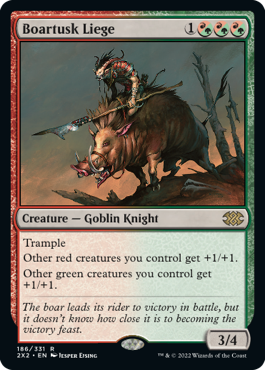
Boartusk Liege
{1}{R/G}{R/G}{R/G}
Creature — Goblin Knight
3/4
Trample
Other red creatures you control get +1/+1.
Other green creatures you control get +1/+1.
- The last two abilities are separate and cumulative. If another creature you control is both of the listed colors, it will get a total of +2/+2.
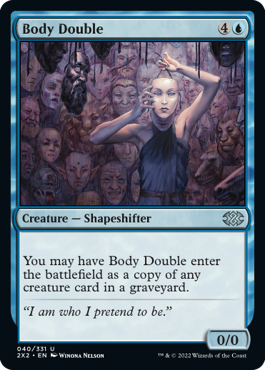
Body Double
{4}{U}
Creature — Shapeshifter
0/0
You may have Body Double enter the battlefield as a copy of any creature card in a graveyard.
- Treat Body Double as though it were the chosen card entering the battlefield. Any "As [this creature] enters the battlefield," "[This creature] enters the battlefield with," and "When [this creature] enters the battlefield" abilities of the chosen card will work.
- You don't have to choose a card to copy. If you don't, Body Double enters the battlefield as a 0/0 creature and is probably put into your graveyard immediately, unless something is increasing its toughness to keep it alive.
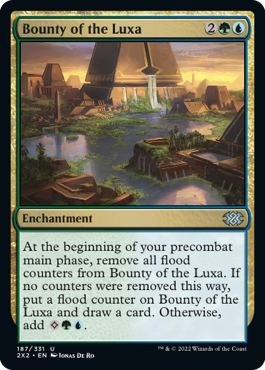
Bounty of the Luxa
{2}{G}{U}
Enchantment
At the beginning of your precombat main phase, remove all flood counters from Bounty of the Luxa. If no counters were removed this way, put a flood counter on Bounty of the Luxa and draw a card. Otherwise, add {C}{G}{U}.
- If Bounty of the Luxa somehow has multiple flood counters on it, you'll still get only {C}{G}{U} when you remove them all.
- If Bounty of the Luxa leaves the battlefield while its triggered ability is on the stack, you can't remove any flood counters from it, even if it had one before it left the battlefield. You won't put one on it as the ability resolves, but you will draw a card.
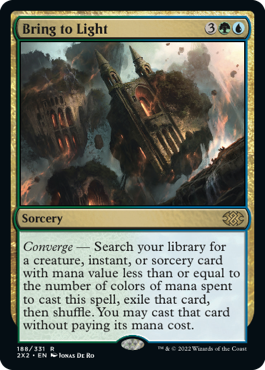
Bring to Light
{3}{G}{U}
Sorcery
Converge — Search your library for a creature, instant, or sorcery card with mana value less than or equal to the number of colors of mana spent to cast this spell, exile that card, then shuffle. You may cast that card without paying its mana cost.
- If you cast the exiled card, you do so as part of the resolution of Bring to Light. You can't wait to cast it later in the turn. Timing restrictions based on the card's type are ignored, but other restrictions (such as "Cast this spell only during combat") are not.
- If you cast a card "without paying its mana cost," you can't choose to cast it for any alternative costs, such as evoke costs. You can, however, pay additional costs, such as kicker costs. If the card has any mandatory additional costs, you must pay those to cast the card.
- If the card has {X} in its mana cost, you must choose 0 as the value of X.
- If you cast an instant or sorcery card this way, it goes to your graveyard as normal. It doesn't return to exile.
- If you don't cast the card, it remains exiled.
- The maximum number of colors of mana you can spend to cast a spell is five. Colorless is not a color. Note that the cost of a spell with converge may limit how many colors of mana you can spend.
- Unless a spell or ability allows you to, you can't choose to pay more mana for a spell with a converge ability just to spend more colors of mana. Likewise, if a spell or ability reduces the amount of mana it costs you to cast a spell with converge, you can't ignore that cost reduction in order to spend more colors of mana.
- If there are any alternative or additional costs to cast a spell with a converge ability, the mana spent to pay those costs will count.
- If you cast a spell with converge without spending any mana to cast it (perhaps because an effect allowed you to cast it without paying its mana cost), then the number of colors spent to cast it will be zero.
- If a spell with a converge ability is copied, no mana was spent to cast the copy, so the number of colors of mana spent to cast the spell will be zero. The number of colors spent to cast the original spell is not copied.
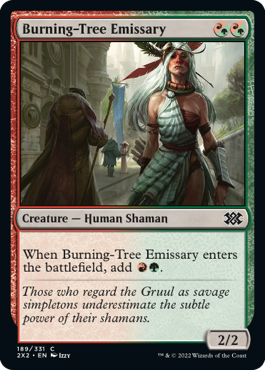
Burning-Tree Emissary
{R/G}{R/G}
Creature — Human Shaman
2/2
When Burning-Tree Emissary enters the battlefield, add {R}{G}.
- Burning-Tree Emissary's ability isn't a mana ability. It uses the stack and can be responded to.
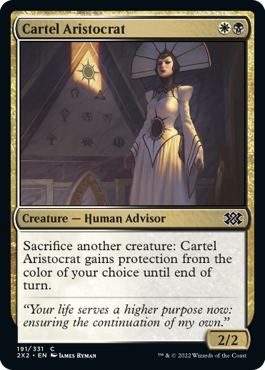
Cartel Aristocrat
{W}{B}
Creature — Human Advisor
2/2
Sacrifice another creature: Cartel Aristocrat gains protection from the color of your choice until end of turn.
- You choose the color when the ability resolves.
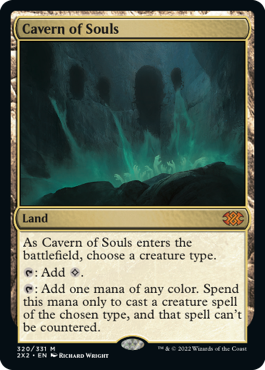
Cavern of Souls
Land
As Cavern of Souls enters the battlefield, choose a creature type.
{T}: Add {C}.
{T}: Add one mana of any color. Spend this mana only to cast a creature spell of the chosen type, and that spell can't be countered.
- You must choose an existing creature type, such as Human or Warrior. Card types such as artifact can't be chosen. Artifact types like Equipment and enchantment types like Shrine also can't be chosen.
- The spell can't be countered if the mana produced by Cavern of Souls is spent to cover any cost of the spell, even an additional cost such as a kicker cost. This is true even if you use the mana to pay an additional cost while casting a spell "without paying its mana cost."
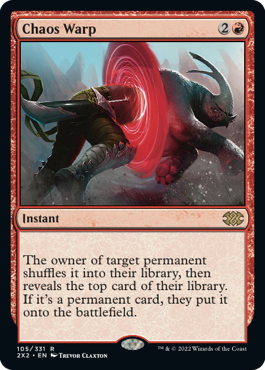
Chaos Warp
{2}{R}
Instant
The owner of target permanent shuffles it into their library, then reveals the top card of their library. If it's a permanent card, they put it onto the battlefield.
- The owner of a token is the player who created it . If a token is shuffled into a player's library this way, that player shuffles before revealing the top card of that library.
- If the permanent is an illegal target by the time Chaos Warp tries to resolve, it won't resolve and none of its effects will occur. No library will be shuffled and no card will be revealed.
- A permanent card is a card with one or more of the following card types: artifact, creature, enchantment, land, or planeswalker.
- If the revealed card is a permanent card but can't enter the battlefield (perhaps because it's an Aura with nothing to enchant), it remains on top of that library.
- If the revealed card is not a permanent card, it remains on top of that library.
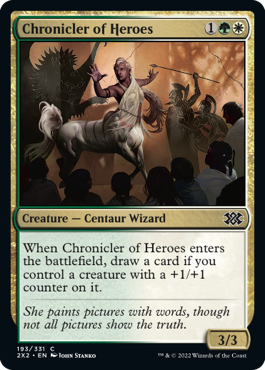
Chronicler of Heroes
{1}{G}{W}
Creature — Centaur Wizard
3/3
When Chronicler of Heroes enters the battlefield, draw a card if you control a creature with a +1/+1 counter on it.
- Whether you control a creature with a +1/+1 counter on it is checked only when Chronicler of Heroes's ability resolves.
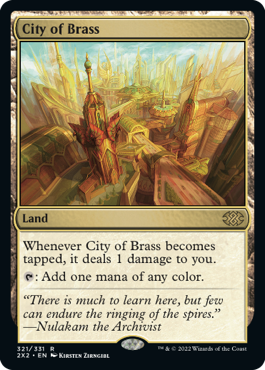
City of Brass
Land
Whenever City of Brass becomes tapped, it deals 1 damage to you.
{T}: Add one mana of any color.
- The first ability triggers no matter how the land becomes tapped.
- If you tap City of Brass while you are casting a spell or activating an ability, its ability will trigger and wait. When you finish casting that spell or activating that ability, City of Brass's triggered ability is put on the stack on top of it. City of Brass's ability will resolve first.
- On the other hand, you can tap City of Brass, put its triggered ability on the stack, and then respond to that ability by casting an instant or activating an ability using that mana. In that case, the instant spell or activated ability will resolve first.
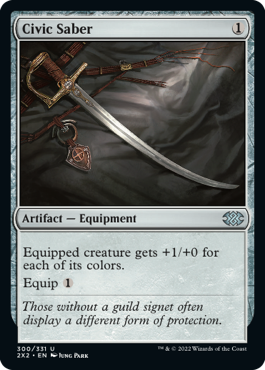
Civic Saber
{1}
Artifact — Equipment
Equipped creature gets +1/+0 for each of its colors.
Equip {1}
- Civic Saber's bonus can range from +0/+0 (for a colorless creature) to +5/+0 (for a creature that's all five colors).
- If the equipped creature becomes a different number of colors, the bonus will change accordingly.
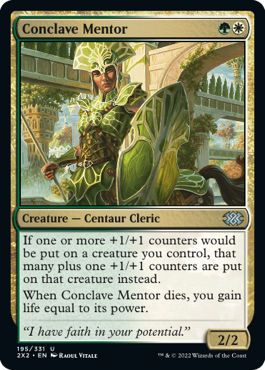
Conclave Mentor
{G}{W}
Creature — Centaur Cleric
2/2
If one or more +1/+1 counters would be put on a creature you control, that many plus one +1/+1 counters are put on that creature instead.
When Conclave Mentor dies, you gain life equal to its power.
- If a creature you control would enter the battlefield with a number of +1/+1 counters on it, it enters with that many plus one instead.
- Conclave Mentor's first ability doesn't apply to itself if it's somehow entering the battlefield with a +1/+1 counter on it.
- If you control two Conclave Mentors, the number of +1/+1 counters put on a creature is two plus the original number. Three Conclave Mentors add three, and so on.
- If two or more effects attempt to modify how many counters would be put onto a creature you control, you choose the order to apply those effects, no matter who controls the sources of those effects.
- Use Conclave Mentor's power as it last existed on the battlefield to determine how much life you gain.
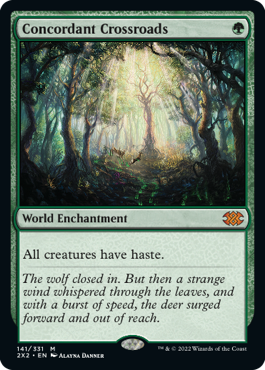
Concordant Crossroads
{G}
World Enchantment
All creatures have haste.
- This has the supertype world. If two or more permanents have the supertype world, all except the one that has had the world supertype for the shortest amount of time are put into their owners' graveyards. This is a state-based action called the "world rule." In the event of a tie, all are put into their owners' graveyards.
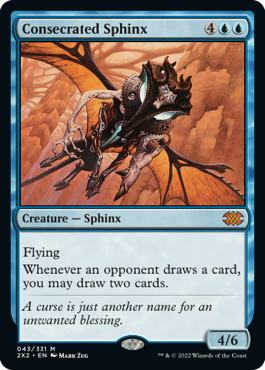
Consecrated Sphinx
{4}{U}{U}
Creature — Sphinx
4/6
Flying
Whenever an opponent draws a card, you may draw two cards.
- You may either draw two cards or not draw at all. You can't choose to draw only one card.
- The ability triggers once for each card an opponent draws. You choose whether to draw two cards as each of those abilities resolves.
- If each player controls a Consecrated Sphinx, their abilities will cause each other to trigger until one player chooses not to draw cards.
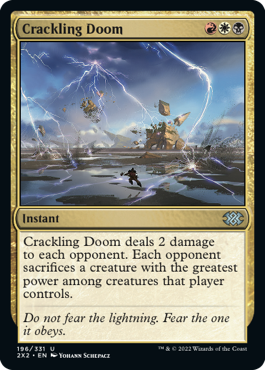
Crackling Doom
{R}{W}{B}
Instant
Crackling Doom deals 2 damage to each opponent. Each opponent sacrifices a creature with the greatest power among creatures that player controls.
- If a player controls two or more creatures tied for the greatest power among creatures they control, that player chooses one of them to sacrifice.
- The sacrifice is not dependent on the damage being dealt. It doesn't matter if that damage is prevented or redirected.
- Crackling Doom doesn't target any player or creature. For example, a creature with protection from black could be sacrificed.
- In a multiplayer game, each opponent, starting with the active player and proceeding in turn order, chooses which creature they will sacrifice and then all creatures are sacrificed at the same time. Each successive player will know what the players before them chose to sacrifice.
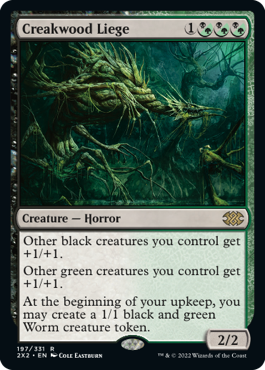
Creakwood Liege
{1}{B/G}{B/G}{B/G}
Creature — Horror
2/2
Other black creatures you control get +1/+1.
Other green creatures you control get +1/+1.
At the beginning of your upkeep, you may create a 1/1 black and green Worm creature token.
- The first two abilities are separate and cumulative. If another creature you control is both of the listed colors, it will get a total of +2/+2.
- Since the token is black and green, it will get +2/+2 from Creakwood Liege as long as the Liege is on the battlefield.
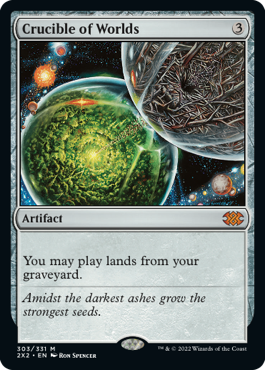
Crucible of Worlds
{3}
Artifact
You may play lands from your graveyard.
- Crucible of Worlds doesn't change the times when you can play those land cards. You can still play only one land per turn, and only during your main phase when you have priority and the stack is empty.
- Crucible of Worlds doesn't allow you to activate abilities (such as cycling) of land cards in your graveyard.
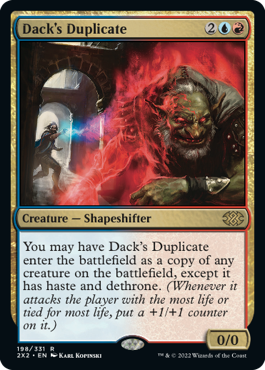
Dack's Duplicate
{2}{U}{R}
Creature — Shapeshifter
0/0
You may have Dack's Duplicate enter the battlefield as a copy of any creature on the battlefield, except it has haste and dethrone. (Whenever it attacks the player with the most life or tied for most life, put a +1/+1 counter on it.)
- Haste and dethrone are part of the copiable values of Dack's Duplicate. If another creature enters the battlefield as or becomes a copy of Dack's Duplicate, it will copy whatever Dack's Duplicate is copying and have haste and dethrone.
- The ability of Dack's Duplicate doesn't target the creature.
- Dack's Duplicate copies exactly what was printed on the original creature and nothing more (unless that creature is copying something else or is a token; see below), except it will have haste and dethrone. It doesn't copy whether that creature is tapped or untapped, whether it has any counters on it or Auras attached to it, or any non-copy effects that have changed its power, toughness, types, color, and so on.
- If the copied creature has {X} in its mana cost, X is considered to be 0.
- If the chosen creature is copying something else (for example, if the chosen creature is another Dack's Duplicate), then Dack's Duplicate enters the battlefield as whatever the chosen creature is copying. It will have haste and dethrone.
- If the chosen creature is a token, Dack's Duplicate copies the original characteristics of that token as stated by the effect that put the token onto the battlefield. Dack's Duplicate is not a token, even when copying one.
- Any enters-the-battlefield abilities of the copied creature will trigger when Dack's Duplicate enters the battlefield. Any "as [this creature] enters the battlefield" or "[this creature] enters the battlefield with" abilities of the chosen creature will also work.
- If Dack's Duplicate somehow enters the battlefield at the same time as another creature, Dack's Duplicate can't become a copy of that creature. You may choose only a creature that's already on the battlefield.
- You can choose to not copy anything. In that case, Dack's Duplicate enters the battlefield as a 0/0 Shapeshifter creature, and will probably die almost immediately, when state-based actions are next performed.
- Dethrone doesn't trigger if the creature attacks a planeswalker, even if its controller has the most life.
- Once dethrone triggers, it doesn't matter what happens to the players' life totals before the ability resolves. You'll put a +1/+1 counter on the creature even if the defending player doesn't have the most life as the ability resolves.
- The +1/+1 counter is put on the creature before blockers are declared.
- In a Two-Headed Giant game, dethrone will trigger if the creature attacks either player on the team with the most life or tied for the most life.
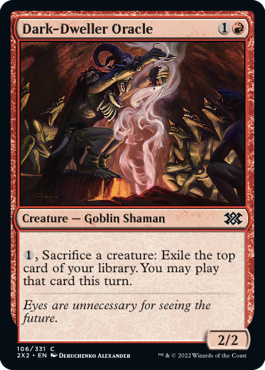
Dark-Dweller Oracle
{1}{R}
Creature — Goblin Shaman
2/2
{1}, Sacrifice a creature: Exile the top card of your library. You may play that card this turn.
- Dark-Dweller Oracle doesn't change when you can cast the exiled card. For example, if you exile a sorcery card, you can cast it only during your main phase when the stack is empty. If you exile a land card, you can play it only during your main phase and only if you have an available land play remaining.
- Playing an exiled card causes it to leave exile. You can't play it multiple times.
- If you don't play the exiled card, it remains in exile.
- You can sacrifice Dark-Dweller Oracle to pay the cost for its own ability.
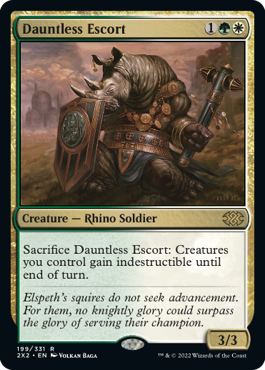
Dauntless Escort
{1}{G}{W}
Creature — Rhino Soldier
3/3
Sacrifice Dauntless Escort: Creatures you control gain indestructible until end of turn.
- Once Dauntless Escort's ability resolves, the set of creatures it affects is locked in. It won't affect creatures that enter the battlefield after the ability has finished resolving.
- If any creature leaves your control, it will retain indestructible.
- Lethal damage and effects that say "destroy" won't cause a creature with indestructible to be put into the graveyard. However, a creature with indestructible can be put into the graveyard for a number of reasons. The most likely reasons are if it's sacrificed, if it's legendary and another legendary creature with the same name is controlled by the same player, or if its toughness is 0 or less.
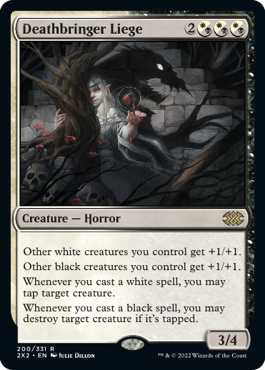
Deathbringer Liege
{2}{W/B}{W/B}{W/B}
Creature — Horror
3/4
Other white creatures you control get +1/+1.
Other black creatures you control get +1/+1.
Whenever you cast a white spell, you may tap target creature.
Whenever you cast a black spell, you may destroy target creature if it's tapped.
- The first two abilities are separate and cumulative. If another creature you control is both of the listed colors, it will get a total of +2/+2.
- If you cast a spell that's both white and black, the last two abilities will both trigger. You may use them together to destroy any creature. To do so, put the "destroy" ability on the stack first, then put the "tap" ability on the stack, with each one targeting the same creature. When the abilities resolve, they'll tap the creature, then destroy it.
- The last ability can target any creature, not just a tapped creature (it doesn't say "target tapped creature"). When the ability resolves, check whether the creature is tapped or not. If it's tapped, you may destroy it. If it's not tapped, the ability does nothing.
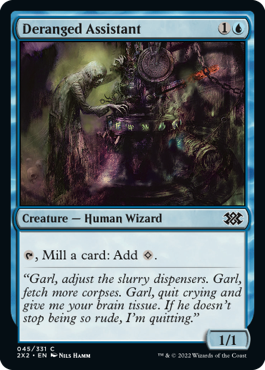
Deranged Assistant
{1}{U}
Creature — Human Wizard
1/1
{T}, Mill a card: Add {C}.
- If you activate Deranged Assistant's ability while casting a spell, you can't choose to rewind the ability once you see the card that was put into your graveyard.
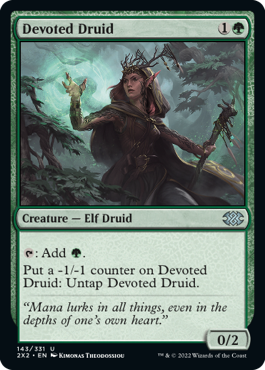
Devoted Druid
{1}{G}
Creature — Elf Druid
0/2
{T}: Add {G}.
Put a -1/-1 counter on Devoted Druid: Untap Devoted Druid.
- You put the -1/-1 counter on Devoted Druid as a cost to activate its ability, not when it resolves. If paying the cost causes Devoted Druid to have 0 toughness, it's put into your graveyard before you can untap it and before you can even pay the cost again.
- If you can't put -1/-1 counters on Devoted Druid (due to an effect such as that of Solemnity), you can't activate its second ability. If you can put counters on it, but that is modified by an effect (such as that of Vizier of Remedies), you can activate the ability even if paying the cost causes no counters to be put on Devoted Druid.
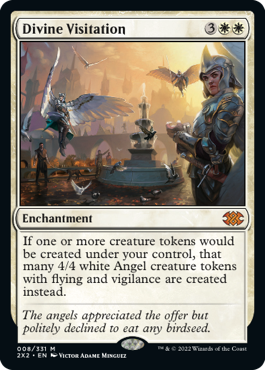
Divine Visitation
{3}{W}{W}
Enchantment
If one or more creature tokens would be created under your control, that many 4/4 white Angel creature tokens with flying and vigilance are created instead.
- The token's characteristics are entirely replaced by a 4/4 white Angel creature token with flying and vigilance. It doesn't have any abilities the token would have been created with. Anything else specified in the effect creating the token (such as tapped, attacking, "That token gains haste," or "Exile that token at end of combat") still applies.
- If you create a noncreature token that will be a creature as it enters the battlefield, perhaps because of an effect such as that of March of the Machines, Divine Visitation's effect doesn't apply to that token's creation. (This is because Divine Visitation's effect modifies how the tokens are created, and March of the Machines's effect doesn't apply until you consider how the tokens are entering the battlefield.)
- If an effect changes under whose control a token would be created, that effect applies before Divine Visitation's effect applies. If an effect changes under whose control a token would enter the battlefield, that effect applies after Divine Visitation's effect is able to be applied.
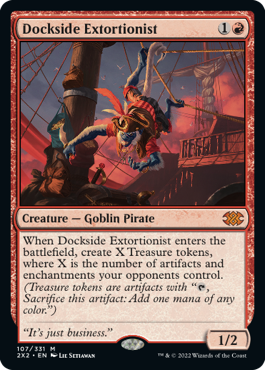
Dockside Extortionist
{1}{R}
Creature — Goblin Pirate
1/2
When Dockside Extortionist enters the battlefield, create X Treasure tokens, where X is the number of artifacts and enchantments your opponents control. (Treasure tokens are artifacts with "{T}, Sacrifice this artifact: Add one mana of any color.")
- If an opponent controls an artifact that's also an enchantment, that permanent is counted only once for Dockside Extortionist's ability.
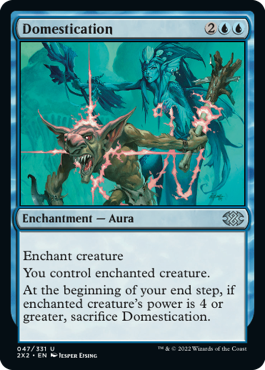
Domestication
{2}{U}{U}
Enchantment — Aura
Enchant creature
You control enchanted creature.
At the beginning of your end step, if enchanted creature's power is 4 or greater, sacrifice Domestication.
- Domestication's triggered ability has an "intervening 'if' clause." That means (1) the ability triggers only if the enchanted creature's power is 4 or greater as your end step begins, and (2) the ability does nothing if the enchanted creature's power is 3 or less by the time it resolves.
- Domestication can target, and can enchant, a creature with power 4 or greater. The enchanted creature's power is checked only when the triggered ability triggers and resolves.
- If an effect changes the enchanted creature's power until end of turn, it will still have the modified power during your end step.
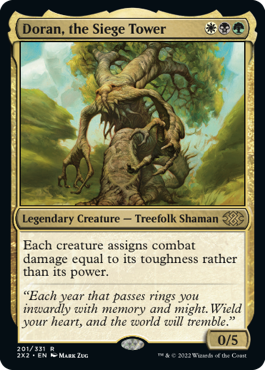
Doran, the Siege Tower
{W}{B}{G}
Legendary Creature — Treefolk Shaman
0/5
Each creature assigns combat damage equal to its toughness rather than its power.
- Doran's ability means, for example, that a 2/3 creature will assign 3 damage in combat instead of 2.
- Doran's ability doesn't actually change creatures' power; it changes only the value of the combat damage they assign. All other rules and effects that check power or toughness use the real values.
- This effect is mandatory and affects all creatures.
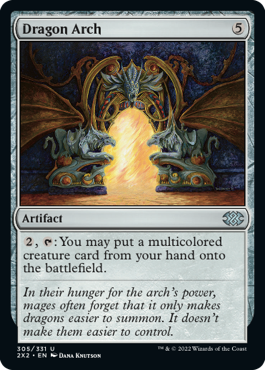
Dragon Arch
{5}
Artifact
{2}, {T}: You may put a multicolored creature card from your hand onto the battlefield.
- A multicolored card has more than one color in its mana cost.
- Putting the card onto the battlefield is optional. When the ability resolves, you can choose not to.
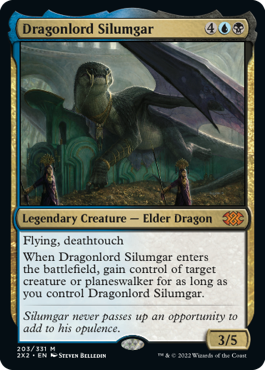
Dragonlord Silumgar
{4}{U}{B}
Legendary Creature — Elder Dragon
3/5
Flying, deathtouch
When Dragonlord Silumgar enters the battlefield, gain control of target creature or planeswalker for as long as you control Dragonlord Silumgar.
- If Dragonlord Silumgar leaves the battlefield, you no longer control it, and its control-change effect ends.
- If Dragonlord Silumgar ceases to be under your control before its ability resolves, you won't gain control of the creature or planeswalker at all.
- If another player gains control of Dragonlord Silumgar, its control-change effect ends. Regaining control of Dragonlord Silumgar won't cause you to regain control of the creature or planeswalker.
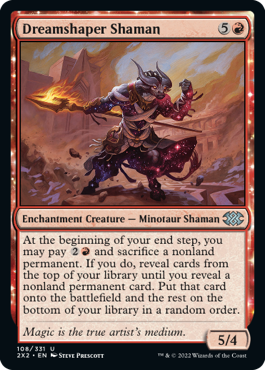
Dreamshaper Shaman
{5}{R}
Enchantment Creature — Minotaur Shaman
5/4
At the beginning of your end step, you may pay {2}{R} and sacrifice a nonland permanent. If you do, reveal cards from the top of your library until you reveal a nonland permanent card. Put that card onto the battlefield and the rest on the bottom of your library in a random order.
- Dreamshaper Shaman can be sacrificed to pay for the cost of its own triggered ability.
- While resolving Dreamshaper Shaman's ability, you can't pay {2}{R} more than once or sacrifice multiple permanents.
- You can't pay {2}{R} and not sacrifice a nonland permanent, or vice versa. The cost must be paid in full or not at all.
- If there are no nonland permanent cards remaining in your library, you just randomize your library and continue playing.
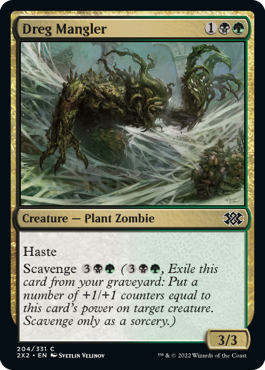
Dreg Mangler
{1}{B}{G}
Creature — Plant Zombie
3/3
Haste
Scavenge {3}{B}{G} ({3}{B}{G}, Exile this card from your graveyard: Put a number of +1/+1 counters equal to this card's power on target creature. Scavenge only as a sorcery.)
- Exiling the creature card with scavenge is part of the cost of activating the scavenge ability. Once the ability is activated and the cost is paid, it's too late to stop the ability from being activated by trying to remove the creature card from the graveyard.
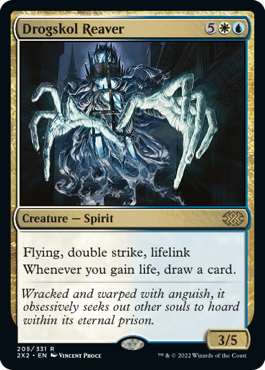
Drogskol Reaver
{5}{W}{U}
Creature — Spirit
3/5
Flying, double strike, lifelink
Whenever you gain life, draw a card.
- If Drogskol Reaver deals enough first-strike damage to destroy each creature it's blocking or was blocked by, it won't deal any damage during the regular combat damage step (unless it's attacking and somehow gains trample). Its ability won't trigger a second time that combat.
- The ability triggers just once for each life-gaining event, no matter how much life was gained.
- If multiple creatures with lifelink you control deal combat damage at the same time, the damage dealt by each of those creatures is a separate life-gaining event and Drogskol Reaver's ability will trigger that many times.
- If a creature with lifelink you control deals damage to multiple creatures, players, and/or planeswalkers at the same time, the ability will trigger just once. The damage dealt by that creature is a single life-gaining event.
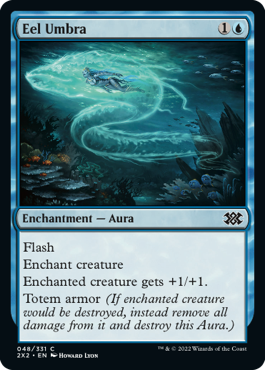
Eel Umbra
{1}{U}
Enchantment — Aura
Flash
Enchant creature
Enchanted creature gets +1/+1.
Totem armor (If enchanted creature would be destroyed, instead remove all damage from it and destroy this Aura.)
- Totem armor's effect is mandatory. If the enchanted permanent would be destroyed, you must remove all damage from it (if it has any) and destroy the Aura that has totem armor instead.
- Totem armor's effect is applied no matter why the enchanted permanent would be destroyed: because it's been dealt lethal damage, or because it's being affected by an effect that says to "destroy" it (such as Putrefy). In either case, all damage is removed from the permanent and the Aura is destroyed instead.
- If a permanent you control is enchanted with multiple Auras that have totem armor, and the enchanted permanent would be destroyed, one of those Auras is destroyed instead—but only one of them. You choose which one because you control the enchanted permanent.
- If a permanent enchanted with an Aura that has totem armor would be destroyed by multiple state-based actions at the same time (most likely because a creature with deathtouch has dealt damage to that creature greater than or equal to its toughness) totem armor's effect will replace all of them and save the creature.
- If a spell or ability (such as Akroma's Vengeance) would destroy both an Aura with totem armor and the permanent it's enchanting at the same time, totem armor's effect will save the enchanted permanent from being destroyed. Instead, the spell or ability will destroy the Aura in two different ways at the same time, but the result is the same as destroying it once.
- Totem armor's effect is not regeneration. Specifically, if totem armor's effect is applied, the enchanted permanent does not become tapped and is not removed from combat as a result. Effects that say the enchanted permanent can't be regenerated (as Putrefy does) won't prevent totem armor's effect from being applied.
- If a spell or ability says that it would "destroy" a permanent enchanted with an Aura that has totem armor, that spell or ability is what causes the Aura to be destroyed instead. Totem armor doesn't destroy the Aura; rather, it changes the effects of the spell or ability. On the other hand, if a spell or ability deals lethal damage to a creature enchanted with an Aura that has totem armor, the game rules regarding lethal damage cause the Aura to be destroyed, not that spell or ability.
- Totem armor has no effect if the enchanted permanent is put into a graveyard for any other reason, such as if it's sacrificed, if the "legend rule" applies to it, or if its toughness is 0 or less.
- If a permanent enchanted with an Aura that has totem armor has indestructible, lethal damage and effects that try to destroy it simply have no effect. Totem armor won't do anything because it won't have to.
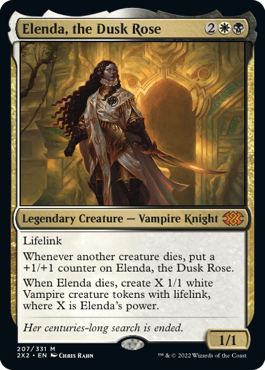
Elenda, the Dusk Rose
{2}{W}{B}
Legendary Creature — Vampire Knight
1/1
Lifelink
Whenever another creature dies, put a +1/+1 counter on Elenda, the Dusk Rose.
When Elenda dies, create X 1/1 white Vampire creature tokens with lifelink, where X is Elenda's power.
- If Elenda dies at the same time as another creature, both of its triggered abilities trigger. However, the first one won't do anything since you can't put a +1/+1 counter on Elenda.
- To determine how many Vampire tokens are created, use Elenda's power as it last existed on the battlefield.
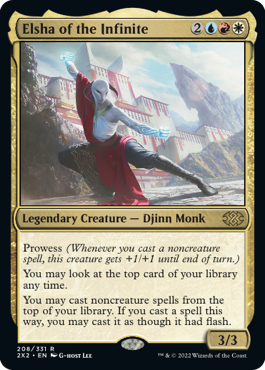
Elsha of the Infinite
{2}{U}{R}{W}
Legendary Creature — Djinn Monk
3/3
Prowess (Whenever you cast a noncreature spell, this creature gets +1/+1 until end of turn.)
You may look at the top card of your library any time.
You may cast noncreature spells from the top of your library. If you cast a spell this way, you may cast it as though it had flash.
- Elsha lets you look at the top card of your library whenever you want (with one restriction—see below), even if you don't have priority. This action doesn't use the stack. Knowing what that card is becomes part of the information you have access to, just like you can look at the cards in your hand.
- If the top card of your library changes while you're casting a spell, playing a land, or activating an ability, you can't look at the new top card until you finish doing so. This means that if you cast the top card of your library, you can't look at the next one until you're done paying for that spell.
- You'll still pay all costs for a spell you cast from your library, including additional costs. You may also pay alternative costs.
- See also "Returning Keyword Ability: Prowess" in the General Notes section.
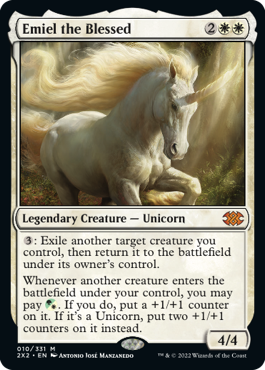
Emiel the Blessed
{2}{W}{W}
Legendary Creature — Unicorn
4/4
{3}: Exile another target creature you control, then return it to the battlefield under its owner's control.
Whenever another creature enters the battlefield under your control, you may pay {G/W}. If you do, put a +1/+1 counter on it. If it's a Unicorn, put two +1/+1 counters on it instead.
- When the card returns to the battlefield, it will be a new object with no connection to the card that was exiled. Auras attached to the exiled creature will be put into their owners' graveyards. Any Equipment will become unattached and remain on the battlefield. Any counters on the exiled creature will cease to exist.
- If a token is exiled this way, it will cease to exist and won't return to the battlefield.
- Emiel's second ability triggers whenever any creature other than itself enters the battlefield under your control, including those returned by its first ability.
- You choose whether to pay for Emiel's triggered ability while it's resolving. If you do, no player may take other actions between the time you pay and the time the creature has one or two +1/+1 counters on it.
- While resolving Emiel's triggered ability, you can't pay {G/W} more than once to put more counters on the creature.
- If the entering creature is a Unicorn, you still have to pay {G/W} to put two +1/+1 counters on it.
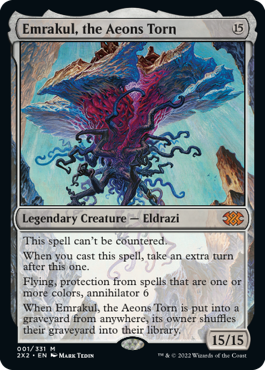
Emrakul, the Aeons Torn
{15}
Legendary Creature — Eldrazi
15/15
This spell can't be countered.
When you cast this spell, take an extra turn after this one.
Flying, protection from spells that are one or more colors, annihilator 6
When Emrakul, the Aeons Torn is put into a graveyard from anywhere, its owner shuffles their graveyard into their library.
- Annihilator abilities trigger and resolve during the declare attackers step. The defending player chooses and sacrifices the required number of permanents before they declare blockers. Any creatures sacrificed this way won't be able to block.
- If a creature with annihilator is attacking a planeswalker, and the defending player chooses to sacrifice that planeswalker, the attacking creature continues to attack. It may be blocked. If it isn't blocked, it simply won't deal combat damage to anything.
- Emrakul's second ability triggers as you cast it, and that ability resolves before the spell itself. It resolves even if that spell is somehow removed from the stack.
- Emrakul can be targeted by spells that try to counter it (such as Mana Drain). Those spells will resolve, but the part of their effect that would counter Emrakul won't do anything. Any other effects those spells have will work as normal.
- "Colored spells" is not synonymous with "colored cards." For example, even though creatures are spells when they're cast, they're not spells when they're on the battlefield and can block Emrakul; and triggered abilities of permanents entering the battlefield (such as that of Banishing Light) can target it.
- Emrakul can't be the target of colored Aura spells, but colored Auras can be put onto the battlefield enchanting it.
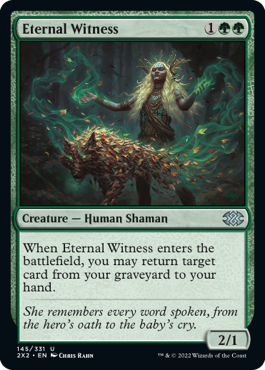
Eternal Witness
{1}{G}{G}
Creature — Human Shaman
2/1
When Eternal Witness enters the battlefield, you may return target card from your graveyard to your hand.
- If a resolving spell puts Eternal Witness onto the battlefield, Eternal Witness's ability can target that card if it's put into your graveyard as it resolves.
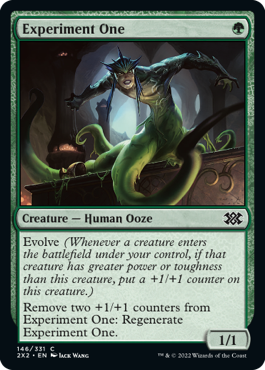
Experiment One
{G}
Creature — Human Ooze
1/1
Evolve (Whenever a creature enters the battlefield under your control, if that creature has greater power or toughness than this creature, put a +1/+1 counter on this creature.)
Remove two +1/+1 counters from Experiment One: Regenerate Experiment One.
- "Regenerate [permanent]" means "The next time [permanent] would be destroyed this turn, instead remove all damage marked on it and tap it. If it's an attacking or blocking creature, remove it from combat."
- If removing two +1/+1 counters from Experiment One causes the amount of damage already marked on Experiment One to be equal to or greater than its toughness, it will be put into its owner's graveyard as a state-based action before the regeneration shield is created.
- When comparing the stats of the two creatures for evolve, you always compare power to power and toughness to toughness.
- Whenever a creature enters the battlefield under your control, check its power and toughness against the power and toughness of the creature with evolve. If neither stat of the new creature is greater, evolve won't trigger at all.
- If evolve triggers, the stat comparison will happen again when the ability tries to resolve. If neither stat of the new creature is greater, the ability will do nothing. If the creature that entered the battlefield leaves the battlefield before evolve tries to resolve, use its last known power and toughness to compare the stats.
- If a creature enters the battlefield with +1/+1 counters on it, consider those counters when determining if evolve will trigger. For example, a 1/1 creature that enters the battlefield with two +1/+1 counters on it will cause the evolve ability of a 2/2 creature to trigger.
- If multiple creatures enter the battlefield at the same time, evolve may trigger multiple times, although the stat comparison will take place each time one of those abilities tries to resolve. For example, if you control a 2/2 creature with evolve and two 3/3 creatures enter the battlefield, evolve will trigger twice. The first ability will resolve and put a +1/+1 counter on the creature with evolve. When the second ability tries to resolve, neither the power nor the toughness of the new creature is greater than that of the creature with evolve, so that ability does nothing.
- When comparing the stats as the evolve ability resolves, it's possible that the stat that's greater changes from power to toughness or vice versa. If this happens, the ability will still resolve and you'll put a +1/+1 counter on the creature with evolve. For example, if you control a 2/2 creature with evolve and a 1/3 creature enters the battlefield under your control, it toughness is greater so evolve will trigger. In response, the 1/3 creature gets +2/-2. When the evolve trigger tries to resolve, its power is greater. You'll put a +1/+1 counter on the creature with evolve.
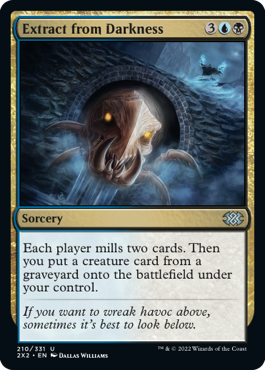
Extract from Darkness
{3}{U}{B}
Sorcery
Each player mills two cards. Then you put a creature card from a graveyard onto the battlefield under your control.
- Extract from Darkness doesn't target a creature card. You choose which card you're putting onto the battlefield as it resolves. You can choose any creature card in a graveyard at that time, including one just put into a graveyard by Extract from Darkness. If there are no creature cards in graveyards at that time, Extract from Darkness simply finishes resolving.
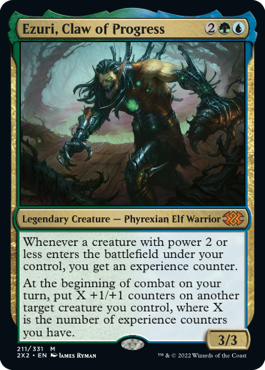
Ezuri, Claw of Progress
{2}{G}{U}
Legendary Creature — Phyrexian Elf Warrior
3/3
Whenever a creature with power 2 or less enters the battlefield under your control, you get an experience counter.
At the beginning of combat on your turn, put X +1/+1 counters on another target creature you control, where X is the number of experience counters you have.
- All experience counters are identical, no matter how you got them. For example, the last ability will count experience counters that you got from the first ability, from another ability, from proliferating, and so on.
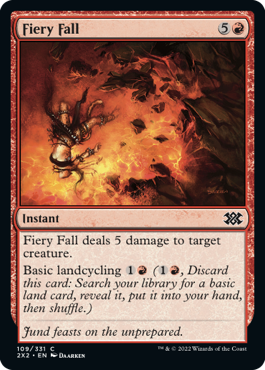
Fiery Fall
{5}{R}
Instant
Fiery Fall deals 5 damage to target creature.
Basic landcycling {1}{R} ({1}{R}, Discard this card: Search your library for a basic land card, reveal it, put it into your hand, then shuffle.)
- Unlike the normal cycling ability, basic landcycling doesn't allow you to draw a card. Instead, it lets you search your library for a basic land card. You don't choose the type of basic land card you'll find until you're performing the search. After you choose a basic land card in your library, you reveal it, put it into your hand, then shuffle your library.
- Basic landcycling is a form of cycling. Any ability that triggers on a card being cycled also triggers on a card being basic landcycled. Any ability that stops a cycling ability from being activated also stops a basic landcycling ability from being activated.
- Basic landcycling is an activated ability. Effects that interact with activated abilities (such as Stifle or Rings of Brighthearth) will interact with basic landcycling. Effects that interact with spells (such as Counterspell or Faerie Tauntings) will not.
- You can choose not to find a basic land card, even if there is one in your library.
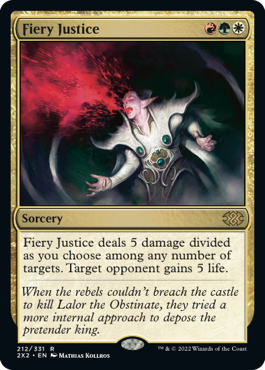
Fiery Justice
{R}{G}{W}
Sorcery
Fiery Justice deals 5 damage divided as you choose among any number of targets. Target opponent gains 5 life.
- You choose how many targets Fiery Justice has and how the damage is divided as you cast it. Each target for its damage-dealing effect must receive at least 1 damage.
- If some (but not all) of the targets become illegal, the original division of damage still applies, but no damage is dealt to illegal targets. If all targets become illegal, including the target opponent for the life-gaining effect, Fiery Justice doesn't resolve. If each target for the damage-dealing effect becomes illegal while the target for the life-gaining effect remains legal, that player gains 5 life even though no damage is dealt.
- The target opponent for the life-gaining effect may also be a target for the damage-dealing effect. If this happens and the damage brings that player's life total to 0 or less, the life-gaining effect will raise their life total above 0 again before the player would lose the game.
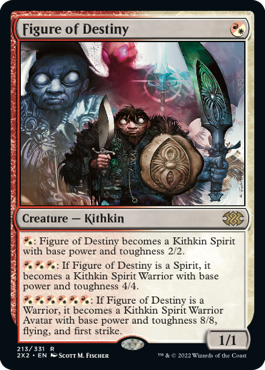
Figure of Destiny
{R/W}
Creature — Kithkin
1/1
{R/W}: Figure of Destiny becomes a Kithkin Spirit with base power and toughness 2/2.
{R/W}{R/W}{R/W}: If Figure of Destiny is a Spirit, it becomes a Kithkin Spirit Warrior with base power and toughness 4/4.
{R/W}{R/W}{R/W}{R/W}{R/W}{R/W}: If Figure of Destiny is a Warrior, it becomes a Kithkin Spirit Warrior Avatar with base power and toughness 8/8, flying, and first strike.
- None of these abilities has a duration. If one of them resolves, it will remain in effect until the game ends, Figure of Destiny leaves the battlefield, or some subsequent effect changes its characteristics, whichever comes first.
- Figure of Destiny's abilities overwrite its power, toughness, and creature types. Typically, those abilities are activated in the order they appear on the card. However, if Figure of Destiny is an 8/8 Kithkin Spirit Warrior Avatar with flying and first strike, and you activate its first ability, it will become a 2/2 Kithkin Spirit that still has flying and first strike.
- You can activate Figure of Destiny's second and third abilities regardless of what creature types it is. Each of those abilities checks Figure of Destiny's creature types when that ability resolves. If Figure of Destiny isn't the appropriate creature type at that time, the ability does nothing.
- Figure of Destiny's second ability checks whether it's a Spirit, and its third ability checks whether it's a Warrior. It doesn't matter how it became the appropriate creature type.
- The effect from any of these abilities overwrites other effects that have previously set the creature's power and/or toughness. It will not overwrite effects that modify power or toughness (whether from a static ability, counters, or a resolved spell or ability), nor will it overwrite effects that set power and toughness which come into existence after the ability resolves. Effects that switch the creature's power and toughness are always applied after any other power- or toughness-changing effects, including this one, regardless of the order in which they are created.
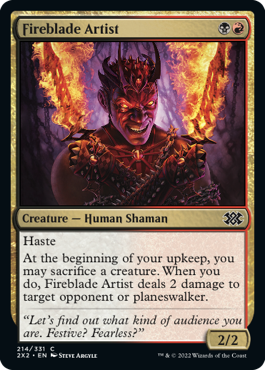
Fireblade Artist
{B}{R}
Creature — Human Shaman
2/2
Haste
At the beginning of your upkeep, you may sacrifice a creature. When you do, Fireblade Artist deals 2 damage to target opponent or planeswalker.
- Fireblade Artist's triggered ability goes on the stack without a target. While that ability is resolving, you may sacrifice a creature. When you do, the reflexive triggered ability triggers and you pick a target opponent or planeswalker to be dealt damage. This is different from effects that say "If you do
. . . " in that players may take actions after you've sacrificed the creature but before damage is dealt.
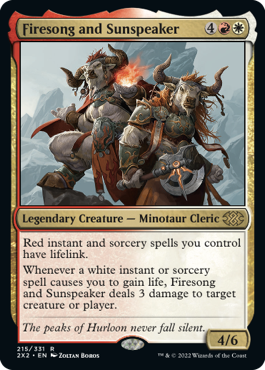
Firesong and Sunspeaker
{4}{R}{W}
Legendary Creature — Minotaur Cleric
4/6
Red instant and sorcery spells you control have lifelink.
Whenever a white instant or sorcery spell causes you to gain life, Firesong and Sunspeaker deals 3 damage to target creature or player.
- If a source you control with lifelink deals damage to you, you gain and lose that much life simultaneously. Your life total doesn't change.
- The last ability of Firesong and Sunspeaker can't target a planeswalker.
- A spell causes you to gain life if its cost or effect instructs you to gain life or if an instruction in its cost or effect is modified by a replacement effect and the modified event includes you gaining life. If a spell's cost or effect instructs a source with lifelink you control to deal damage, that spell causes that life gain as well.
- If a white instant or sorcery spell you don't control causes you to gain life, Firesong and Sunspeaker's last ability triggers.
- If you gain an amount of life "for each" of something, that life is gained as one event and Firesong and Sunspeaker's last ability triggers only once.
- Firesong and Sunspeaker's last ability doesn't trigger if a triggered ability of a white instant or sorcery spell or card causes you to gain life, such as the triggered ability of Renewed Faith when it's cycled.
- If a red and white spell you control deals damage to multiple things using the word "deals" only once, Firesong and Sunspeaker's last ability triggers only once. Similarly, if a red and white spell's effect causes it to deal damage to one thing and then deal more damage with a second instance of the word "deals," Firesong and Sunspeaker's last ability triggers twice, and so on.
- If a red and white spell you control deals damage and also instructs you to gain life, Firesong and Sunspeaker's last ability triggers twice.
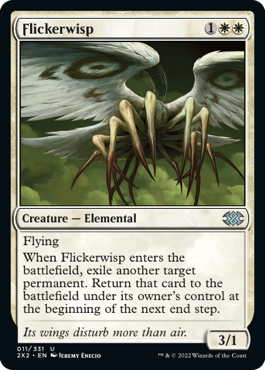
Flickerwisp
{1}{W}{W}
Creature — Elemental
3/1
Flying
When Flickerwisp enters the battlefield, exile another target permanent. Return that card to the battlefield under its owner's control at the beginning of the next end step.
- The exiled card will return to the battlefield at the beginning of the end step even if Flickerwisp is no longer on the battlefield.
- If the permanent that returns to the battlefield has any abilities that trigger at the beginning of the end step, those abilities won't trigger that turn.
- Auras attached to the exiled permanent will be put into their owners' graveyards. Equipment attached to the exiled permanent will become unattached and remain on the battlefield. Any counters on the exiled permanent will cease to exist. Once the exiled permanent returns, it's considered a new object with no relation to the object that it was.
- If a token is exiled this way, it will cease to exist and won't return to the battlefield.
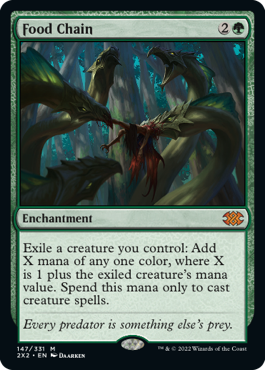
Food Chain
{2}{G}
Enchantment
Exile a creature you control: Add X mana of any one color, where X is 1 plus the exiled creature's mana value. Spend this mana only to cast creature spells.
- Mana produced by Food Chain can be spent on any part of a creature spell's total cost, including additional costs (such as kicker costs) and alternative costs. It can't be spent to pay the costs of abilities of creatures you control.
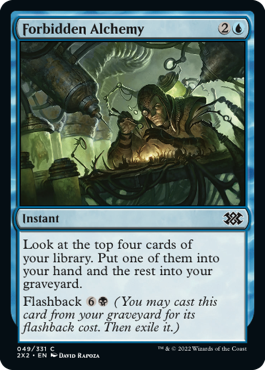
Forbidden Alchemy
{2}{U}
Instant
Look at the top four cards of your library. Put one of them into your hand and the rest into your graveyard.
Flashback {6}{B} (You may cast this card from your graveyard for its flashback cost. Then exile it.)
- If you have fewer than four cards in your library, you'll look at all the cards there and put one into your hand and the rest into your graveyard.
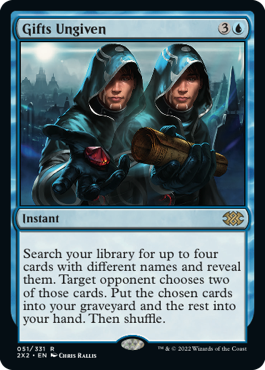
Gifts Ungiven
{3}{U}
Instant
Search your library for up to four cards with different names and reveal them. Target opponent chooses two of those cards. Put the chosen cards into your graveyard and the rest into your hand. Then shuffle.
- You can choose to find fewer than four cards if you want. If you find one or two cards, your opponent must choose for them to be put into your graveyard, even if they don't want to.
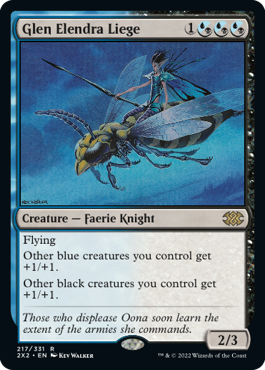
Glen Elendra Liege
{1}{U/B}{U/B}{U/B}
Creature — Faerie Knight
2/3
Flying
Other blue creatures you control get +1/+1.
Other black creatures you control get +1/+1.
- The last two abilities are separate and cumulative. If another creature you control is both of the listed colors, it will get a total of +2/+2.
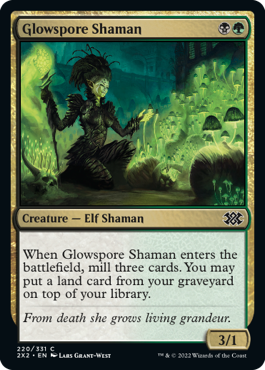
Glowspore Shaman
{B}{G}
Creature — Elf Shaman
3/1
When Glowspore Shaman enters the battlefield, mill three cards. You may put a land card from your graveyard on top of your library.
- The land card you put on top of your library may be one that you just put into your graveyard.
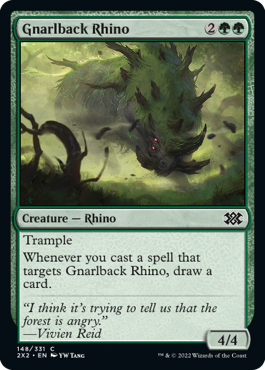
Gnarlback Rhino
{2}{G}{G}
Creature — Rhino
4/4
Trample
Whenever you cast a spell that targets Gnarlback Rhino, draw a card.
- Gnarlback Rhino's last ability resolves before the spell that caused it to trigger. It resolves even if that spell is countered.
- Gnarlback Rhino's last ability triggers when you cast a spell that has multiple targets as long as at least one of those targets is Gnarlback Rhino. It doesn't trigger multiple times if you cast a spell that targets Gnarlback Rhino multiple times.
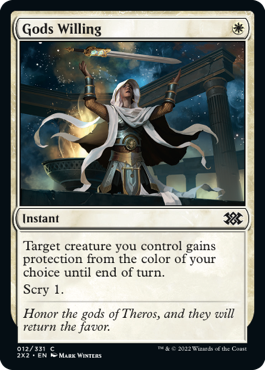
Gods Willing
{W}
Instant
Target creature you control gains protection from the color of your choice until end of turn.
Scry 1.
- You can't choose "artifact" or "colorless" as Gods Willing asks you to choose a color because those are not colors.
- If the target creature is an illegal target by the time Gods Willing tries to resolve, the spell doesn't resolve. You won't scry 1. If the target creature becomes an illegal target while Gods Willing is resolving (most likely because you gave it protection from white), you do scry 1.
- You choose the color as Gods Willing resolves. Once the color is chosen, it's too late for players to respond.
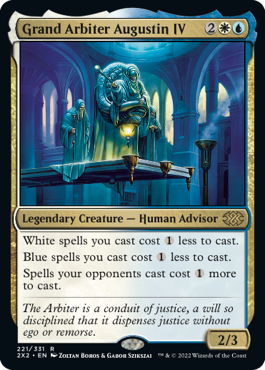
Grand Arbiter Augustin IV
{2}{W}{U}
Legendary Creature — Human Advisor
2/3
White spells you cast cost {1} less to cast.
Blue spells you cast cost {1} less to cast.
Spells your opponents cast cost {1} more to cast.
- Spells you cast that are both white and blue cost {2} less to cast.
- None of these effects change how much colored mana is required to cast spells.
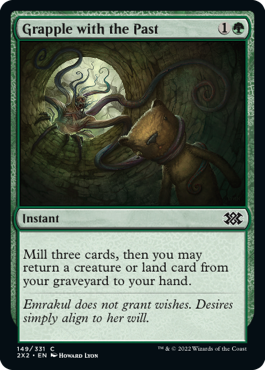
Grapple with the Past
{1}{G}
Instant
Mill three cards, then you may return a creature or land card from your graveyard to your hand.
- Grapple with the Past doesn't target the card to return to your hand. After putting the top three cards of your library into your graveyard, you may choose from among any creature or land cards there.
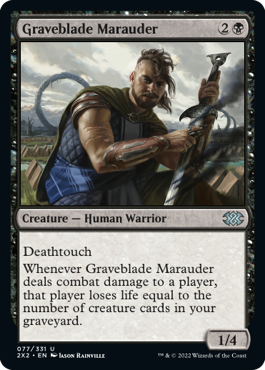
Graveblade Marauder
{2}{B}
Creature — Human Warrior
1/4
Deathtouch
Whenever Graveblade Marauder deals combat damage to a player, that player loses life equal to the number of creature cards in your graveyard.
- Count the number of creature cards in your graveyard as the ability resolves to determine how much life is lost. Notably, this could include any other creature you owned that died in combat, and perhaps even Graveblade Marauder itself.
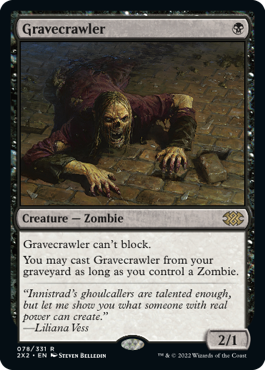
Gravecrawler
{B}
Creature — Zombie
2/1
Gravecrawler can't block.
You may cast Gravecrawler from your graveyard as long as you control a Zombie.
- Gravecrawler's ability doesn't change when you could cast it.
- Once you've cast Gravecrawler and it's on the stack, it doesn't matter if you lose control of the other Zombie.
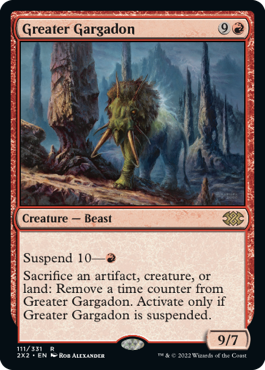
Greater Gargadon
{9}{R}
Creature — Beast
9/7
Suspend 10—{R}
Sacrifice an artifact, creature, or land: Remove a time counter from Greater Gargadon. Activate only if Greater Gargadon is suspended.
- Suspend is a keyword that represents three abilities. The first is a static ability that allows you to exile the card from your hand with the specified number of time counters (the number before the dash) on it by paying its suspend cost (listed after the dash). The second is a triggered ability that removes a time counter from the suspended card at the beginning of each of your upkeeps. The third is a triggered ability that causes you to cast the card when the last time counter is removed. If you cast a creature spell this way, it gains haste until you lose control of that creature (or, in rare cases, you lose control of the creature spell while it's on the stack).
- You can exile a card in your hand using suspend any time you could cast that card. Consider its card type, any effects that modify when you could cast it (such as flash) and any other effects that stop you from casting it (such as from Meddling Mage's ability) to determine if and when you can do this. Whether you could actually complete all steps in casting the card is irrelevant. For example, you can exile a card with suspend that has no mana cost or that requires a target even if no legal targets are available at that time.
- Cards exiled with suspend are exiled face up.
- Exiling a card with suspend isn't casting that card. This action doesn't use the stack and can't be responded to.
- If the first triggered ability of suspend (the one that removes time counters) is countered, no time counter is removed. The ability will trigger again at the beginning of the card's owner's next upkeep.
- When the last time counter is removed, the second triggered ability of suspend (the one that lets you cast the card) triggers. It doesn't matter why the last time counter was removed or what effect removed it.
- If the second triggered ability is countered, the card can't be cast. It remains exiled with no time counters on it, and it's no longer suspended.
- As the second triggered ability resolves, you must cast the card if able. You must do so even if it requires targets and the only legal targets are ones that you really don't want to target. Timing permissions based on the card's type are ignored.
- The mana value of a spell cast without paying its mana cost is determined by its mana cost, even though that cost wasn't paid.
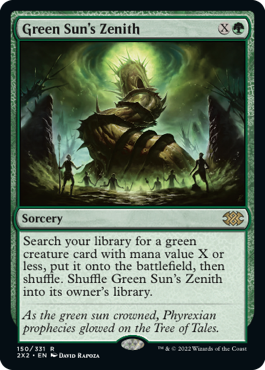
Green Sun's Zenith
{X}{G}
Sorcery
Search your library for a green creature card with mana value X or less, put it onto the battlefield, then shuffle. Shuffle Green Sun's Zenith into its owner's library.
- If Green Sun's Zenith is countered, none of its effects will happen. Notably, it will be put into its owner's graveyard rather than shuffled into its owner's library.
- In most cases, if you own Green Sun's Zenith and cast it, you'll shuffle your library twice. In practice, shuffling once is sufficient, but effects that care about you shuffling your library (like Psychogenic Probe, for example) will see that you've shuffled twice.
- If you own Green Sun's Zenith, but an opponent casts it (due to Knowledge Pool's effect, for example), that opponent searches their library for an appropriate creature card, then shuffles that library. That opponent then shuffles Green Sun's Zenith into your library. You won't shuffle any library in this case.
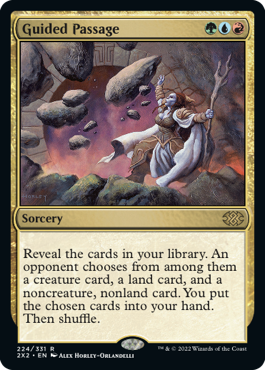
Guided Passage
{G}{U}{R}
Sorcery
Reveal the cards in your library. An opponent chooses from among them a creature card, a land card, and a noncreature, nonland card. You put the chosen cards into your hand. Then shuffle.
- If you have no cards of any of the specified card types, then ignore those types and the opponent only selects cards of the types you do have.
- Yes, your opponents get to look at all the cards in your library.
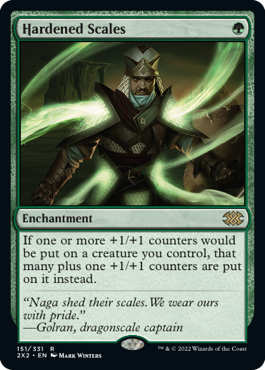
Hardened Scales
{G}
Enchantment
If one or more +1/+1 counters would be put on a creature you control, that many plus one +1/+1 counters are put on it instead.
- "Put on a creature you control" includes that creature entering the battlefield with +1/+1 counters on it. If a creature would enter the battlefield with a number of +1/+1 counters on it while you control Hardened Scales, it enters with that many counters plus one.
- Each additional Hardened Scales you control will increase the number of +1/+1 counters placed on a creature by one.
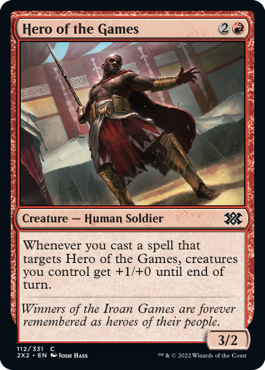
Hero of the Games
{2}{R}
Creature — Human Soldier
3/2
Whenever you cast a spell that targets Hero of the Games, creatures you control get +1/+0 until end of turn.
- An ability that triggers when you cast a spell resolves before the spell that caused it to trigger. It resolves even if that spell is countered.
- If you cast a spell that targets this creature multiple times, this ability triggers just once.
- This ability doesn't trigger if you copy a spell that targets this creature, or if a spell's targets are changed to target it.
- This effect affects only creatures you control at the time the ability resolves. Creatures you begin to control later in the turn won't get +1/+0.
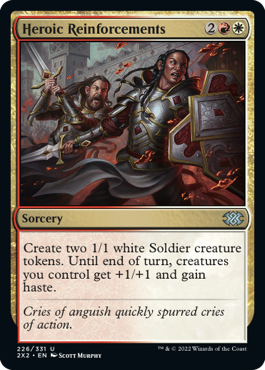
Heroic Reinforcements
{2}{R}{W}
Sorcery
Create two 1/1 white Soldier creature tokens. Until end of turn, creatures you control get +1/+1 and gain haste.
- The second part of Heroic Reinforcements's effect affects only creatures you control at the time it's applied, including the tokens created by the first part of its effect. Creatures you begin to control later in the turn won't get +1/+1 or gain haste.
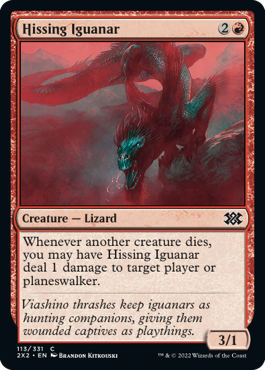
Hissing Iguanar
{2}{R}
Creature — Lizard
3/1
Whenever another creature dies, you may have Hissing Iguanar deal 1 damage to target player or planeswalker.
- If Hissing Iguanar dies at the same time as another creature, Hissing Iguanar's ability triggers.
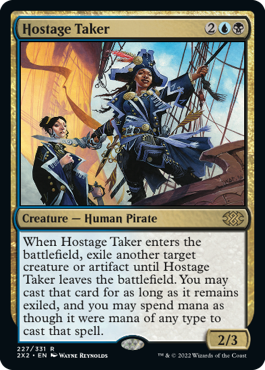
Hostage Taker
{2}{U}{B}
Creature — Human Pirate
2/3
When Hostage Taker enters the battlefield, exile another target creature or artifact until Hostage Taker leaves the battlefield. You may cast that card for as long as it remains exiled, and you may spend mana as though it were mana of any type to cast that spell.
- If Hostage Taker leaves the battlefield before its triggered ability resolves, the target permanent won't be exiled.
- Auras attached to the exiled permanent will be put into their owners' graveyards. Any Equipment will become unattached and remain on the battlefield. Any counters on the exiled permanent will cease to exist.
- If a token is exiled this way, it will cease to exist and won't return to the battlefield. You can't cast it.
- Once you begin to cast the exiled card, it's considered a new object. You'll control that spell and the permanent that spell becomes even if Hostage Taker leaves the battlefield.
- If it's still in exile, the exiled card returns to the battlefield immediately after Hostage Taker leaves the battlefield. Nothing happens between the two events, including state-based actions.
- In a multiplayer game, if Hostage Taker's owner leaves the game while the card is still exiled and another player owns that card, the exiled card will return to the battlefield under its owner's control. Because the one-shot effect that returns the card isn't an ability that goes on the stack, it won't cease to exist along with the leaving player's spells and abilities on the stack.
- In a multiplayer game, if a player leaves the game, all cards that player owns leave as well. If you leave the game, any spell or permanent cards you control from Hostage Taker's ability are exiled.
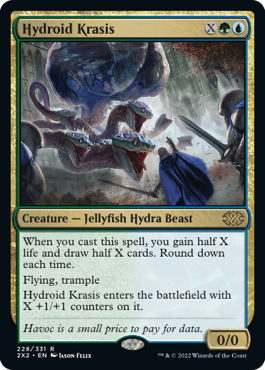
Hydroid Krasis
{X}{G}{U}
Creature — Jellyfish Hydra Beast
0/0
When you cast this spell, you gain half X life and draw half X cards. Round down each time.
Flying, trample
Hydroid Krasis enters the battlefield with X +1/+1 counters on it.
- Hydroid Krasis's first ability triggers as you cast it, and that ability resolves before the spell itself. It resolves even if Hydroid Krasis is countered.
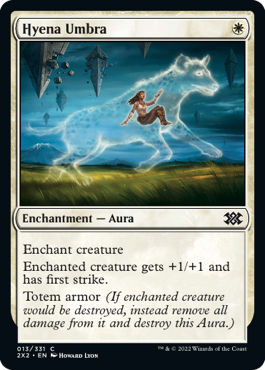
Hyena Umbra
{W}
Enchantment — Aura
Enchant creature
Enchanted creature gets +1/+1 and has first strike.
Totem armor (If enchanted creature would be destroyed, instead remove all damage from it and destroy this Aura.)
- Totem armor's effect is mandatory. If the enchanted permanent would be destroyed, you must remove all damage from it (if it has any) and destroy the Aura that has totem armor instead.
- Totem armor's effect is applied no matter why the enchanted permanent would be destroyed: because it's been dealt lethal damage, or because it's being affected by an effect that says to "destroy" it (such as Putrefy). In either case, all damage is removed from the permanent and the Aura is destroyed instead.
- If a permanent you control is enchanted with multiple Auras that have totem armor, and the enchanted permanent would be destroyed, one of those Auras is destroyed instead—but only one of them. You choose which one because you control the enchanted permanent.
- If a permanent enchanted with an Aura that has totem armor would be destroyed by multiple state-based actions at the same time (most likely because a creature with deathtouch has dealt damage to that creature greater than or equal to its toughness) totem armor's effect will replace all of them and save the creature.
- If a spell or ability (such as Akroma's Vengeance) would destroy both an Aura with totem armor and the permanent it's enchanting at the same time, totem armor's effect will save the enchanted permanent from being destroyed. Instead, the spell or ability will destroy the Aura in two different ways at the same time, but the result is the same as destroying it once.
- Totem armor's effect is not regeneration. Specifically, if totem armor's effect is applied, the enchanted permanent does not become tapped and is not removed from combat as a result. Effects that say the enchanted permanent can't be regenerated (as Putrefy does) won't prevent totem armor's effect from being applied.
- If a spell or ability says that it would "destroy" a permanent enchanted with an Aura that has totem armor, that spell or ability is what causes the Aura to be destroyed instead. Totem armor doesn't destroy the Aura; rather, it changes the effects of the spell or ability. On the other hand, if a spell or ability deals lethal damage to a creature enchanted with an Aura that has totem armor, the game rules regarding lethal damage cause the Aura to be destroyed, not that spell or ability.
- Totem armor has no effect if the enchanted permanent is put into a graveyard for any other reason, such as if it's sacrificed, if the "legend rule" applies to it, or if its toughness is 0 or less.
- If a permanent enchanted with an Aura that has totem armor has indestructible, lethal damage and effects that try to destroy it simply have no effect. Totem armor won't do anything because it won't have to.
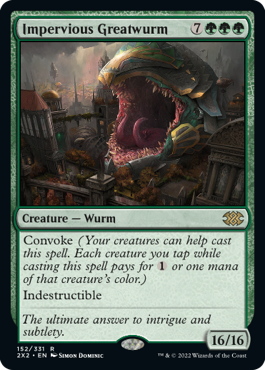
Impervious Greatwurm
{7}{G}{G}{G}
Creature — Wurm
16/16
Convoke (Your creatures can help cast this spell. Each creature you tap while casting this spell pays for {1} or one mana of that creature's color.)
Indestructible
- You can tap any untapped creature you control to convoke a spell, even one you haven't controlled continuously since the beginning of your most recent turn.
- When calculating a spell's total cost, include any alternative costs, additional costs, or anything else that increases or reduces the cost to cast the spell. Convoke applies after the total cost is calculated. Convoke doesn't change a spell's mana cost or mana value.
- If a creature you control has a mana ability with {T} in the cost, activating that ability while casting a spell with convoke will result in the creature being tapped before you pay the spell's costs. You won't be able to tap it again for convoke. Similarly, if you sacrifice a creature to activate a mana ability while casting a spell with convoke, that creature won't be on the battlefield when you pay the spell's costs, so you won't be able to tap it for convoke.
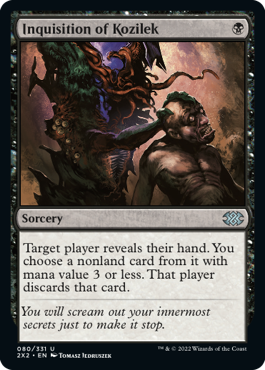
Inquisition of Kozilek
{B}
Sorcery
Target player reveals their hand. You choose a nonland card from it with mana value 3 or less. That player discards that card.
- If you target yourself with this spell, you must reveal your entire hand to the other players just as any other player would.
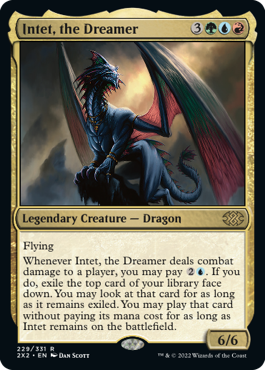
Intet, the Dreamer
{3}{G}{U}{R}
Legendary Creature — Dragon
6/6
Flying
Whenever Intet, the Dreamer deals combat damage to a player, you may pay {2}{U}. If you do, exile the top card of your library face down. You may look at that card for as long as it remains exiled. You may play that card without paying its mana cost for as long as Intet remains on the battlefield.
- After Intet leaves the battlefield, if a card exiled this way is still exiled, you may still look at it. You won't be able to play it, though.
- Once you play a card this way, it leaves exile. You won't be able to play that card again.
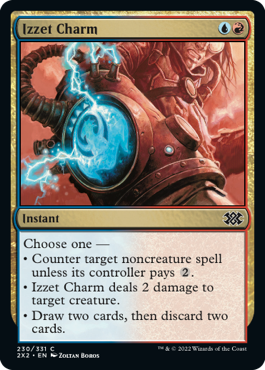
Izzet Charm
{U}{R}
Instant
Choose one —
• Counter target noncreature spell unless its controller pays {2}.
• Izzet Charm deals 2 damage to target creature.
• Draw two cards, then discard two cards.
- If you choose the last mode, you draw two cards and discard two cards all while Izzet Charm is resolving. Nothing can happen between the two, and no player may choose to take actions.
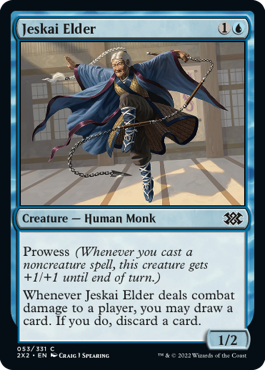
Jeskai Elder
{1}{U}
Creature — Human Monk
1/2
Prowess (Whenever you cast a noncreature spell, this creature gets +1/+1 until end of turn.)
Whenever Jeskai Elder deals combat damage to a player, you may draw a card. If you do, discard a card.
- You draw a card and discard a card all while Jeskai Elder's ability is resolving. Nothing can happen between the two, and no player may choose to take actions.
- See also "Returning Keyword Ability: Prowess" in the General Notes section.
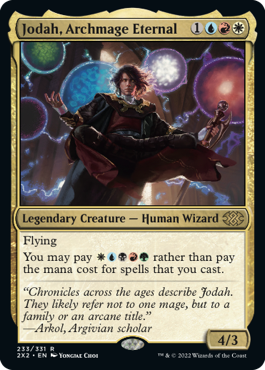
Jodah, Archmage Eternal
{1}{U}{R}{W}
Legendary Creature — Human Wizard
4/3
Flying
You may pay {W}{U}{B}{R}{G} rather than pay the mana cost for spells that you cast.
- Jodah's last ability is an alternative cost to cast a spell. You can't combine this with other alternative costs, such as flashback. You can pay additional costs, such as kicker, in addition to this alternative cost.
- If you apply Jodah's alternative cost to a spell with {X} in its mana cost, X is 0.
- If you cast a spell for which mana may be spent as though it were mana of any color, you may cast it for Jodah's alternative cost and still spend mana as though it were mana of any color.
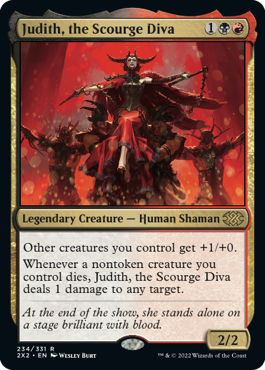
Judith, the Scourge Diva
{1}{B}{R}
Legendary Creature — Human Shaman
2/2
Other creatures you control get +1/+0.
Whenever a nontoken creature you control dies, Judith, the Scourge Diva deals 1 damage to any target.
- Judith's last ability triggers when Judith dies if it's not a token.
- If Judith dies at the same time as one or more other nontoken creatures you control, Judith's ability triggers for each of them.
- If your life total is brought to 0 or less at the same time that nontoken creatures you control are dealt lethal damage, you lose the game before Judith's triggered ability goes on the stack.
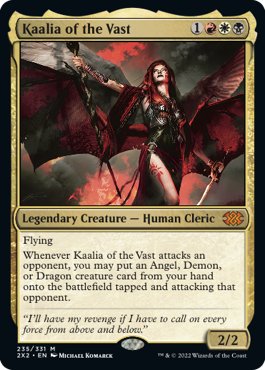
Kaalia of the Vast
{1}{R}{W}{B}
Legendary Creature — Human Cleric
2/2
Flying
Whenever Kaalia of the Vast attacks an opponent, you may put an Angel, Demon, or Dragon creature card from your hand onto the battlefield tapped and attacking that opponent.
- Kaalia's ability doesn't trigger if it attacks a planeswalker.
- Although the creature you put onto the battlefield is an attacking creature, it was never declared as an attacking creature. This means that abilities that trigger whenever a creature attacks won't trigger when it enters the battlefield attacking.
- Any effects that say that the Angel, Demon, or Dragon creature can't attack (such as that of Propaganda or if the creature has defender) affect only the declaration of attackers. They won't stop the creature from entering the battlefield attacking.
- If the opponent Kaalia attacked is no longer in the game when its ability resolves, you may put an Angel, Demon, or Dragon creature card onto the battlefield tapped, but it won't be attacking anyone and it won't be an attacking creature.
- If Kaalia attacks an opponent, the creature enters attacking that player even if Kaalia is somehow attacking a different player or planeswalker as its triggered ability resolves.
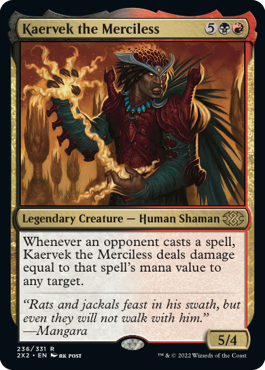
Kaervek the Merciless
{5}{B}{R}
Legendary Creature — Human Shaman
5/4
Whenever an opponent casts a spell, Kaervek the Merciless deals damage equal to that spell's mana value to any target.
- An ability that triggers when a player casts a spell resolves before the spell that caused it to trigger. It resolves even if that spell is countered.
- Alternative costs, additional costs, and cost reductions don't change a spell's mana value. Its mana value is still based on its mana cost.
- For spells with {X} in their mana costs, use the value chosen for X to determine the spell's mana value.
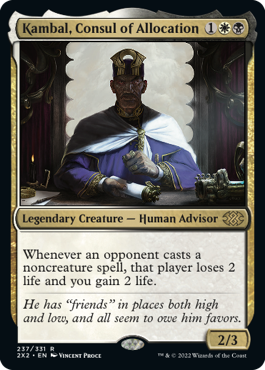
Kambal, Consul of Allocation
{1}{W}{B}
Legendary Creature — Human Advisor
2/3
Whenever an opponent casts a noncreature spell, that player loses 2 life and you gain 2 life.
- Kambal's ability resolves before the spell that caused it to trigger.
- A noncreature spell is a spell that isn't a creature at all. An artifact creature spell isn't a noncreature spell. Lands are never spells.
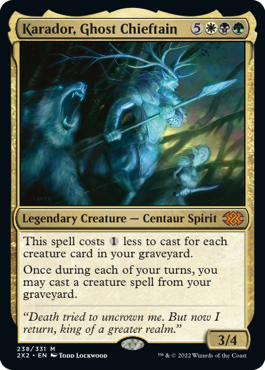
Karador, Ghost Chieftain
{5}{W}{B}{G}
Legendary Creature — Centaur Spirit
3/4
This spell costs {1} less to cast for each creature card in your graveyard.
Once during each of your turns, you may cast a creature spell from your graveyard.
- To determine the total cost of a spell, start with the mana cost or alternative cost you're paying, add any cost increases (such as the commander tax), then apply any cost reductions (such as that of Karador). The mana value of the spell is determined only by its mana cost, no matter what the total cost to cast the spell was.
- You must follow the normal timing permissions and restrictions of the spell you cast from your graveyard.
- You must pay the costs to cast that spell. If it has an alternative cost, you may cast it for that cost instead.
- Once you begin to cast the spell, losing control of Karador won't affect the spell. You can finish casting it as normal.
- If multiple effects allow you to play a card from your graveyard, you must announce which permission you're using as you begin to play the card.
- If you cast one creature spell from your graveyard and then have a new Karador come under your control in the same turn, you may cast another creature spell from your graveyard that turn.
- If a creature card is put into your graveyard during your main phase and the stack is empty, you have a chance to cast it before any player may attempt to remove that card from your graveyard.
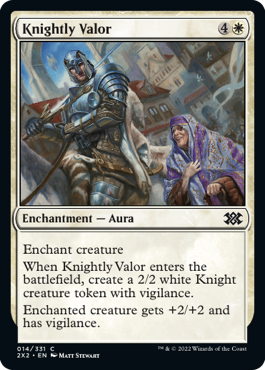
Knightly Valor
{4}{W}
Enchantment — Aura
Enchant creature
When Knightly Valor enters the battlefield, create a 2/2 white Knight creature token with vigilance.
Enchanted creature gets +2/+2 and has vigilance.
- You need a creature for Knightly Valor to target as you cast it. There's no way to have it enter the battlefield attached to the Knight token it'll create.
- If the creature this Aura would enchant is an illegal target by the time Knightly Valor tries to resolve, the Aura spell doesn't resolve. It won't enter the battlefield, so its ability won't trigger.
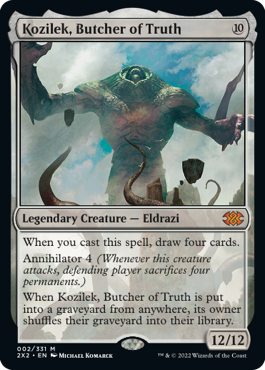
Kozilek, Butcher of Truth
{10}
Legendary Creature — Eldrazi
12/12
When you cast this spell, draw four cards.
Annihilator 4 (Whenever this creature attacks, defending player sacrifices four permanents.)
When Kozilek, Butcher of Truth is put into a graveyard from anywhere, its owner shuffles their graveyard into their library.
- Annihilator abilities trigger and resolve during the declare attackers step. The defending player chooses and sacrifices the required number of permanents before they declare blockers. Any creatures sacrificed this way won't be able to block.
- If a creature with annihilator is attacking a planeswalker, and the defending player chooses to sacrifice that planeswalker, the attacking creature continues to attack. It may be blocked. If it isn't blocked, it simply won't deal combat damage to anything.
- Kozilek's first ability triggers as you cast it, and that ability resolves before the spell itself. It resolves even if the spell is countered.
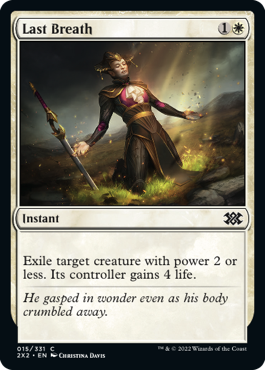
Last Breath
{1}{W}
Instant
Exile target creature with power 2 or less. Its controller gains 4 life.
- If the creature is an illegal target when Last Breath tries to resolve, it won't resolve and none of its effects will happen. Its controller won't gain 4 life.
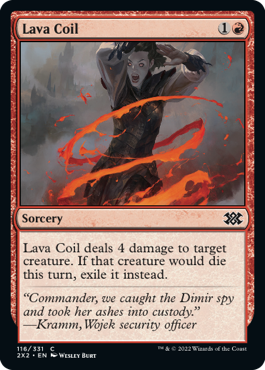
Lava Coil
{1}{R}
Sorcery
Lava Coil deals 4 damage to target creature. If that creature would die this turn, exile it instead.
- Lava Coil's replacement effect will exile the target creature if it would die this turn for any reason, not just due to lethal damage. It applies to the target creature even if Lava Coil deals no damage to it (due to a prevention effect).
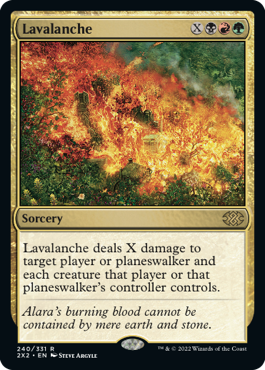
Lavalanche
{X}{B}{R}{G}
Sorcery
Lavalanche deals X damage to target player or planeswalker and each creature that player or that planeswalker's controller controls.
- If the target player or planeswalker has become an illegal target by the time Lavalanche resolves, Lavalanche doesn't resolve. Nothing will be dealt damage.
- Because Lavalanche doesn't target any creatures, it will deal damage to creatures with shroud or hexproof. Any damage it would deal to creatures with appropriate protection abilities will still be prevented, however.
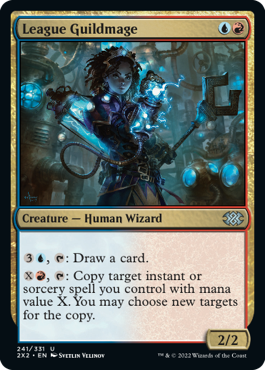
League Guildmage
{U}{R}
Creature — Human Wizard
2/2
{3}{U}, {T}: Draw a card.
{X}{R}, {T}: Copy target instant or sorcery spell you control with mana value X. You may choose new targets for the copy.
- If a spell has {X} in its mana cost, include the value chosen for that X when determining the mana value of that spell.
- League Guildmage's second ability can copy any instant or sorcery spell you control, not just one with targets.
- The copy is created on the stack, so it's not "cast." Abilities that trigger when a player casts a spell won't trigger.
- If you copy a spell, you control the copy. It will resolve before the original spell does.
- The copy will have the same targets as the spell it's copying unless you choose new ones. You may change any number of the targets, including all of them or none of them. If, for one of the targets, you can't choose a new legal target, then it remains unchanged (even if the current target is illegal).
- If the spell that's copied is modal (that is, it says "Choose one —" or the like), the copy will have the same mode. A different mode can't be chosen.
- If the spell that's copied has an X whose value was determined as it was cast (like Banefire does), the copy will have the same value of X.
- If the spell has damage divided as it was cast, the division can't be changed (although the targets receiving that damage still can). The same is true of spells that distribute counters.
- The controller of a copy can't choose to pay any alternative or additional costs for the copy. However, effects based on any alternative or additional costs that were paid for the original spell are copied as though those same costs were paid for the copy.
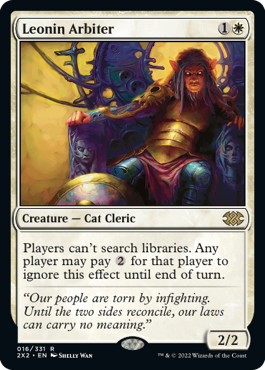
Leonin Arbiter
{1}{W}
Creature — Cat Cleric
2/2
Players can't search libraries. Any player may pay {2} for that player to ignore this effect until end of turn.
- If an effect says "You may search your library
. . . If you do, shuffle" or "You may search your library. . . then shuffle," you can't choose to search, so you won't shuffle. - If an effect says "Search your library
. . . then shuffle," you shuffle your library even though you can't search. - Effects that instruct you to reveal or look at cards from the top of you library will still work. Only effects that use the word "search" are affected.
- Since players who haven't paid {2} can't search, they won't be able to find any cards in a library. The effect applies to all players and all libraries. If a spell or ability's effect has other parts that don't depend on searching for or finding cards, they will still work normally.
- Paying {2} to ignore Leonin Arbiter's effect is a special action. Any player may take this special action any time they have priority. It doesn't use the stack and can't be responded to.
- Paying {2} doesn't let a player pick up a library and search it—it just allows them to ignore Leonin Arbiter's effect that turn. That player can search a library only if another spell or ability instructs them to do so.
- If a player pays {2}, that enables only them to ignore Leonin Arbiter's effect that turn. Each other player is still affected by it.
- A player who has paid {2} may search any library when instructed to do so that turn, not just their own library.
- Once a player has paid {2}, they may search libraries that turn as many times as they are instructed to do so.
- If there are multiple Leonin Arbiters on the battlefield, a player must pay {2} for each one before being able to search libraries that turn.
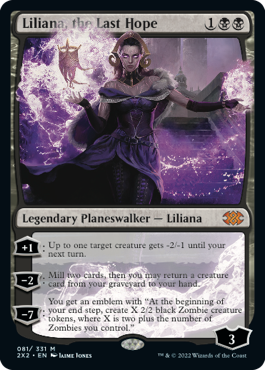
Liliana, the Last Hope
{1}{B}{B}
Legendary Planeswalker — Liliana
3
+1: Up to one target creature gets -2/-1 until your next turn.
−2: Mill two cards, then you may return a creature card from your graveyard to your hand.
−7: You get an emblem with "At the beginning of your end step, create X 2/2 black Zombie creature tokens, where X is two plus the number of Zombies you control."
- You can activate Liliana's first ability without any targets just to add a loyalty counter to her.
- Liliana's second ability doesn't target the card to return to your hand. After putting the top two cards of your library into your graveyard, you may choose from among any creature cards there.
- While resolving the triggered ability of Liliana's emblem, if you control zero Zombies, you'll get two Zombie tokens.
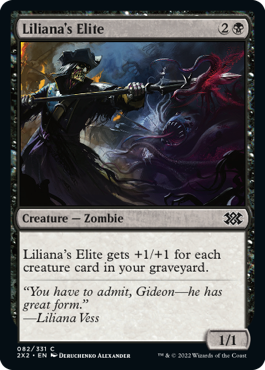
Liliana's Elite
{2}{B}
Creature — Zombie
1/1
Liliana's Elite gets +1/+1 for each creature card in your graveyard.
- The ability applies only while Liliana's Elite is on the battlefield.
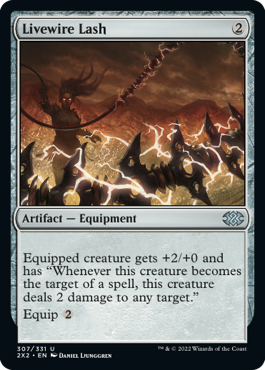
Livewire Lash
{2}
Artifact — Equipment
Equipped creature gets +2/+0 and has "Whenever this creature becomes the target of a spell, this creature deals 2 damage to any target."
Equip {2}
- When the equipped creature becomes the target of a spell, the ability granted to it by Livewire Lash will trigger and go on the stack on top of it. It will resolve before the spell does.
- The equipped creature is the source of both the triggered ability and the resultant damage, not Livewire Lash. For example, you can target and deal damage to a creature with protection from artifacts (assuming the equipped creature isn't an artifact itself, of course).
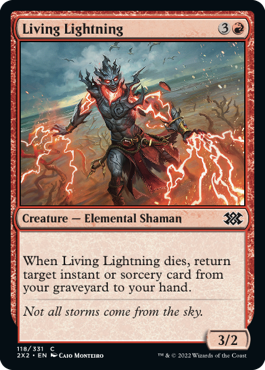
Living Lightning
{3}{R}
Creature — Elemental Shaman
3/2
When Living Lightning dies, return target instant or sorcery card from your graveyard to your hand.
- If an instant or sorcery spell you own causes Living Lightning to die, its ability can target that instant or sorcery card in your graveyard.
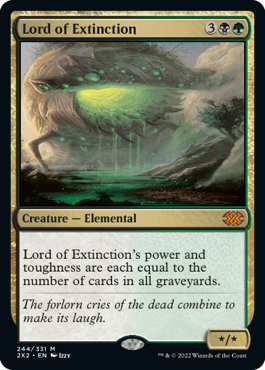
Lord of Extinction
{3}{B}{G}
Creature — Elemental
*/*
Lord of Extinction's power and toughness are each equal to the number of cards in all graveyards.
- The ability that defines Lord of Extinction's power and toughness works in all zones, not just the battlefield. If Lord of Extinction is in your graveyard, it will count itself.
- If an instant or sorcery spell deals damage to Lord of Extinction or lowers its toughness, that spell is put into its owner's graveyard before state-based actions are performed. That card will raise Lord of Extinction's toughness before the game checks to see if it dies.
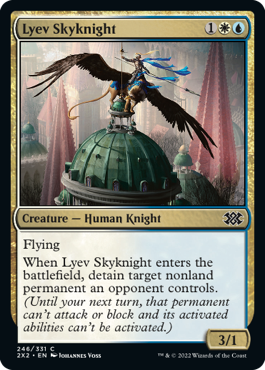
Lyev Skyknight
{1}{W}{U}
Creature — Human Knight
3/1
Flying
When Lyev Skyknight enters the battlefield, detain target nonland permanent an opponent controls. (Until your next turn, that permanent can't attack or block and its activated abilities can't be activated.)
- Activated abilities include a colon and are written in the form "[cost]: [effect]." No one can activate any activated abilities, including mana abilities, of a detained permanent.
- The static abilities of a detained permanent still apply. The triggered abilities of a detained permanent can still trigger.
- If a creature is already attacking or blocking when it's detained, it won't be removed from combat. It will continue to attack or block.
- If a permanent's activated ability is on the stack when that permanent is detained, the ability will be unaffected.
- If a noncreature permanent is detained and later turns into a creature, it won't be able to attack or block.
- When a player leaves a multiplayer game, any continuous effects with durations that last until that player's next turn or until a specific point in that turn will last until that turn would have begun. They neither expire immediately nor last indefinitely.
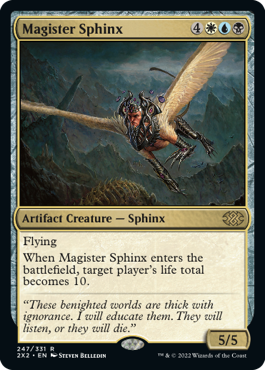
Magister Sphinx
{4}{W}{U}{B}
Artifact Creature — Sphinx
5/5
Flying
When Magister Sphinx enters the battlefield, target player's life total becomes 10.
- This ability is not optional.
- For a player's life total to become 10, what actually happens is that the player gains or loses the appropriate amount of life. For example, if the targeted player's life total is 4 when this ability resolves, it will cause that player to gain 6 life; alternately, if the targeted player's life total is 17 when this ability resolves, it will cause that player to lose 7 life. Other cards that interact with life gain or life loss will interact with this effect accordingly.
- In a Two-Headed Giant game, this ability basically causes the team's life total to become 10, but only the targeted player is considered to have actually gained or lost life.
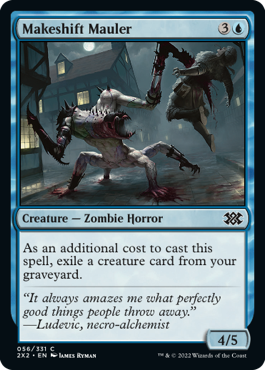
Makeshift Mauler
{3}{U}
Creature — Zombie Horror
4/5
As an additional cost to cast this spell, exile a creature card from your graveyard.
- You must exile exactly one creature card from your graveyard to cast this spell; you cannot cast it without exiling a creature card, and you cannot exile additional creature cards.
- Players can only respond once this spell has been cast and all its costs have been paid. No one can try to otherwise remove the creature card you exiled in order to prevent you from casting this spell.
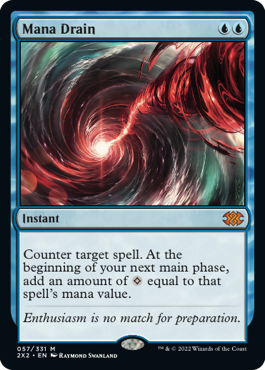
Mana Drain
{U}{U}
Instant
Counter target spell. At the beginning of your next main phase, add an amount of {C} equal to that spell's mana value.
- If the target spell is an illegal target by the time Mana Drain tries to resolve, Mana Drain doesn't resolve. You don't add mana at the beginning of your next main phase. If the target is legal but not countered (most likely because an effect says that the spell can't be countered), you do add mana.
- Mana Drain's delayed triggered ability will usually trigger at the beginning of your precombat main phase. However, if you cast Mana Drain during your precombat main phase or during your combat phase, its delayed triggered ability will trigger at the beginning of that turn's postcombat main phase.
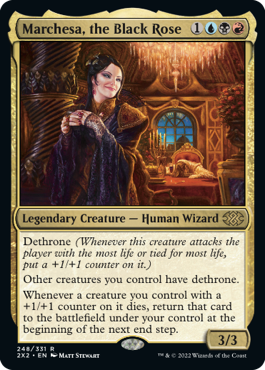
Marchesa, the Black Rose
{1}{U}{B}{R}
Legendary Creature — Human Wizard
3/3
Dethrone (Whenever this creature attacks the player with the most life or tied for most life, put a +1/+1 counter on it.)
Other creatures you control have dethrone.
Whenever a creature you control with a +1/+1 counter on it dies, return that card to the battlefield under your control at the beginning of the next end step.
- If a creature has multiple instances of dethrone, each triggers separately.
- If the creature card leaves the graveyard before the delayed triggered ability resolves, that card won't return to the battlefield, even if it's back in the graveyard when the delayed triggered ability resolves.
- If Marchesa has a +1/+1 counter on it when it dies, it will return to the battlefield under your control because of its own ability.
- Dethrone doesn't trigger if the creature attacks a planeswalker, even if its controller has the most life.
- Once dethrone triggers, it doesn't matter what happens to the players' life totals before the ability resolves. You'll put a +1/+1 counter on the creature even if the defending player doesn't have the most life as the ability resolves.
- The +1/+1 counter is put on the creature before blockers are declared.
- In a Two-Headed Giant game, dethrone will trigger if the creature attacks either player on the team with the most life or tied for the most life.
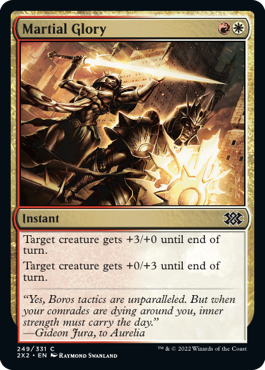
Martial Glory
{R}{W}
Instant
Target creature gets +3/+0 until end of turn.
Target creature gets +0/+3 until end of turn.
- You may choose the same creature for both targets since the card says "target creature" multiple times. You may also choose two different creatures.
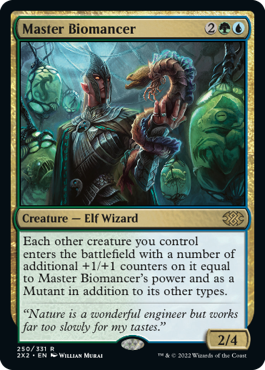
Master Biomancer
{2}{G}{U}
Creature — Elf Wizard
2/4
Each other creature you control enters the battlefield with a number of additional +1/+1 counters on it equal to Master Biomancer's power and as a Mutant in addition to its other types.
- To determine how many additional +1/+1 counters a creature enters the battlefield with, use Master Biomancer's power as that creature is entering the battlefield.
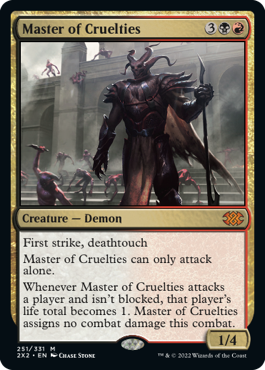
Master of Cruelties
{3}{B}{R}
Creature — Demon
1/4
First strike, deathtouch
Master of Cruelties can only attack alone.
Whenever Master of Cruelties attacks a player and isn't blocked, that player's life total becomes 1. Master of Cruelties assigns no combat damage this combat.
- An ability that triggers when something "attacks and isn't blocked" triggers in the declare blockers step after blockers are declared if (1) that creature is attacking and (2) no creatures are declared to block it. It will trigger even if that creature was put onto the battlefield attacking rather than having been declared as an attacker in the declare attackers step.
- Master of Cruelties isn't forced to attack, but if it does, it must do so alone. If you control another creature with an ability that says it must attack if able, that creature must attack and Master of Cruelties won't be able to.
- If Master of Cruelties attacks alone, another creature entering the battlefield attacking will have no effect on it. Master of Cruelties continues to be an attacking creature. The other attacking creature will assign combat damage normally, regardless of whether Master of Cruelties's last ability triggers.
- Master of Cruelties's last ability won't trigger if it attacks a planeswalker.
- For a player's life total to become 1, what actually happens is that the player loses (or in some rare cases, gains) the appropriate amount of life. For example, if the player's life total is 4 when the last ability resolves, it will cause that player to lose 3 life. Other effects that interact with life loss (or gain) will interact with this effect accordingly.
- Assigning no combat damage isn't the same as preventing that damage. Effects that make damage unpreventable will have no effect if no combat damage can be assigned.
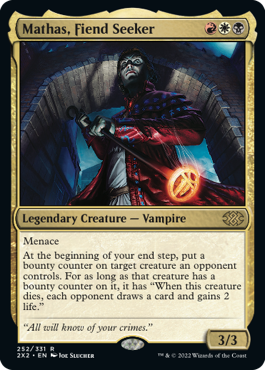
Mathas, Fiend Seeker
{R}{W}{B}
Legendary Creature — Vampire
3/3
Menace
At the beginning of your end step, put a bounty counter on target creature an opponent controls. For as long as that creature has a bounty counter on it, it has "When this creature dies, each opponent draws a card and gains 2 life."
- The target creature that gets a bounty counter still has the triggered ability it gains even if Mathas leaves the battlefield.
- Creatures that receive a bounty counter other than from Mathas's ability resolving won't gain the triggered ability. Creatures that receive more than one bounty counter as Mathas's ability resolves (most likely due to Doubling Season) won't have the ability multiple times.
- If Mathas's ability resolves two separate times targeting the same creature, that creature will have two instances of the triggered ability. Each triggers separately when that creature dies.
- The opponents who each draw a card and gain 2 life are the opponents of the player who controlled the creature as it died. This may not be the player who controlled the creature when it received a bounty counter.
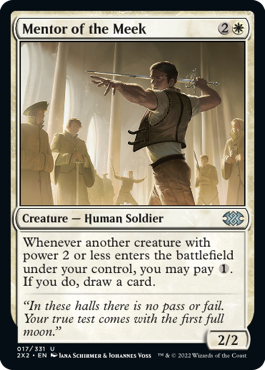
Mentor of the Meek
{2}{W}
Creature — Human Soldier
2/2
Whenever another creature with power 2 or less enters the battlefield under your control, you may pay {1}. If you do, draw a card.
- Mentor of the Meek's ability checks the power of the other creature only as it enters the battlefield. If that creature's power is 2 or less, the ability will trigger. Once the ability triggers, raising that creature's power above 2 won't affect that ability. Similarly, reducing the creature's power to 2 or less after it enters the battlefield won't cause the ability to trigger.
- Apply power bonuses from counters the creature enters the battlefield with and continuous effects such as that of Valiant Knight before checking to see if Mentor of the Meek's ability will trigger.
- While resolving the triggered ability of Mentor of the Meek, you can't pay {1} multiple times to draw more than one card.
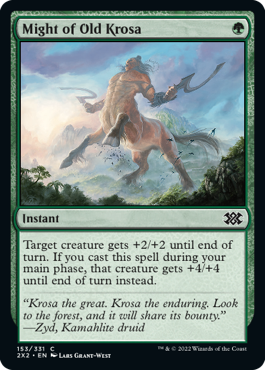
Might of Old Krosa
{G}
Instant
Target creature gets +2/+2 until end of turn. If you cast this spell during your main phase, that creature gets +4/+4 until end of turn instead.
- If an effect copies Might of Old Krosa while it's on the stack, the copy will give the creature only +2/+2, even if the original spell was cast during your main phase. This is because the copy is created on the stack and wasn't cast at all.
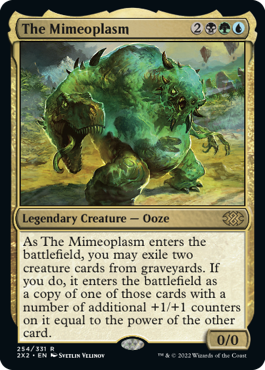
The Mimeoplasm
{2}{B}{G}{U}
Legendary Creature — Ooze
0/0
As The Mimeoplasm enters the battlefield, you may exile two creature cards from graveyards. If you do, it enters the battlefield as a copy of one of those cards with a number of additional +1/+1 counters on it equal to the power of the other card.
- You can't choose to exile just one creature card.
- The two creature cards may come from the same graveyard or different graveyards.
- You choose which one The Mimeoplasm is copying and which one determines how many +1/+1 counters are placed on The Mimeoplasm as The Mimeoplasm enters the battlefield.
- Treat The Mimeoplasm as though it were the creature card it's copying entering the battlefield. Any "As [this creature] enters the battlefield," "[This creature] enters the battlefield with," and "When [this creature] enters the battlefield" abilities of that card will work.
- Specifically, if The Mimeoplasm enters the battlefield as a copy of a creature card that enters the battlefield with a number of +1/+1 counters, The Mimeoplasm will enter the battlefield with those +1/+1 counters and +1/+1 counters equal to the power of the other exiled card.
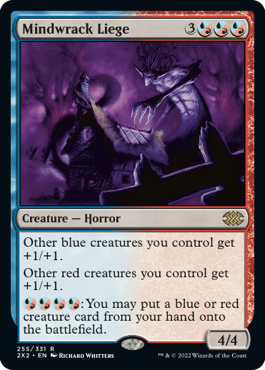
Mindwrack Liege
{3}{U/R}{U/R}{U/R}
Creature — Horror
4/4
Other blue creatures you control get +1/+1.
Other red creatures you control get +1/+1.
{U/R}{U/R}{U/R}{U/R}: You may put a blue or red creature card from your hand onto the battlefield.
- The first two abilities are separate and cumulative. If another creature you control is both of the listed colors, it will get a total of +2/+2.
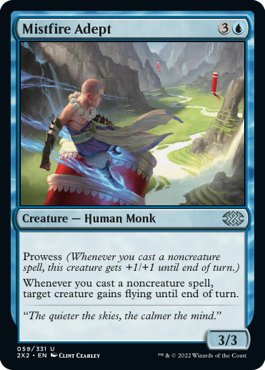
Mistfire Adept
{3}{U}
Creature — Human Monk
3/3
Prowess (Whenever you cast a noncreature spell, this creature gets +1/+1 until end of turn.)
Whenever you cast a noncreature spell, target creature gains flying until end of turn.
- Casting a noncreature spell will cause both prowess and Mistfire Adept's other ability to trigger. You can put these abilities on the stack in either order. Whichever ability is put on the stack last will resolve first.
- See also "Returning Keyword Ability: Prowess" in the General Notes section.
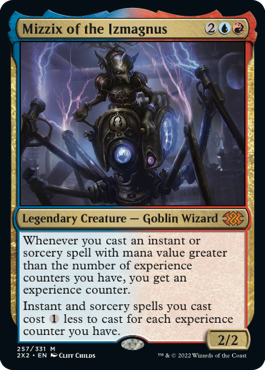
Mizzix of the Izmagnus
{2}{U}{R}
Legendary Creature — Goblin Wizard
2/2
Whenever you cast an instant or sorcery spell with mana value greater than the number of experience counters you have, you get an experience counter.
Instant and sorcery spells you cast cost {1} less to cast for each experience counter you have.
- You finish casting a spell, including paying its costs, before Mizzix's first ability triggers. The ability that gives you the experience counter will resolve before the spell that caused it to trigger.
- Mizzix's last ability doesn't change the mana cost or mana value of any spell. It changes only the total cost you pay.
- Mizzix's last ability can't reduce the amount of colored mana you pay for a spell. It reduces only the generic component of that cost.
- If there are additional costs to cast a spell, or if the cost to cast a spell is increased by an effect (such as the one created by Thalia, Guardian of Thraben's ability), apply those increases before applying cost reductions.
- The cost reduction can apply to alternative costs such as flashback costs.
- If an instant or sorcery spell you cast has {X} in its mana cost, you choose the value of X before calculating the spell's total cost. For example, if that spell's mana cost is {X}{R} and you have one experience counter, you could choose 5 as the value of X and pay {4}{R} to cast the spell.
- All experience counters are identical, no matter how you got them. For example, the last ability will count experience counters that you got from the first ability, from another ability, from proliferating, and so on.
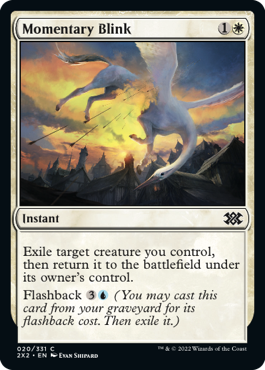
Momentary Blink
{1}{W}
Instant
Exile target creature you control, then return it to the battlefield under its owner's control.
Flashback {3}{U} (You may cast this card from your graveyard for its flashback cost. Then exile it.)
- When the card returns to the battlefield, it will be a new object with no connection to the card that was exiled. Auras attached to the exiled creature will be put into their owners' graveyards. Any Equipment will become unattached and remain on the battlefield. Any counters on the exiled creature will cease to exist.
- If a token is exiled this way, it will cease to exist and won't return to the battlefield.
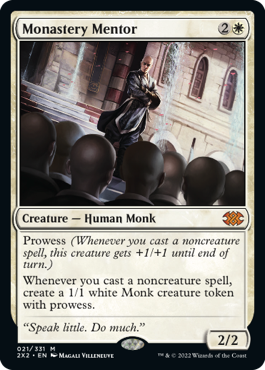
Monastery Mentor
{2}{W}
Creature — Human Monk
2/2
Prowess (Whenever you cast a noncreature spell, this creature gets +1/+1 until end of turn.)
Whenever you cast a noncreature spell, create a 1/1 white Monk creature token with prowess.
- Casting a noncreature spell will cause both prowess and Monastery Mentor's other ability to trigger. You can put these abilities on the stack in either order. Whichever ability is put on the stack last will resolve first.
- The spell that causes Monastery Mentor's second ability to trigger will not cause the prowess ability of the Monk token that's created to trigger.
- See also "Returning Keyword Ability: Prowess" in the General Notes section.
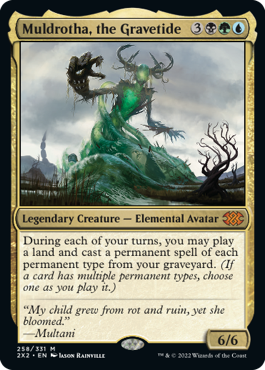
Muldrotha, the Gravetide
{3}{B}{G}{U}
Legendary Creature — Elemental Avatar
6/6
During each of your turns, you may play a land and cast a permanent spell of each permanent type from your graveyard. (If a card has multiple permanent types, choose one as you play it.)
- For example, you may cast an artifact creature spell as your artifact spell and cast another artifact creature spell as your creature spell.
- You must follow the normal timing permissions and restrictions of the cards you play from your graveyard. For example, you can't use Muldrotha to play a land if you don't have an available land play or to cast a planeswalker spell during your end step.
- You must pay the costs to cast a spell this way. If it has an alternative cost, you may cast it for that cost instead.
- Once you begin to cast a spell, losing control of Muldrotha won't affect the spell.
- If you play a card from your graveyard and then have a new Muldrotha come under your control in the same turn, you may play another land or spell of that type from your graveyard that turn.
- If a permanent card is put into your graveyard during your main phase and the stack is empty, you have a chance to cast it before any player may attempt to remove that card from your graveyard.
- If multiple effects allow you to play a card from your graveyard, you must announce which permission you're using as you begin to play the card.
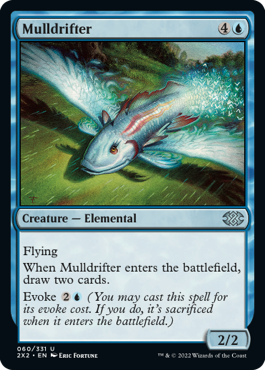
Mulldrifter
{4}{U}
Creature — Elemental
2/2
Flying
When Mulldrifter enters the battlefield, draw two cards.
Evoke {2}{U} (You may cast this spell for its evoke cost. If you do, it's sacrificed when it enters the battlefield.)
- To determine the total cost of a spell, start with the mana cost or alternative cost you're paying (such as an evoke cost), add any cost increases, then apply any cost reductions. The mana value of the spell is determined by only its mana cost, no matter what the total cost to cast that spell was.
- If you pay the evoke cost, you can have Mulldrifter's own triggered ability resolve before the evoke triggered ability. You can cast spells after that ability resolves but before you have to sacrifice Mulldrifter.
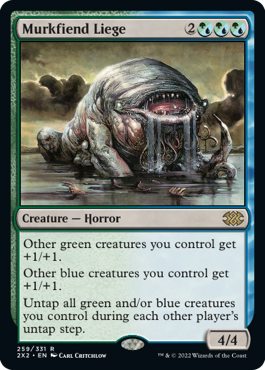
Murkfiend Liege
{2}{G/U}{G/U}{G/U}
Creature — Horror
4/4
Other green creatures you control get +1/+1.
Other blue creatures you control get +1/+1.
Untap all green and/or blue creatures you control during each other player's untap step.
- The first two abilities are separate and cumulative. If another creature you control is both of the listed colors, it will get a total of +2/+2.
- All your green and/or blue creatures untap during each other player's untap step. You have no choice about what untaps. Those creatures untap at the same time as the active player's permanents.
- During each other player's untap step, effects that would otherwise cause green and/or blue creatures you control to stay tapped don't apply because they only apply during your untap step. For example, if you control Nettle Sentinel (a green creature that says "Nettle Sentinel doesn't untap during your untap step"), you untap it during each other player's untap step.
- Multiple Murkfiend Lieges are redundant when it comes to the untap effect. You can't untap your permanents more than once in a single untap step.
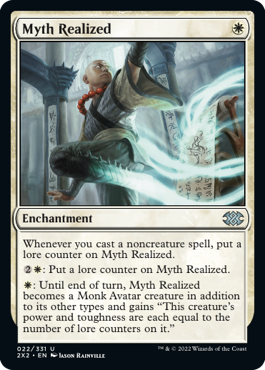
Myth Realized
{W}
Enchantment
Whenever you cast a noncreature spell, put a lore counter on Myth Realized.
{2}{W}: Put a lore counter on Myth Realized.
{W}: Until end of turn, Myth Realized becomes a Monk Avatar creature in addition to its other types and gains "This creature's power and toughness are each equal to the number of lore counters on it."
- Myth Realized can't attack the turn it enters the battlefield.
- Activating the ability that turns Myth Realized into a creature while it's already a creature will override any effects that set its power or toughness to a specific value. Effects that modify power or toughness without directly setting them to a specific value will continue to apply.
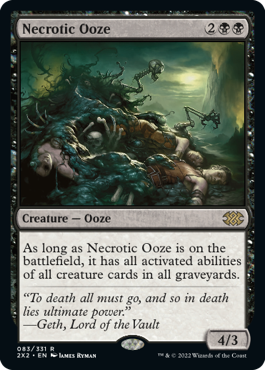
Necrotic Ooze
{2}{B}{B}
Creature — Ooze
4/3
As long as Necrotic Ooze is on the battlefield, it has all activated abilities of all creature cards in all graveyards.
- Necrotic Ooze gains only activated abilities. It doesn't gain keyword abilities (unless those keyword abilities are activated), triggered abilities, or static abilities.
- Activated abilities contain a colon. They're generally written "[Cost]: [Effect]." Some keywords are activated abilities; they have colons in their reminder text.
- If an activated ability of a card in a graveyard references the card it's printed on by name, treat Necrotic Ooze's version of that ability as though it referenced Necrotic Ooze by name instead. For example, if Cudgel Troll (which says "{G}: Regenerate Cudgel Troll") is in a graveyard, Necrotic Ooze has the ability "{G}: Regenerate Necrotic Ooze."
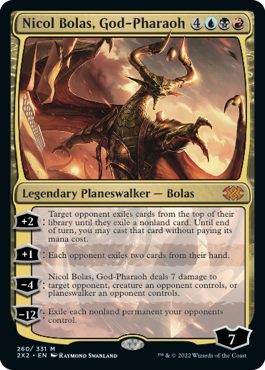
Nicol Bolas, God-Pharaoh
{4}{U}{B}{R}
Legendary Planeswalker — Bolas
7
+2: Target opponent exiles cards from the top of their library until they exile a nonland card. Until end of turn, you may cast that card without paying its mana cost.
+1: Each opponent exiles two cards from their hand.
−4: Nicol Bolas, God-Pharaoh deals 7 damage to target opponent, creature an opponent controls, or planeswalker an opponent controls.
−12: Exile each nonland permanent your opponents control.
- The cards exiled by Nicol Bolas's first and second abilities are exiled face up.
- You may cast the nonland card exiled by Nicol Bolas's first ability that turn even if Nicol Bolas is no longer on the battlefield or under your control.
- Casting the card exiled with Nicol Bolas's first ability follows the normal timing rules for casting that card. For example, if the card is a creature card, you can cast that card only during your main phase while the stack is empty.
- If you don't cast the card exiled by Nicol Bolas's first ability that turn, it will remain exiled.
- If you cast a card "without paying its mana cost," you can't choose to cast it for any alternative costs, such as evoke costs. You can, however, pay additional costs. If the card has any mandatory additional costs, such as that of Tormenting Voice, you must pay those to cast the card.
- If the card has {X} in its mana cost, you must choose 0 as the value of X when casting it without paying its mana cost.
- While resolving Nicol Bolas's second ability, each opponent chooses which cards to exile from their hand. Any opponent with two or fewer cards exiles their entire hand.
- In a multiplayer game, if a player leaves the game, all cards that player owns leave as well, and any effects that gave that player control of any spells or permanents end. If that player controlled any spells or permanents that they cast using Nicol Bolas's first ability, those cards are exiled.
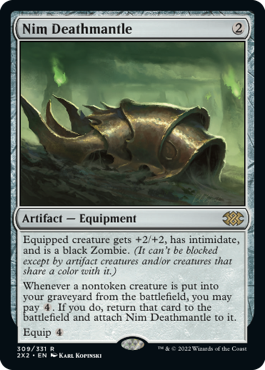
Nim Deathmantle
{2}
Artifact — Equipment
Equipped creature gets +2/+2, has intimidate, and is a black Zombie. (It can't be blocked except by artifact creatures and/or creatures that share a color with it.)
Whenever a nontoken creature is put into your graveyard from the battlefield, you may pay {4}. If you do, return that card to the battlefield and attach Nim Deathmantle to it.
Equip {4}
- Once Nim Deathmantle returns a card from your graveyard to the battlefield, that card will remain on the battlefield indefinitely, even if Nim Deathmantle becomes unattached from it.
- Nim Deathmantle's color-changing and type-changing effects override the equipped creature's previous colors and creature types. After Nim Deathmantle becomes equipped to a creature, that creature will be a black Zombie, not any other colors or creature types.
- Nim Deathmantle causes the equipped creature to be a black Zombie even if it didn't return that creature to the battlefield from the graveyard.
- Once Nim Deathmantle becomes unattached from a creature, its color-changing and type-changing effects stop affecting that creature. The creature will no longer be black and will no longer be a Zombie (unless its printed characteristics or some other effects still cause it to be black and/or a Zombie, of course). This is true even if Nim Deathmantle returned that creature to the battlefield from the graveyard.
- You choose whether to pay {4} as Nim Deathmantle's second ability resolves. Although players may respond to this ability, once it begins to resolve and you decide whether to pay, it's too late for players to respond.
- If the nontoken creature that caused Nim Deathmantle's second ability to trigger is somehow removed from your graveyard before that ability resolves, you may still pay {4} as it resolves. Even if you do, however, no card will be returned to the battlefield.
- Nim Deathmantle's second ability may return a card it can't equip to the battlefield. For example, if a nontoken artifact that's become a creature is put into your graveyard from the battlefield, Nim Deathmantle's second ability triggers. If you pay {4} as it resolves, you'll return that card to the battlefield. However, Nim Deathmantle can't equip it, so Nim Deathmantle remains attached to whatever it was already equipping (or, if it was unattached, it remains so). The same is true if a nontoken creature with protection from artifacts is put into your graveyard from the battlefield, for example.
- If multiple nontoken creatures are put into your graveyard from the battlefield at the same time, Nim Deathmantle's second ability triggers that many times. You put the triggered abilities on the stack in any order, so you'll determine in which order they resolve. If you pay {4} more than once, each card you paid {4} for will end up on the battlefield under your control, and Nim Deathmantle will end up attached to the last card that returned to the battlefield this way that it could equip.
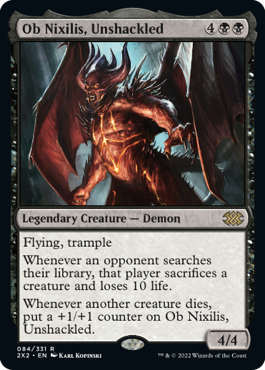
Ob Nixilis, Unshackled
{4}{B}{B}
Legendary Creature — Demon
4/4
Flying, trample
Whenever an opponent searches their library, that player sacrifices a creature and loses 10 life.
Whenever another creature dies, put a +1/+1 counter on Ob Nixilis, Unshackled.
- Ob Nixilis's first triggered ability won't trigger if you search an opponent's library or if an opponent searches another player's library.
- If the opponent controls no creatures when the first triggered ability resolves, that player still loses 10 life.
- The first triggered ability won't be put on the stack until after the spell or ability causing the opponent to search their library finishes resolving. Notably, if that spell or ability causes any other abilities to trigger (for example, if the opponent searched for a creature card and put it onto the battlefield), those abilities and Ob Nixilis's triggered ability will go on the stack together. The active player puts all of their abilities on the stack in any order, then each other player in turn order does the same. The last ability put onto the stack this way will be the first to resolve, and so on.
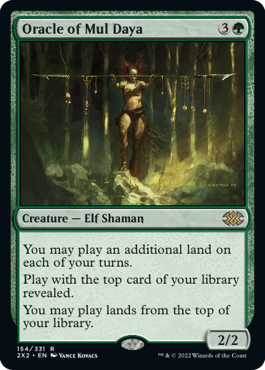
Oracle of Mul Daya
{3}{G}
Creature — Elf Shaman
2/2
You may play an additional land on each of your turns.
Play with the top card of your library revealed.
You may play lands from the top of your library.
- If you control more than one Oracle of Mul Daya, the effects of their first abilities are cumulative. If you control two, for example, you can play three lands on your turn.
- Oracle of Mul Daya doesn't change the times when you can play a land card from the top of your library. You can play a land only during your main phase when you have priority and the stack is empty. Doing so counts as one of your land plays for the turn.
- If you play your first land of the turn from the top of your library, and the new top card is another land card, you can play that one too.
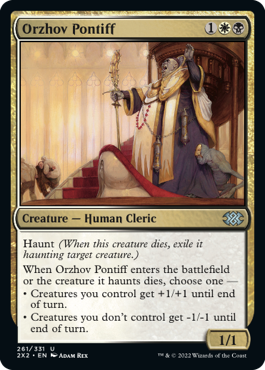
Orzhov Pontiff
{1}{W}{B}
Creature — Human Cleric
1/1
Haunt (When this creature dies, exile it haunting target creature.)
When Orzhov Pontiff enters the battlefield or the creature it haunts dies, choose one —
• Creatures you control get +1/+1 until end of turn.
• Creatures you don't control get -1/-1 until end of turn.
- The mode chosen when this creature enters the battlefield may be different than the mode chosen when the creature it haunts dies.
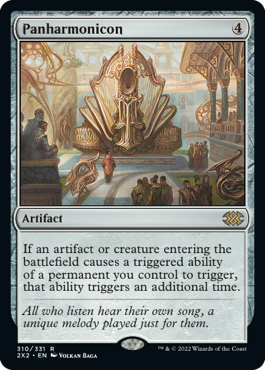
Panharmonicon
{4}
Artifact
If an artifact or creature entering the battlefield causes a triggered ability of a permanent you control to trigger, that ability triggers an additional time.
- Panharmonicon affects a permanent's own enters-the-battlefield triggered abilities as well as other triggered abilities that trigger when that permanent enters the battlefield. Such triggered abilities start with "when" or "whenever."
- Replacement effects are unaffected by Panharmonicon's ability. For example, a creature that enters the battlefield with one +1/+1 counter on it won't receive an additional +1/+1 counter.
- Abilities that apply "as [this artifact or creature] enters the battlefield," such as choosing a color with Gauntlet of Power, are also unaffected.
- You don't need to control the permanent entering the battlefield, only the permanent that has the triggered ability.
- Panharmonicon's effect doesn't copy the triggered ability; it just causes the ability to trigger twice. Any choices made as you put the ability onto the stack, such as modes and targets, are made separately for each instance of the ability. Any choices made on resolution, such as whether to put counters on a permanent, are also made individually.
- If you control two Panharmonicons, an artifact or creature entering the battlefield causes abilities to trigger three times, not four. A third Panharmonicon causes abilities to trigger four times, a fourth causes abilities to trigger five times, and so on.
- If an artifact or creature entering the battlefield at the same time as Panharmonicon (including Panharmonicon itself) causes a triggered ability of a permanent you control to trigger, that ability triggers an additional time.
- If a triggered ability is linked to a second ability, additional instances of that triggered ability are also linked to that second ability. If the second ability refers to "the exiled card," it refers to all cards exiled by instances of the triggered ability.
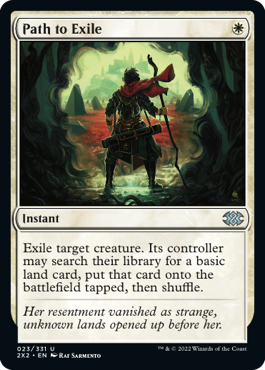
Path to Exile
{W}
Instant
Exile target creature. Its controller may search their library for a basic land card, put that card onto the battlefield tapped, then shuffle.
- If the target creature is an illegal target by the time Path to Exile tries to resolve, the spell won't resolve. The creature's controller won't search for a basic land card.
- The controller of the exiled creature isn't required to search their library for a basic land. If that player doesn't, the player won't shuffle their library.
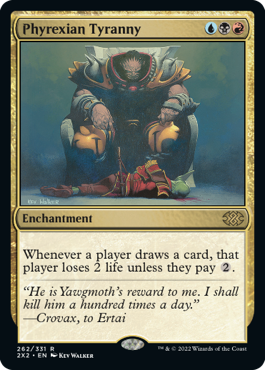
Phyrexian Tyranny
{U}{B}{R}
Enchantment
Whenever a player draws a card, that player loses 2 life unless they pay {2}.
- If a player is instructed to draw multiple cards, that player draws all of them before deciding how many times to pay for Phyrexian Tyranny's triggered ability.
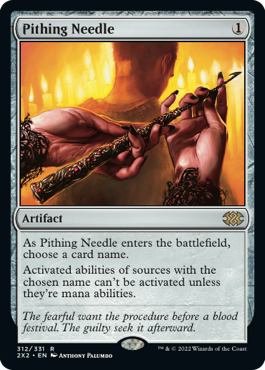
Pithing Needle
{1}
Artifact
As Pithing Needle enters the battlefield, choose a card name.
Activated abilities of sources with the chosen name can't be activated unless they're mana abilities.
- Once Pithing Needle has left the battlefield, activated abilities of sources with the chosen name can be activated again.
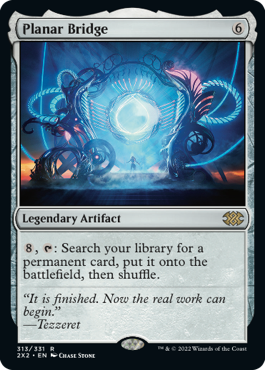
Planar Bridge
{6}
Legendary Artifact
{8}, {T}: Search your library for a permanent card, put it onto the battlefield, then shuffle.
- A permanent card is an artifact, creature, enchantment, land, or planeswalker card.
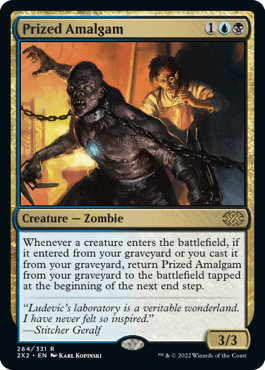
Prized Amalgam
{1}{U}{B}
Creature — Zombie
3/3
Whenever a creature enters the battlefield, if it entered from your graveyard or you cast it from your graveyard, return Prized Amalgam from your graveyard to the battlefield tapped at the beginning of the next end step.
- A card cast using its madness ability is cast from exile, not from your graveyard.
- Prized Amalgam's ability triggers only if it's in your graveyard immediately after an appropriate creature enters the battlefield. A Prized Amalgam that's already on the battlefield won't be returned at the beginning of the next end step if it's put into your graveyard later.
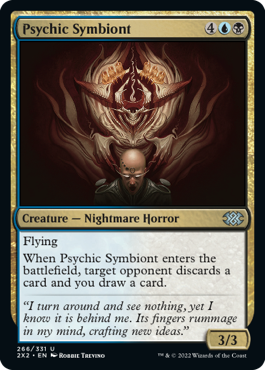
Psychic Symbiont
{4}{U}{B}
Creature — Nightmare Horror
3/3
Flying
When Psychic Symbiont enters the battlefield, target opponent discards a card and you draw a card.
- Psychic Symbiont's last ability can target an opponent with no cards in hand. You'll draw a card even if no opponent discards a card.
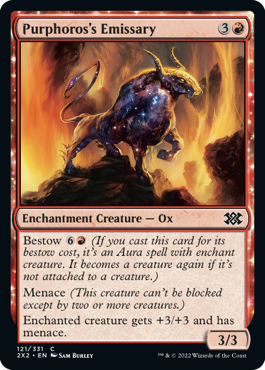
Purphoros's Emissary
{3}{R}
Enchantment Creature — Ox
3/3
Bestow {6}{R} (If you cast this card for its bestow cost, it's an Aura spell with enchant creature. It becomes a creature again if it's not attached to a creature.)
Menace (This creature can't be blocked except by two or more creatures.)
Enchanted creature gets +3/+3 and has menace.
- On the stack, a spell with bestow is either a creature spell or an Aura spell. It's never both, although it's an enchantment spell in either case.
- Unlike other Aura spells, an Aura spell with bestow isn't countered if its target is illegal as it begins to resolve. Rather, the effect making it an Aura spell ends, it loses enchant creature, it returns to being an enchantment creature spell, and it resolves and enters the battlefield as an enchantment creature.
- Unlike other Auras, an Aura with bestow isn't put into its owner's graveyard if it becomes unattached. Rather, the effect making it an Aura ends, it loses enchant creature, and it remains on the battlefield as an enchantment creature. It can attack (and its {T} abilities can be activated, if it has any) on the turn it becomes unattached if it's been under your control continuously, even as an Aura, since your most recent turn began.
- If a permanent with bestow enters the battlefield by any method other than being cast, it will be an enchantment creature. You can't choose to pay the bestow cost and have it become an Aura.
- Auras attached to a creature don't become tapped when the creature becomes tapped. Except in some rare cases, an Aura with bestow remains untapped when it becomes unattached and becomes a creature.
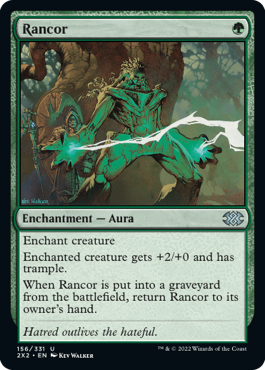
Rancor
{G}
Enchantment — Aura
Enchant creature
Enchanted creature gets +2/+0 and has trample.
When Rancor is put into a graveyard from the battlefield, return Rancor to its owner's hand.
- If the creature this Aura would enchant is an illegal target by the time Rancor tries to resolve, the Aura spell doesn't resolve. It won't enter the battlefield, so it won't be put into a graveyard from the battlefield and its ability won't trigger.
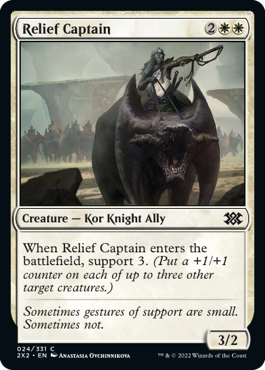
Relief Captain
{2}{W}{W}
Creature — Kor Knight Ally
3/2
When Relief Captain enters the battlefield, support 3. (Put a +1/+1 counter on each of up to three other target creatures.)
- You can't put more than one +1/+1 counter on any one target using the support action.
- Support can target a creature you don't control.
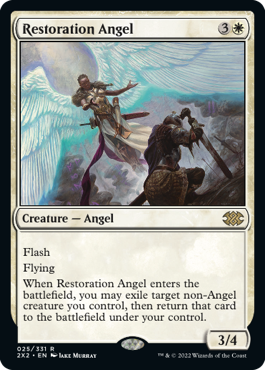
Restoration Angel
{3}{W}
Creature — Angel
3/4
Flash
Flying
When Restoration Angel enters the battlefield, you may exile target non-Angel creature you control, then return that card to the battlefield under your control.
- Once the exiled creature returns, it's considered a new object with no relation to the object that it was. Auras attached to the exiled creature will be put into their owners' graveyards. Equipment attached to the exiled creature will become unattached and remain on the battlefield. Any counters on the exiled creature will cease to exist.
- If a token is exiled this way, it will cease to exist and won't return to the battlefield.
- When an effect returns the exiled card "under your control," you control it indefinitely after that. If you had temporarily gained control of a creature, it won't return to its previous controller. In a multiplayer game, if a player leaves the game, all cards that player owns leave as well. If you leave the game, a creature you took with Restoration Angel's effect is exiled.
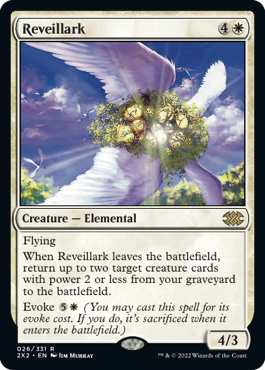
Reveillark
{4}{W}
Creature — Elemental
4/3
Flying
When Reveillark leaves the battlefield, return up to two target creature cards with power 2 or less from your graveyard to the battlefield.
Evoke {5}{W} (You may cast this spell for its evoke cost. If you do, it's sacrificed when it enters the battlefield.)
- Reveillark's ability may target zero, one, or two creature cards in your graveyard. Each target must have power 2 or less.
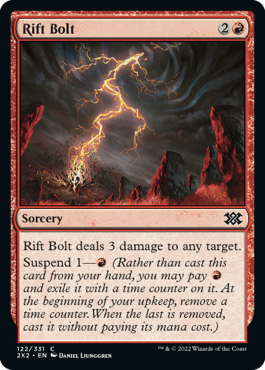
Rift Bolt
{2}{R}
Sorcery
Rift Bolt deals 3 damage to any target.
Suspend 1—{R} (Rather than cast this card from your hand, you may pay {R} and exile it with a time counter on it. At the beginning of your upkeep, remove a time counter. When the last is removed, cast it without paying its mana cost.)
- Suspend is a keyword that represents three abilities. The first is a static ability that allows you to exile the card from your hand with the specified number of time counters (the number before the dash) on it by paying its suspend cost (listed after the dash). The second is a triggered ability that removes a time counter from the suspended card at the beginning of each of your upkeeps. The third is a triggered ability that causes you to cast the card when the last time counter is removed. If you cast a creature spell this way, it gains haste until you lose control of that creature (or, in rare cases, you lose control of the creature spell while it's on the stack).
- You can exile a card in your hand using suspend any time you could cast that card. Consider its card type, any effects that modify when you could cast it (such as flash) and any other effects that stop you from casting it (such as from Meddling Mage's ability) to determine if and when you can do this. Whether you could actually complete all steps in casting the card is irrelevant. For example, you can exile a card with suspend that has no mana cost or that requires a target even if no legal targets are available at that time.
- Cards exiled with suspend are exiled face up.
- Exiling a card with suspend isn't casting that card. This action doesn't use the stack and can't be responded to.
- If the spell requires any targets, those targets are chosen when the spell is finally cast, not when it's exiled.
- If the first triggered ability of suspend (the one that removes time counters) is countered, no time counter is removed. The ability will trigger again at the beginning of the card's owner's next upkeep.
- When the last time counter is removed, the second triggered ability of suspend (the one that lets you cast the card) triggers. It doesn't matter why the last time counter was removed or what effect removed it.
- If the second triggered ability is countered, the card can't be cast. It remains exiled with no time counters on it, and it's no longer suspended.
- As the second triggered ability resolves, you must cast the card if able. You must do so even if it requires targets and the only legal targets are ones that you really don't want to target. Timing permissions based on the card's type are ignored.
- If you can't cast the card, perhaps because there are no legal targets available, it remains exiled with no time counters on it, and it's no longer suspended.
- If you cast a card "without paying its mana cost," such as with suspend, you can't choose to cast it for any alternative costs. You can, however, pay additional costs. If the card has any mandatory additional costs, you must pay those if you want to cast the card.
- You are never forced to activate mana abilities to pay costs, so if there is a mandatory additional mana cost (such as from Thalia, Guardian of Thraben), you can decline to activate mana abilities to pay for it and hence fail to cast the suspended card, leaving it in exile.
- If the card has {X} in its mana cost, you must choose 0 as the value of X when casting it without paying its mana cost.
- The mana value of a spell cast without paying its mana cost is determined by its mana cost, even though that cost wasn't paid.
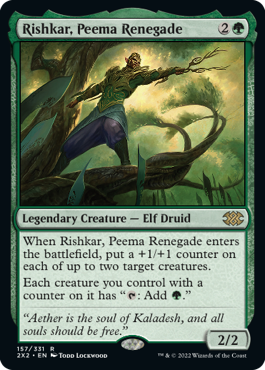
Rishkar, Peema Renegade
{2}{G}
Legendary Creature — Elf Druid
2/2
When Rishkar, Peema Renegade enters the battlefield, put a +1/+1 counter on each of up to two target creatures.
Each creature you control with a counter on it has "{T}: Add {G}."
- Rishkar can be a target of its own triggered ability.
- You can't target the same creature twice to put two +1/+1 counters on it.
- Each creature you control has Rishkar's mana ability as long as that creature has any kind of counter on it. The effect isn't limited to those with +1/+1 counters.
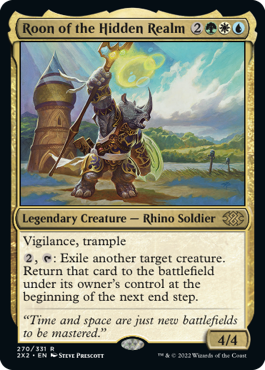
Roon of the Hidden Realm
{2}{G}{W}{U}
Legendary Creature — Rhino Soldier
4/4
Vigilance, trample
{2}, {T}: Exile another target creature. Return that card to the battlefield under its owner's control at the beginning of the next end step.
- If Roon of the Hidden Realm's ability targets a commander, that card's owner may choose to have it go to the command zone after it is exiled. If they do, it will not be returned to the battlefield at the beginning of the next end step.

Scab-Clan Giant
{4}{R}{G}
Creature — Giant Warrior
4/5
When Scab-Clan Giant enters the battlefield, it fights target creature an opponent controls chosen at random.
- To choose a target at random, all legal targets must have an equal chance of being chosen. There are many ways to do this, including assigning each possible legal target a number and rolling a die.
- The target is chosen at random as part of putting the ability on the stack. Players can respond to the ability knowing what the target of the ability is.
- If Scab-Clan Giant leaves the battlefield before its ability resolves, no fight will happen and neither creature will deal damage. Also, if the target creature is an illegal target when the ability tries to resolve, it won't resolve and no fight will happen.
- In a multiplayer game, you don't choose a single opponent at random. Any creature controlled by any of your opponents may be chosen at random.
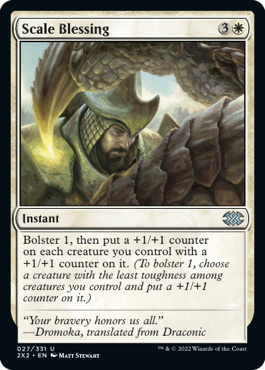
Scale Blessing
{3}{W}
Instant
Bolster 1, then put a +1/+1 counter on each creature you control with a +1/+1 counter on it. (To bolster 1, choose a creature with the least toughness among creatures you control and put a +1/+1 counter on it.)
- Bolster itself doesn't target any creature, though some spells and abilities that bolster may have other effects that target creatures. For example, you could put counters on a creature with protection from white with Aven Tactician's bolster ability.
- You determine which creature to put counters on as the spell or ability that instructs you to bolster resolves. That could be the creature with the bolster ability, if it's still under your control and has the least toughness.
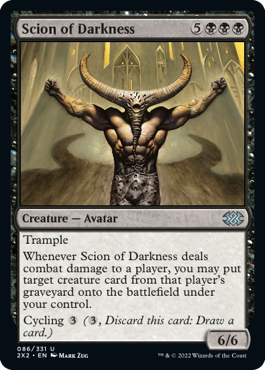
Scion of Darkness
{5}{B}{B}{B}
Creature — Avatar
6/6
Trample
Whenever Scion of Darkness deals combat damage to a player, you may put target creature card from that player's graveyard onto the battlefield under your control.
Cycling {3} ({3}, Discard this card: Draw a card.)
- If Scion of Darkness deals combat damage to a player and simultaneously deals lethal damage to a blocking creature, that blocking creature will be in its owner's graveyard as you select the target for the triggered ability.
- Cycling is an activated ability. Effects that interact with activated abilities (such as Stifle or Rings of Brighthearth) will interact with cycling. Effects that interact with spells (such as Counterspell or Faerie Tauntings) will not.
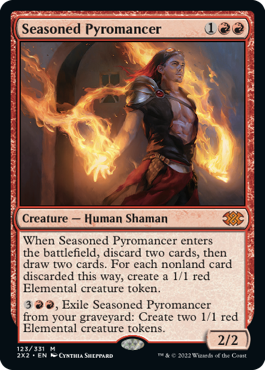
Seasoned Pyromancer
{1}{R}{R}
Creature — Human Shaman
2/2
When Seasoned Pyromancer enters the battlefield, discard two cards, then draw two cards. For each nonland card discarded this way, create a 1/1 red Elemental creature token.
{3}{R}{R}, Exile Seasoned Pyromancer from your graveyard: Create two 1/1 red Elemental creature tokens.
- If you have fewer than two cards in hand as Seasoned Pyromancer's first ability resolves, you'll discard your hand, then draw two cards regardless of how many you discarded.
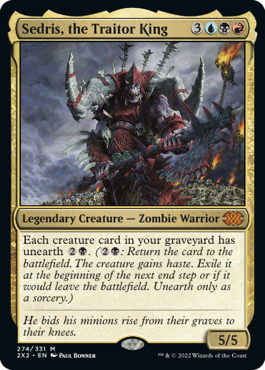
Sedris, the Traitor King
{3}{U}{B}{R}
Legendary Creature — Zombie Warrior
5/5
Each creature card in your graveyard has unearth {2}{B}. ({2}{B}: Return the card to the battlefield. The creature gains haste. Exile it at the beginning of the next end step or if it would leave the battlefield. Unearth only as a sorcery.)
- Despite the appearance of the reminder text, the unearth abilities that Sedris grants are activated abilities of each individual creature card in your graveyard. They're not activated abilities of Sedris.
- Sedris may cause a creature card in your graveyard to have multiple unearth abilities. (For example, a Fatestitcher in your graveyard would have unearth {U} and unearth {2}{B}.) You may activate either of those abilities.
- See also "Returning Keyword Ability: Unearth" in the General Notes section.
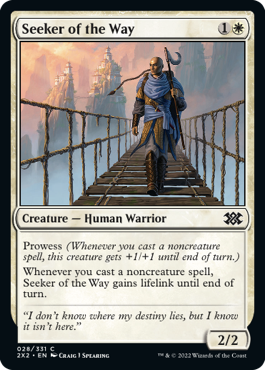
Seeker of the Way
{1}{W}
Creature — Human Warrior
2/2
Prowess (Whenever you cast a noncreature spell, this creature gets +1/+1 until end of turn.)
Whenever you cast a noncreature spell, Seeker of the Way gains lifelink until end of turn.
- Multiple instances of lifelink on the same creature are redundant.
- Casting a noncreature spell will cause both prowess and Seeker of the Way's other ability to trigger. You can put these abilities on the stack in either order. Whichever ability is put on the stack last will resolve first.
- See also "Returning Keyword Ability: Prowess" in the General Notes section.
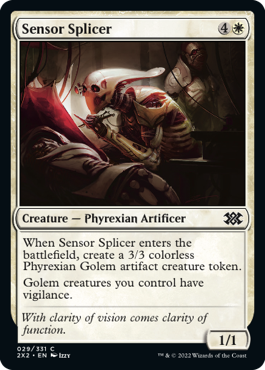
Sensor Splicer
{4}{W}
Creature — Phyrexian Artificer
1/1
When Sensor Splicer enters the battlefield, create a 3/3 colorless Phyrexian Golem artifact creature token.
Golem creatures you control have vigilance.
- Sensor Splicer's last ability applies to all creatures with Golem creature type, not just the Phyrexian Golems that Sensor Splicer's first ability creates.
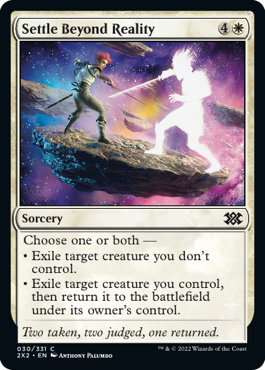
Settle Beyond Reality
{4}{W}
Sorcery
Choose one or both —
• Exile target creature you don't control.
• Exile target creature you control, then return it to the battlefield under its owner's control.
- Once the exiled creature returns, it's considered a new object with no relation to the object that it was. Auras attached to the exiled creature will be put into their owners' graveyards. Equipment attached to the exiled creature will become unattached and remain on the battlefield. Any counters on the exiled creature will cease to exist.
- If a token you control is exiled this way, it will cease to exist and won't return to the battlefield.
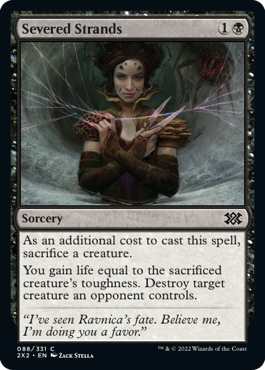
Severed Strands
{1}{B}
Sorcery
As an additional cost to cast this spell, sacrifice a creature.
You gain life equal to the sacrificed creature's toughness. Destroy target creature an opponent controls.
- You must sacrifice exactly one creature to cast this spell; you can't cast it without sacrificing a creature, and you can't sacrifice additional creatures.
- The amount of life gained is equal to the sacrificed creature's toughness as it last existed on the battlefield.
- If the target creature is an illegal target by the time Severed Strands tries to resolve, the spell doesn't resolve. You don't gain life.
- If the target creature is a legal target but can't be destroyed, most likely because it has indestructible, you still gain life.
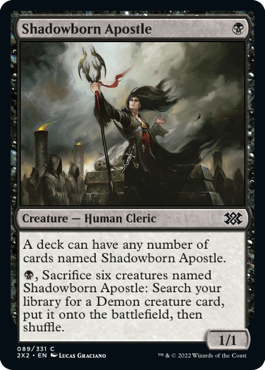
Shadowborn Apostle
{B}
Creature — Human Cleric
1/1
A deck can have any number of cards named Shadowborn Apostle.
{B}, Sacrifice six creatures named Shadowborn Apostle: Search your library for a Demon creature card, put it onto the battlefield, then shuffle.
- Shadowborn Apostle's first ability lets you ignore only the "four-of" rule. It doesn't let you ignore format legality.
- You sacrifice the six creatures when you activate the ability. You can't respond to that ability by activating the ability of one of the other Shadowborn Apostles you just sacrificed.
- You don't have to sacrifice the Shadowborn Apostle whose ability you activated. It can be six other Shadowborn Apostles.
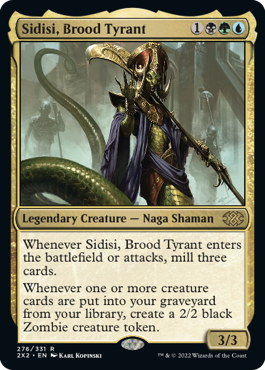
Sidisi, Brood Tyrant
{1}{B}{G}{U}
Legendary Creature — Naga Shaman
3/3
Whenever Sidisi, Brood Tyrant enters the battlefield or attacks, mill three cards.
Whenever one or more creature cards are put into your graveyard from your library, create a 2/2 black Zombie creature token.
- Sidisi's last ability triggers any time creature cards are put into your graveyard from anywhere in your library, not just from the top.
- Any instruction, including Sidisi's first ability, that tells you to put multiple cards from a library into a graveyard moves all the cards at the same time. For example, if Sidisi enters the battlefield and you put three creature cards into your graveyard, Sidisi's last ability will trigger once and you'll put one Zombie token onto the battlefield.
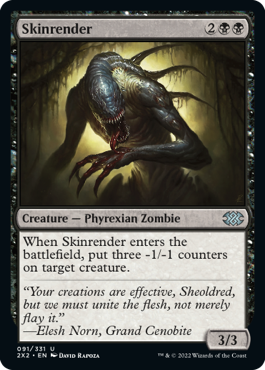
Skinrender
{2}{B}{B}
Creature — Phyrexian Zombie
3/3
When Skinrender enters the battlefield, put three -1/-1 counters on target creature.
- This ability is mandatory. If there are no other creatures on the battlefield, you must target Skinrender itself.
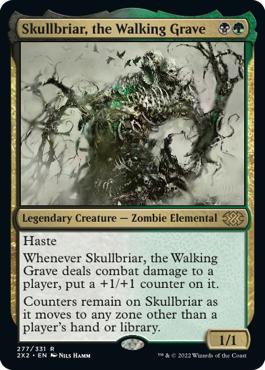
Skullbriar, the Walking Grave
{B}{G}
Legendary Creature — Zombie Elemental
1/1
Haste
Whenever Skullbriar, the Walking Grave deals combat damage to a player, put a +1/+1 counter on it.
Counters remain on Skullbriar as it moves to any zone other than a player's hand or library.
- Skullbriar will get one +1/+1 counter each time it deals combat damage to a player (including you if its combat damage gets redirected), regardless of how much damage is dealt.
- Skullbriar retains all counters, not just +1/+1 counters.
- The counters that remain on Skullbriar as it changes zones aren't "put" on Skullbriar. Effects like Doubling Season's and Melira, Sylvok Outcast's won't affect those counters.
- Counters that adjust power and/or toughness affect Skullbriar's power and/or toughness in zones other than the battlefield. For example, a Skullbriar in the command zone with a +1/+1 counter on it will be 2/2.
- Effects that last "for as long as that creature has a [kind of] counter on it," such as Aven Mimeomancer's, stop applying to Skullbriar once it leaves the battlefield. Even though Skullbriar retains the counters, it becomes a new object with no relation to its last existence in its previous zone.
- Skullbriar's last ability only works if it has that ability in the zone it's moving from. For example, with Yixlid Jailer ("Cards in graveyards lose all abilities") on the battlefield, a Skullbriar with a counter on it in a graveyard loses that counter when it's put onto the battlefield. Conversely, that Skullbriar moving from the graveyard to the battlefield would retain that counter if Humility ("All creatures lose all abilities and are 1/1") were on the battlefield; if Skullbriar then left the battlefield with Humility still on the battlefield, it would lose the counter.
- If a card becomes a copy of Skullbriar, counters will remain on that card when it leaves the battlefield (unless it goes to your hand or library). Once it does so, it stops being a copy of Skullbriar, so those counters will cease to exist when that card next changes zones.
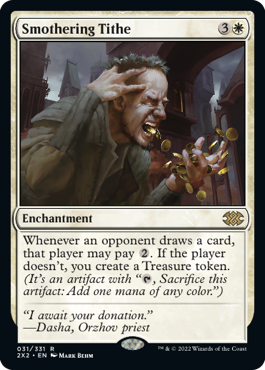
Smothering Tithe
{3}{W}
Enchantment
Whenever an opponent draws a card, that player may pay {2}. If the player doesn't, you create a Treasure token. (It's an artifact with "{T}, Sacrifice this artifact: Add one mana of any color.")
- If an opponent is instructed to draw multiple cards, that player draws all of them before deciding how many times to pay for Smothering Tithe's triggered ability.
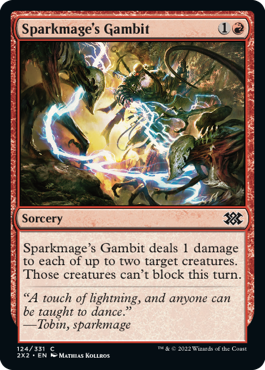
Sparkmage's Gambit
{1}{R}
Sorcery
Sparkmage's Gambit deals 1 damage to each of up to two target creatures. Those creatures can't block this turn.
- If Sparkmage's Gambit has two targets, and one of them is illegal as Sparkmage's Gambit resolves, only the remaining legal target will be affected. The illegal target won't be dealt damage and will be able to block that turn. If both targets are illegal as Sparkmage's Gambit tries to resolve, it won't resolve and none of its effects will happen.
- If Sparkmage's Gambit resolves, but the damage is prevented or redirected, the target creatures still won't be able to block that turn.
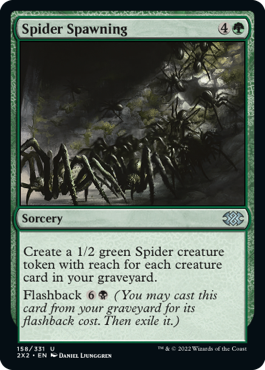
Spider Spawning
{4}{G}
Sorcery
Create a 1/2 green Spider creature token with reach for each creature card in your graveyard.
Flashback {6}{B} (You may cast this card from your graveyard for its flashback cost. Then exile it.)
- The number of creature cards in your graveyard is counted when Spider Spawning resolves.
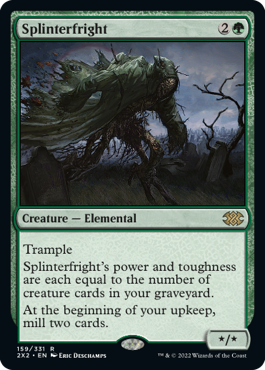
Splinterfright
{2}{G}
Creature — Elemental
*/*
Trample
Splinterfright's power and toughness are each equal to the number of creature cards in your graveyard.
At the beginning of your upkeep, mill two cards.
- The ability that defines Splinterfright's power and toughness works in all zones, not just the battlefield. If Splinterfright is in your graveyard, it will count itself.
- If Splinterfright's controller has only one card in their library, they put that card into their graveyard.
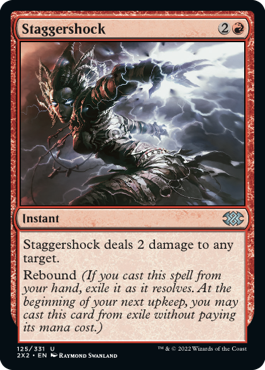
Staggershock
{2}{R}
Instant
Staggershock deals 2 damage to any target.
Rebound (If you cast this spell from your hand, exile it as it resolves. At the beginning of your next upkeep, you may cast this card from exile without paying its mana cost.)
- If a spell with rebound that you cast from your hand doesn't resolve for any reason (due being countered by a spell like Cancel, or because all of its targets are illegal), rebound has no effect. The spell is simply put into your graveyard. You won't get to cast it again next turn.
- If you cast a spell with rebound from anywhere other than your hand (such as from your graveyard due to Sins of the Past, from your library due to cascade, or from your opponent's hand due to Sen Triplets), rebound won't have any effect. If you do cast it from your hand, rebound will work regardless of whether you paid its mana cost (for example, if you cast it from your hand due to Maelstrom Archangel).
- If a replacement effect would cause a spell with rebound that you cast from your hand to be put somewhere else instead of your graveyard (such as Leyline of the Void might), you choose whether to apply the rebound effect or the other effect as the spell resolves.
- Rebound will have no effect on copies of spells because you don't cast them from your hand.
- If you cast a spell with rebound from your hand and it resolves, it isn't put into your graveyard. Rather, it's exiled directly from the stack. Effects that care about cards being put into your graveyard won't do anything.
- At the beginning of your upkeep, all delayed triggered abilities created by rebound effects trigger. You may handle them in any order. If you want to cast a card this way, you do so as part of the resolution of its delayed triggered ability. Timing restrictions based on the card's type (if it's a sorcery) are ignored. Other restrictions are not (such as the one from Rule of Law).
- If you are unable to cast a card from exile this way, or you choose not to, nothing happens when the delayed triggered ability resolves. The card remains exiled for the rest of the game, and you won't get another chance to cast the card. The same is true if the ability is countered (due to Stifle, perhaps).
- If you cast a card from exile this way, it will go to your graveyard when it resolves, fails to resolve, or is countered. It won't go back to exile.
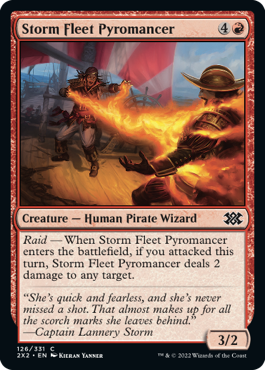
Storm Fleet Pyromancer
{4}{R}
Creature — Human Pirate Wizard
3/2
Raid — When Storm Fleet Pyromancer enters the battlefield, if you attacked this turn, Storm Fleet Pyromancer deals 2 damage to any target.
- Raid abilities care only that you attacked with a creature. It doesn't matter how many creatures you attacked with, or which opponent or planeswalker controlled by an opponent those creatures attacked.
- Raid abilities evaluate the entire turn to see if you attacked with a creature. That creature doesn't have to still be on the battlefield. Similarly, the player or planeswalker it attacked doesn't have to still be in the game or on the battlefield, respectively.
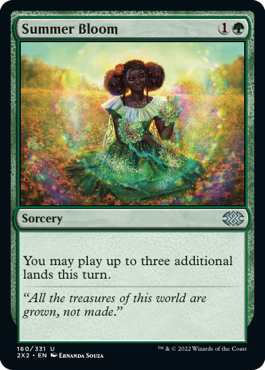
Summer Bloom
{1}{G}
Sorcery
You may play up to three additional lands this turn.
- This spell increases the number of lands you can play in a turn. The land cards are played as you would normally play lands.
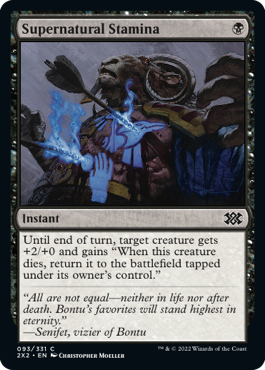
Supernatural Stamina
{B}
Instant
Until end of turn, target creature gets +2/+0 and gains "When this creature dies, return it to the battlefield tapped under its owner's control."
- Supernatural Stamina's effect works only once. If the targeted creature dies and is then returned to the battlefield, it's considered to be a new creature. If that new creature dies, it won't come back a second time.
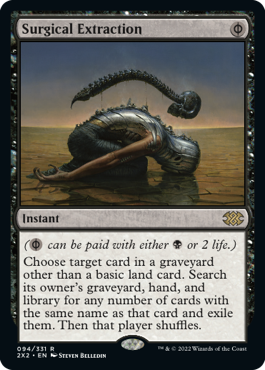
Surgical Extraction
{B/P}
Instant
({B/P} can be paid with either {B} or 2 life.)
Choose target card in a graveyard other than a basic land card. Search its owner's graveyard, hand, and library for any number of cards with the same name as that card and exile them. Then that player shuffles.
- "Any number of cards" means just that. If you wish, you can choose to leave some or all of the cards with the same name as the targeted card, including that card, in the zone they're in.
- A card with Phyrexian mana symbols in its mana cost is each color that appears in that mana cost, regardless of how that cost may have been paid.
- To calculate the mana value of a card with Phyrexian mana symbols in its cost, count each Phyrexian mana symbol as 1.
- As you cast a spell or activate an activated ability with one or more Phyrexian mana symbols in its cost, you choose how to pay for each Phyrexian mana symbol at the same time you would choose modes or choose a value for X.
- If you're at 1 life or less, you can't pay 2 life.
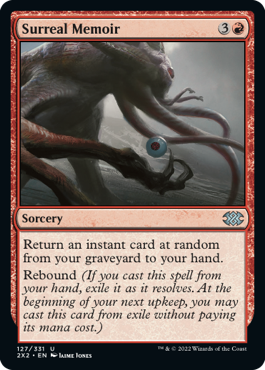
Surreal Memoir
{3}{R}
Sorcery
Return an instant card at random from your graveyard to your hand.
Rebound (If you cast this spell from your hand, exile it as it resolves. At the beginning of your next upkeep, you may cast this card from exile without paying its mana cost.)
- Surreal Memoir isn't targeted. You don't choose an instant card at random from your graveyard until it resolves. Once you randomly select a card, it's too late for players to respond.
- If you have only one instant card in your graveyard as Surreal Memoir resolves, that's the one you'll return to your hand.
- If you're playing a format involving only cards from Double Masters 2022 or from the Urza's Saga set and later, you may change the order of your graveyard at any time. That means the easiest way to choose an instant card at random from your graveyard is to take all the instant cards in your graveyard, turn them face down, shuffle them, and pick a card. Then you just put the rest back.
- If you're playing a format involving cards printed earlier than the Urza's Saga set, you may not reorder your graveyard. In this case, you need to be more careful when selecting an instant card at random, perhaps by using dice, writing the names of the instant cards on slips of paper and choosing one of them randomly, or carefully noting the existing graveyard order so you can reestablish it after performing the method suggested above, for example.
- If you have multiple instant cards in your graveyard with the same name, and one of them is being targeted by another spell on the stack or is enchanted (with Spellweaver Volute, for example), you must differentiate them so you know which one (if any) is chosen at random. In that case, it may be better to use dice or another method that allows you to differentiate between the instant cards to choose one at random.
- All players get to see which card you chose at random.
- If a spell with rebound that you cast from your hand doesn't resolve for any reason (due being countered by a spell like Cancel, or because all of its targets are illegal), rebound has no effect. The spell is simply put into your graveyard. You won't get to cast it again next turn.
- If you cast a spell with rebound from anywhere other than your hand (such as from your graveyard due to Sins of the Past, from your library due to cascade, or from your opponent's hand due to Sen Triplets), rebound won't have any effect. If you do cast it from your hand, rebound will work regardless of whether you paid its mana cost (for example, if you cast it from your hand due to Maelstrom Archangel).
- If a replacement effect would cause a spell with rebound that you cast from your hand to be put somewhere else instead of your graveyard (such as Leyline of the Void might), you choose whether to apply the rebound effect or the other effect as the spell resolves.
- Rebound will have no effect on copies of spells because you don't cast them from your hand.
- If you cast a spell with rebound from your hand and it resolves, it isn't put into your graveyard. Rather, it's exiled directly from the stack. Effects that care about cards being put into your graveyard won't do anything.
- At the beginning of your upkeep, all delayed triggered abilities created by rebound effects trigger. You may handle them in any order. If you want to cast a card this way, you do so as part of the resolution of its delayed triggered ability. Timing restrictions based on the card's type (if it's a sorcery) are ignored. Other restrictions are not (such as the one from Rule of Law).
- If you are unable to cast a card from exile this way, or you choose not to, nothing happens when the delayed triggered ability resolves. The card remains exiled for the rest of the game, and you won't get another chance to cast the card. The same is true if the ability is countered (due to Stifle, perhaps).
- If you cast a card from exile this way, it will go to your graveyard when it resolves, fails to resolve, or is countered. It won't go back to exile.
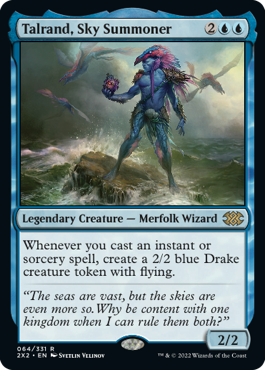
Talrand, Sky Summoner
{2}{U}{U}
Legendary Creature — Merfolk Wizard
2/2
Whenever you cast an instant or sorcery spell, create a 2/2 blue Drake creature token with flying.
- An ability that triggers when a player casts a spell resolves before the spell that caused it to trigger, but after targets have been chosen for that spell. It resolves even if that spell is countered.
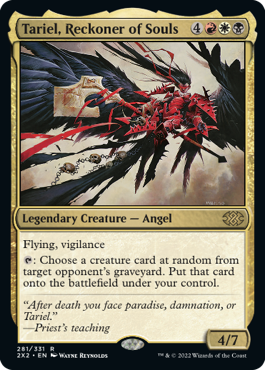
Tariel, Reckoner of Souls
{4}{R}{W}{B}
Legendary Creature — Angel
4/7
Flying, vigilance
{T}: Choose a creature card at random from target opponent's graveyard. Put that card onto the battlefield under your control.
- The only target of the activated ability is the opponent. The creature card is chosen at random from among creature cards in that opponent's graveyard as the ability resolves. Players can respond to the ability knowing the targeted opponent, but they won't know which creature card is about to enter the battlefield.
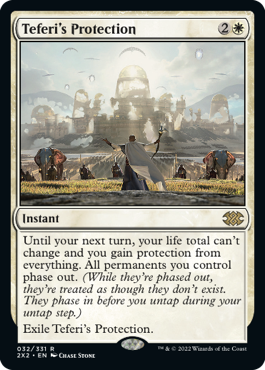
Teferi's Protection
{2}{W}
Instant
Until your next turn, your life total can't change and you gain protection from everything. All permanents you control phase out. (While they're phased out, they're treated as though they don't exist. They phase in before you untap during your untap step.)
Exile Teferi's Protection.
- If a player has protection from everything, it means three things: 1) All damage that would be dealt to that player is prevented. 2) Auras can't be attached to that player. 3) That player can't be the target of spells or abilities.
- Nothing other than the specified events are prevented or illegal. An effect that doesn't target you could still cause you to discard cards, for example. Creatures can still attack you while you have protection from everything, although combat damage that they would deal to you will be prevented.
- Gaining protection from everything causes a spell or ability on the stack to have an illegal target if it targets you. As a spell or ability tries to resolve, if all its targets are illegal, that spell or ability doesn't resolve and none of its effects happen, including effects unrelated to the target. If at least one target is still legal, the spell or ability does as much as it can to the remaining legal targets, and its other effects still happen.
- Spells and abilities that would normally cause you to gain or lose life still resolve while your life total can't change, but the life-gain or life-loss part simply has no effect.
- Protection from everything will usually prevent damage if it would be dealt to you, but some damage can't be prevented. In this case, because your life total also can't change, that damage has any other effects that it may have aside from causing you to lose that much life (such as effects from lifelink or infect) and triggers and effects can see that damage was dealt even though your life total didn't change.
- You can't pay a cost that includes the payment of any amount of life other than 0 life.
- If a cost includes causing you to gain life (like the alternative cost of an opponent's Invigorate does), that cost can't be paid.
- Effects that would replace having you gain life with some other event won't be able to be applied because it's impossible for you to gain life. The same is true for effects that would replace having you lose life with some other event.
- Effects that replace an event with having you gain life (like Words of Worship's effect does) or having you lose life will apply and end up replacing the event with nothing.
- If an effect would set your life total to a certain number that's different than your current life total, that part of the effect won't do anything.
- If an effect would cause you to exchange life totals with another player, the exchange won't happen. Neither player's life total changes.
- While a permanent is phased out, it's treated as though it doesn't exist. It can't be the target of spells or abilities, its static abilities have no effect on the game, its triggered abilities can't trigger, it can't attack or block, and so on.
- Phasing out doesn't cause any "leaves the battlefield" abilities to trigger. Similarly, phasing in won't cause any "enters the battlefield" abilities to trigger.
- Any one-shot effects that are waiting "until [this] leaves the battlefield," such as that of Banishing Light, won't happen when a permanent phases out.
- Any continuous effects with a "for as long as" duration such as that of Mathas, Fiend Seeker ignore phased-out objects. Any such effects will expire if their conditions are no longer met after ignoring the phased-out objects.
- Each Aura and Equipment that phases out attached to a permanent that's phasing out phases in with that permanent and still attached to it.
- Each Aura and Equipment you control that phased out attached to a permanent that didn't phase out phases in attached to that permanent if it can still be attached to that permanent. If not, it phases in unattached. An Aura that phases in unattached will be put into its owner's graveyard as a state-based action. The same is true with Auras attached to players.
- Permanents that phase out with counters phase in with those counters.
- Choices made for permanents as they entered the battlefield are remembered when they phase in.
- If a token is phased out, it will phase in as your next untap step begins.
- A permanent phasing out causes a spell or ability on the stack to have an illegal target if it targets that permanent. As a spell or ability tries to resolve, if all its targets are illegal, that spell or ability doesn't resolve and none of its effects happen, including effects unrelated to the target. If at least one target is still legal, the spell or ability does as much as it can to the remaining legal targets, and its other effects still happen.
- If your untap step is somehow skipped as your next turn begins, your phased-out permanents won't phase in until the next untap step you actually have, but you'll no longer have protection from everything and your life total can change again.
- Any creatures that phase in under your control as your next untap step begins will be able to attack and pay a cost of {T} during that turn.
- If you gain control of another player's permanent and it phases out, if the duration of the control-change effect expires before it phases in, that permanent phases in under that other player's control as your next untap step begins. If you leave the game before your next untap step, it phases in as the next untap step begins after your turn would have begun.
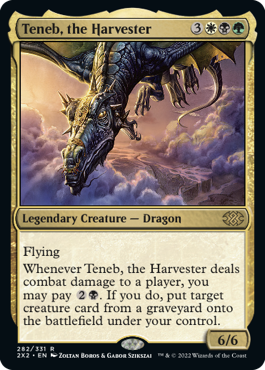
Teneb, the Harvester
{3}{W}{B}{G}
Legendary Creature — Dragon
6/6
Flying
Whenever Teneb, the Harvester deals combat damage to a player, you may pay {2}{B}. If you do, put target creature card from a graveyard onto the battlefield under your control.
- You choose the target when the ability is put on the stack, and you choose whether to pay when it resolves.
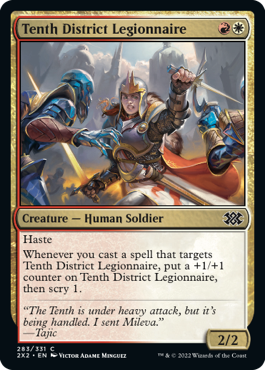
Tenth District Legionnaire
{R}{W}
Creature — Human Soldier
2/2
Haste
Whenever you cast a spell that targets Tenth District Legionnaire, put a +1/+1 counter on Tenth District Legionnaire, then scry 1.
- Tenth District Legionnaire's ability resolves before the spell that caused it to trigger. It resolves even if that spell is countered.
- You scry 1 even if you can't put a +1/+1 counter on Tenth District Legionnaire, most likely because it has left the battlefield.
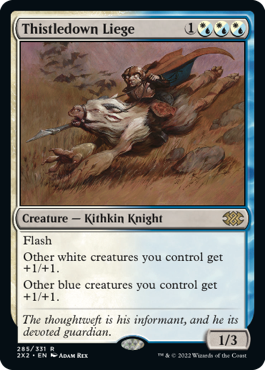
Thistledown Liege
{1}{W/U}{W/U}{W/U}
Creature — Kithkin Knight
1/3
Flash
Other white creatures you control get +1/+1.
Other blue creatures you control get +1/+1.
- The last two abilities are separate and cumulative. If another creature you control is both of the listed colors, it will get a total of +2/+2.
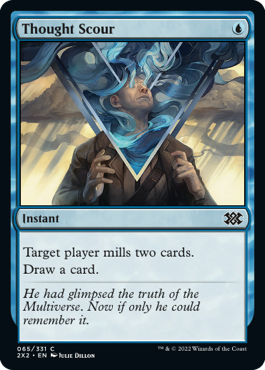
Thought Scour
{U}
Instant
Target player mills two cards.
Draw a card.
- If the target player is an illegal target when Thought Scour tries to resolve, it won't resolve and none of its effects will happen. You won't draw a card.
- Follow the instructions in the order listed on the card: if you target yourself, you'll put the top two cards of your library into your graveyard and then draw a card.
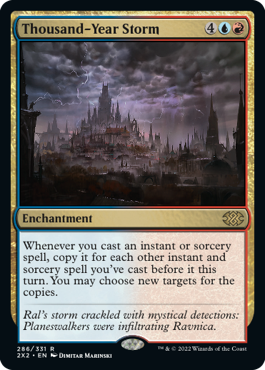
Thousand-Year Storm
{4}{U}{R}
Enchantment
Whenever you cast an instant or sorcery spell, copy it for each other instant and sorcery spell you've cast before it this turn. You may choose new targets for the copies.
- Spells you've cast that were countered were still cast, and so will add copies when Thousand-Year Storm's ability resolves for later spells in the turn.
- Thousand-Year Storm's ability will copy any instant or sorcery spell, not just one with targets.
- Copies are created even if the spell that caused Thousand-Year Storm's ability to trigger has been countered by the time that ability resolves. The copies resolve before the original spell.
- The copies will have the same targets as the spell they're copying unless you choose new ones. You may change any number of the targets, including all of them or none of them. The new targets must be legal.
- If the spell that's copied is modal (that is, it says "Choose one —" or the like), the copies will have the same mode or modes. You can't choose different ones.
- If the spell that's copied has an X whose value was determined as it was cast, the copies will have the same value of X.
- If the spell has damage divided as it was cast, the division can't be changed (although the targets receiving that damage still can). The same is true of spells that distribute counters.
- You can't choose to pay any additional costs for the copies. However, effects based on any additional costs that were paid for the original spell are copied as though those same costs were paid for the copy too.
- The copies that Thousand-Year Storm's ability creates are created on the stack, so they're not "cast." Abilities that trigger when a player casts a spell (such as that of Thousand-Year Storm itself) won't trigger.
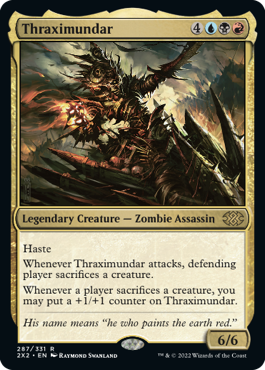
Thraximundar
{4}{U}{B}{R}
Legendary Creature — Zombie Assassin
6/6
Haste
Whenever Thraximundar attacks, defending player sacrifices a creature.
Whenever a player sacrifices a creature, you may put a +1/+1 counter on Thraximundar.
- Thraximundar's middle ability resolves during the declare attackers step. The defending player sacrifices a creature before it would get a chance to block.
- Thraximundar's last ability triggers whenever any player (including you) sacrifices a creature for any reason. It doesn't trigger only when a creature is sacrificed due to its middle ability. Note that Thraximundar itself doesn't allow you to sacrifice any creatures.
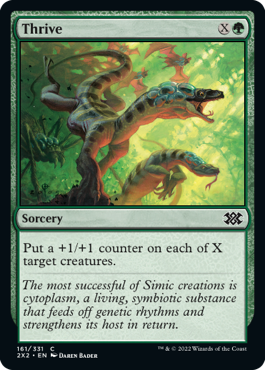
Thrive
{X}{G}
Sorcery
Put a +1/+1 counter on each of X target creatures.
- Thrive can't target the same creature more than once. You can't give more than one +1/+1 counter to a creature with this spell.
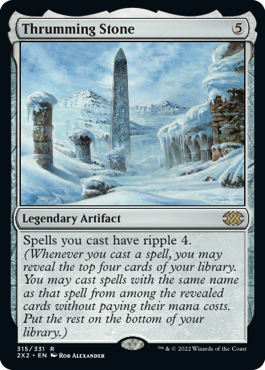
Thrumming Stone
{5}
Legendary Artifact
Spells you cast have ripple 4. (Whenever you cast a spell, you may reveal the top four cards of your library. You may cast spells with the same name as that spell from among the revealed cards without paying their mana costs. Put the rest on the bottom of your library.)
- If you cast a spell that already has ripple (such as Surging Flame, which has ripple 4) while Thrumming Stone is on the battlefield, both ripple abilities will trigger separately. Assuming you choose to do all "you may" actions, when the first instance of ripple resolves, you reveal the top four cards of your library, cast all Surging Flames, and put the rest of the cards on the bottom of your library. Any new Surging Flames are on the stack on top of the other instance of ripple, so they'll resolve next. Each of them also has two instances of ripple, which trigger separately, and the process continues until the ripple abilities don't reveal any Surging Flames.
- If you cast half of a split card (for example, Hit) and reveal another one of those split cards when the ripple ability resolves (for example, Hit // Run), you may cast either half of that split card (Hit or Run) without paying its mana cost.
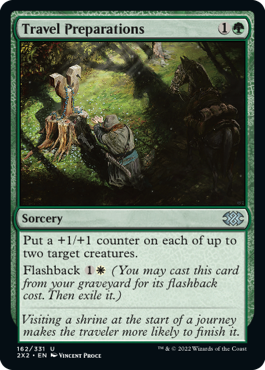
Travel Preparations
{1}{G}
Sorcery
Put a +1/+1 counter on each of up to two target creatures.
Flashback {1}{W} (You may cast this card from your graveyard for its flashback cost. Then exile it.)
- You can't target the same creature twice to put two +1/+1 counters on it.
- If Travel Preparations targets two creatures, and one of them is an illegal target by the time Travel Preparations resolves, you'll still put a +1/+1 counter on the other creature.
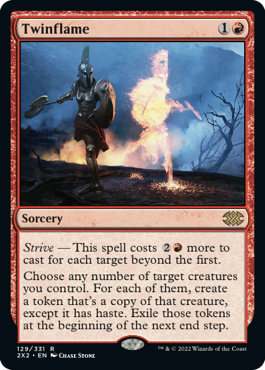
Twinflame
{1}{R}
Sorcery
Strive — This spell costs {2}{R} more to cast for each target beyond the first.
Choose any number of target creatures you control. For each of them, create a token that's a copy of that creature, except it has haste. Exile those tokens at the beginning of the next end step.
- The tokens copy exactly what was printed on the original creature and nothing else (unless that permanent is copying something else or is a token; see below). It doesn't copy whether that creature is tapped or untapped, whether it has any counters on it or Auras and Equipment attached to it, or any non-copy effects that have changed its power, toughness, types, color, and so on.
- If the copied creature has {X} in its mana cost, X is considered to be 0.
- If the copied creature is copying something else (for example, if the copied creature is a Clone), then the token enters the battlefield as whatever that creature copied.
- If the copied creature is a token, the token created by Twinflame copies the original characteristics of that token as stated by the effect that put that token onto the battlefield.
- Any enters-the-battlefield abilities of the copied creature will trigger when the token enters the battlefield. Any "as [this permanent] enters the battlefield" or "[this permanent] enters the battlefield with" abilities of the copied creature will also work.
- The tokens see each other enter the battlefield. If any of them have a triggered ability that triggers whenever a creature enters the battlefield, they'll trigger for one another.
- If another creature becomes or enters the battlefield as a copy of the token, that creature will have haste, but you won't exile it. However, if Twinflame creates multiple tokens copying a single creature due to a replacement effect (like the one Doubling Season creates), you'll exile each of them.
- You choose how many targets each spell with a strive ability has and what those targets are as you cast it. It's legal to cast such a spell with no targets, although this is rarely a good idea. You can't choose the same target more than once for a single strive spell.
- The mana cost and mana value of strive spells don't change no matter how many targets they have. Strive abilities affect only what you pay.
- If all of the spell's targets are illegal when the spell tries to resolve, it won't resolve and none of its effects will happen. If one or more of its targets are legal when it tries to resolve, the spell will resolve and affect only those legal targets. It will have no effect on any illegal targets.
- If such a spell is copied, and the effect that copies the spell allows a player to choose new targets for the copy, the number of targets can't be changed. The player may change any number of the targets, including all of them or none of them. If, for one of the targets, the player can't choose a new legal target, then it remains unchanged (even if the current target is illegal).
- If a spell or ability allows you to cast a strive spell without paying its mana cost, you must pay the additional costs for any targets beyond the first.
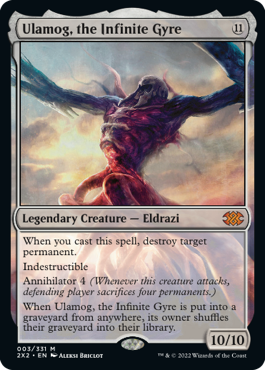
Ulamog, the Infinite Gyre
{11}
Legendary Creature — Eldrazi
10/10
When you cast this spell, destroy target permanent.
Indestructible
Annihilator 4 (Whenever this creature attacks, defending player sacrifices four permanents.)
When Ulamog, the Infinite Gyre is put into a graveyard from anywhere, its owner shuffles their graveyard into their library.
- Ulamog's ability triggers as you cast it, and that ability resolves before the spell itself. It resolves even if that spell is countered.
- Annihilator abilities trigger and resolve during the declare attackers step. The defending player chooses and sacrifices the required number of permanents before they declare blockers. Any creatures sacrificed this way won't be able to block.
- If a creature with annihilator is attacking a planeswalker, and the defending player chooses to sacrifice that planeswalker, the attacking creature continues to attack. It may be blocked. If it isn't blocked, it simply won't deal combat damage to anything.
- Lethal damage and effects that say "destroy" won't cause a creature with indestructible to be put into the graveyard. However, a creature with indestructible can be put into the graveyard for a number of reasons. The most likely reasons are if it's sacrificed, if it's legendary and another legendary creature with the same name is controlled by the same player, or if its toughness is 0 or less.
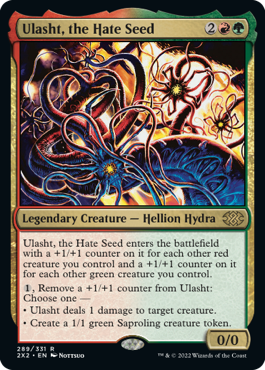
Ulasht, the Hate Seed
{2}{R}{G}
Legendary Creature — Hellion Hydra
0/0
Ulasht, the Hate Seed enters the battlefield with a +1/+1 counter on it for each other red creature you control and a +1/+1 counter on it for each other green creature you control.
{1}, Remove a +1/+1 counter from Ulasht: Choose one —
• Ulasht deals 1 damage to target creature.
• Create a 1/1 green Saproling creature token.
- Creatures that are both red and green provide two +1/+1 counters.
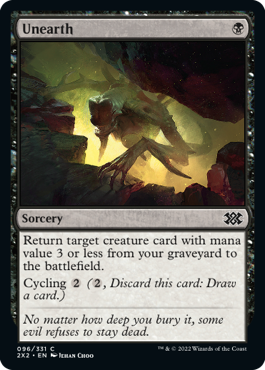
Unearth
{B}
Sorcery
Return target creature card with mana value 3 or less from your graveyard to the battlefield.
Cycling {2} ({2}, Discard this card: Draw a card.)
- Cycling is an activated ability. Effects that interact with activated abilities (such as Stifle or Rings of Brighthearth) will interact with cycling. Effects that interact with spells (such as Counterspell or Faerie Tauntings) will not.
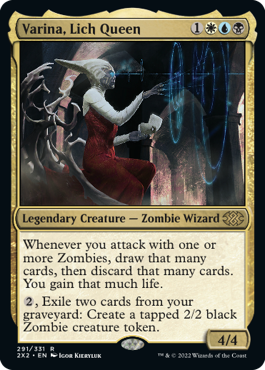
Varina, Lich Queen
{1}{W}{U}{B}
Legendary Creature — Zombie Wizard
4/4
Whenever you attack with one or more Zombies, draw that many cards, then discard that many cards. You gain that much life.
{2}, Exile two cards from your graveyard: Create a tapped 2/2 black Zombie creature token.
- Varina's first ability counts the number of Zombies you attacked with, even if some of those Zombies leave combat before the triggered ability resolves.
- The number of cards you discard and the amount of life you gain are both equal to the number of Zombies you attack with, even if you draw a different number of cards somehow.
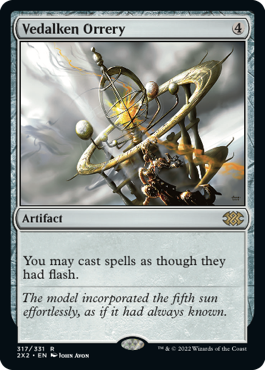
Vedalken Orrery
{4}
Artifact
You may cast spells as though they had flash.
- The controller of Vedalken Orrery can cast nonland artifact, creature, enchantment, planeswalker, and sorcery cards any time they could cast an instant. This includes on other players' turns and during the upkeep step, draw step, combat phase, and end step.
- This applies only to casting spells. It does not, for example, change when you may activate abilities that can only be activated "as sorcery".
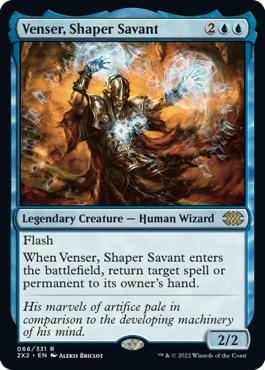
Venser, Shaper Savant
{2}{U}{U}
Legendary Creature — Human Wizard
2/2
Flash
When Venser, Shaper Savant enters the battlefield, return target spell or permanent to its owner's hand.
- If Venser's triggered ability targets a spell cast with flashback, that spell will be exiled instead of returning to its owner's hand.
- If a spell is returned to its owner's hand, it's removed from the stack and thus will not resolve. The spell isn't countered; it just no longer exists. This works even against a spell that can't be countered.
- If a copy of a spell is returned to its owner's hand, it's moved there, then it will cease to exist as a state-based action. It can't be recast.
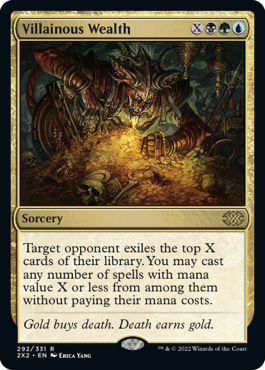
Villainous Wealth
{X}{B}{G}{U}
Sorcery
Target opponent exiles the top X cards of their library. You may cast any number of spells with mana value X or less from among them without paying their mana costs.
- You cast the spells one at a time as Villainous Wealth is resolving, choosing modes, targets, and so on. The last spell you cast will be the first one to resolve. Ignore timing restrictions based on the cards' types. Other timing restrictions, such as "Cast this spell only during combat," must be followed.
- Because you're already casting the cards using an alternative cost (by casting them without paying their mana costs), you can't pay any other alternative costs for the cards, including casting them face down using the morph ability. You can pay additional costs, such as kicker costs. If the cards have any mandatory additional costs, you must pay those.
- If a card has {X} in its mana cost, you must choose 0 as the value for X when casting it.
- Any cards you don't cast this way will remain in exile.
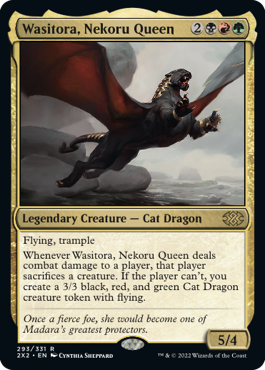
Wasitora, Nekoru Queen
{2}{B}{R}{G}
Legendary Creature — Cat Dragon
5/4
Flying, trample
Whenever Wasitora, Nekoru Queen deals combat damage to a player, that player sacrifices a creature. If the player can't, you create a 3/3 black, red, and green Cat Dragon creature token with flying.
- If a creature is dealt lethal combat damage at the same time that Wasitora deals combat damage to that creature's controller, that creature will be destroyed before that player chooses a creature to sacrifice.
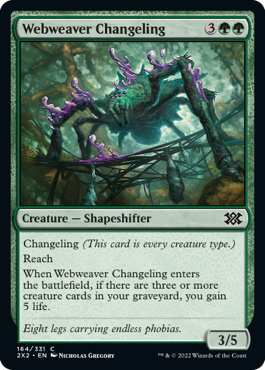
Webweaver Changeling
{3}{G}{G}
Creature — Shapeshifter
3/5
Changeling (This card is every creature type.)
Reach
When Webweaver Changeling enters the battlefield, if there are three or more creature cards in your graveyard, you gain 5 life.
- If there aren't three or more creature cards in your graveyard as Webweaver Changeling enters the battlefield, its ability doesn't trigger at all. If there aren't three or more creature cards in your graveyard as the ability resolves, you don't gain 5 life. These don't have the be same creature cards at both times.
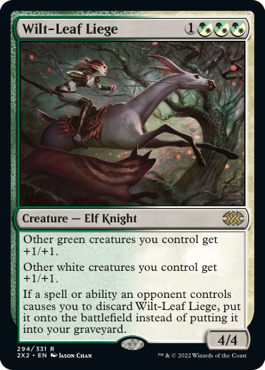
Wilt-Leaf Liege
{1}{G/W}{G/W}{G/W}
Creature — Elf Knight
4/4
Other green creatures you control get +1/+1.
Other white creatures you control get +1/+1.
If a spell or ability an opponent controls causes you to discard Wilt-Leaf Liege, put it onto the battlefield instead of putting it into your graveyard.
- The first two abilities are separate and cumulative. If another creature you control is both of the listed colors, it will get a total of +2/+2.
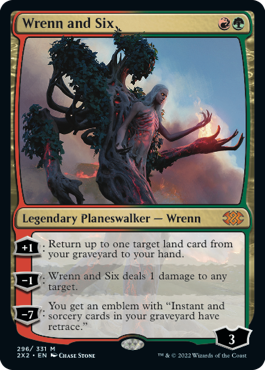
Wrenn and Six
{R}{G}
Legendary Planeswalker — Wrenn
3
+1: Return up to one target land card from your graveyard to your hand.
−1: Wrenn and Six deals 1 damage to any target.
−7: You get an emblem with "Instant and sorcery cards in your graveyard have retrace."
- "Retrace" means "You may cast this card from your graveyard by discarding a land card as an additional cost to cast it."
- When a spell you cast with retrace resolves or is countered, it's put back into your graveyard. You may use the retrace ability to cast it again.
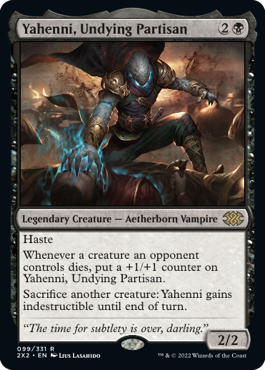
Yahenni, Undying Partisan
{2}{B}
Legendary Creature — Aetherborn Vampire
2/2
Haste
Whenever a creature an opponent controls dies, put a +1/+1 counter on Yahenni, Undying Partisan.
Sacrifice another creature: Yahenni gains indestructible until end of turn.
- If Yahenni and a creature an opponent controls die simultaneously (perhaps because they fought or were in combat together), Yahenni won't be on the battlefield as its triggered ability resolves. It can't be saved by the +1/+1 counter that would have been put on it.
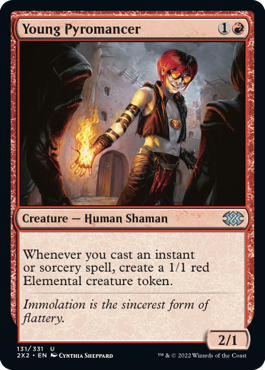
Young Pyromancer
{1}{R}
Creature — Human Shaman
2/1
Whenever you cast an instant or sorcery spell, create a 1/1 red Elemental creature token.
- An ability that triggers when a player casts a spell resolves before the spell that caused it to trigger, but after targets have been chosen for that spell. It resolves even if that spell is countered.
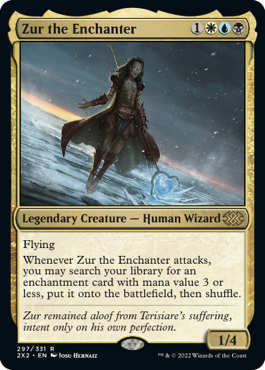
Zur the Enchanter
{1}{W}{U}{B}
Legendary Creature — Human Wizard
1/4
Flying
Whenever Zur the Enchanter attacks, you may search your library for an enchantment card with mana value 3 or less, put it onto the battlefield, then shuffle.
- If you put an Aura onto the battlefield without being cast, you choose what it will enchant as it enters the battlefield. An Aura put onto the battlefield this way doesn't target anything (so it could be attached to an opponent's permanent with hexproof, for example), but the Aura's enchant ability restricts what it can be attached to. If the Aura can't legally be attached to anything, it remains in your library.
Magic: The Gathering, Magic, Urza's Saga, and Khans of Tarkir are trademarks of Wizards of the Coast LLC in the USA and other countries. ©2022 Wizards.
